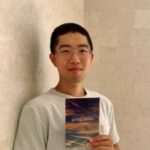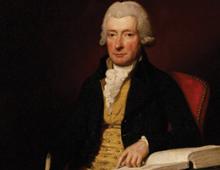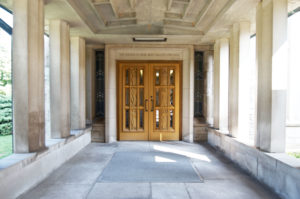 Poems for Ephesians is a journal of poetry that leaps out of the images, ideas and inspirations of the Book of Ephesians. These poems, which are the expressions of the poets themselves, do not necessarily reflect the views of McMaster Divinity College. This web-journal is an on-going project presented by D.S. Martin, MDC’s Poet-in-Residence: (martid17@mcmaster.ca).
Poems for Ephesians is a journal of poetry that leaps out of the images, ideas and inspirations of the Book of Ephesians. These poems, which are the expressions of the poets themselves, do not necessarily reflect the views of McMaster Divinity College. This web-journal is an on-going project presented by D.S. Martin, MDC’s Poet-in-Residence: (martid17@mcmaster.ca).
New posts appear on Wednesdays.
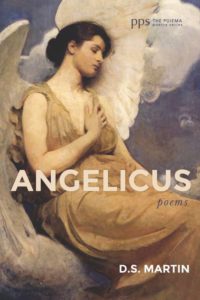 D.S. Martin is the Series Editor for the Poiema Poetry Series from Cascade Books. His most-recent book of poetry, Angelicus (2021), consists of poems written from the point-of-view of angels. Follow these links to his website www.dsmartin.ca and to Kingdom Poets his online resource of Christian poetry.
D.S. Martin is the Series Editor for the Poiema Poetry Series from Cascade Books. His most-recent book of poetry, Angelicus (2021), consists of poems written from the point-of-view of angels. Follow these links to his website www.dsmartin.ca and to Kingdom Poets his online resource of Christian poetry.
-
Abrahamic by Jordan Hilger
Abrahamic
I was born in the twilight of your waiting, a numb heart
nicked by the stone knife of your homesick
wrestling, clutching for a way back,
haunted down every close and sunbleached alley
by the desiderium, the hidden face
after which your history yearns. Amid a people
returning like doves to an off-white city pendent
on the edge of trust, all my conscious powers of
resistance failed suddenly, even my clenched fist
in the shower, the bared skin I thought the ward of
authenticity no god could brook.
Graffiti on an electrical box transparently declared, I miss you,
the amaranthine spray paint of an unmistakable witness.Mountains crested, gathered strength
as I walked to the border with all I had
slung over my shoulders, newly bereft of David’s
mother tongue lyrics (the guards had taken my book),
those cries from between cave walls: Let me bear the reproach,
and let that be my honor. The desert sky ramified
prismatic as an iris, and I lifted up my voice and wept on the rooftop,
muezzin of a long-sought promise, citizen and son
————————–of an undreamt country. Jordan Hilger is a New Jersey poet. His poem “Abrahamic” came through readings of Ephesians 2:11-3:21, the mystery of Gentile inclusion in “the commonwealth of Israel” (2:12), but also draws from Abraham’s search by faith for a lasting country in Hebrews 11:8-16. He would particularly have us focus on Ephesians 2:19 —”Now, therefore, you are no longer strangers and foreigners, but fellow citizens with the saints and members of the household of God.” (NKJV)
Jordan Hilger is a New Jersey poet. His poem “Abrahamic” came through readings of Ephesians 2:11-3:21, the mystery of Gentile inclusion in “the commonwealth of Israel” (2:12), but also draws from Abraham’s search by faith for a lasting country in Hebrews 11:8-16. He would particularly have us focus on Ephesians 2:19 —”Now, therefore, you are no longer strangers and foreigners, but fellow citizens with the saints and members of the household of God.” (NKJV)Posted: 17 April 2024
-
An Essay on Man by Alexander Pope
from An Essay on Man (III)
———-Heaven from all creatures hides the book of fate,
All but the page prescribed, their present state:
From brutes what men, from men what spirits know:
Or who could suffer being here below?
The lamb thy riot dooms to bleed today,
Had he thy reason, would he skip and play?
Pleased to the last, he crops the flowery food,
And licks the hand just raised to shed his blood.
Oh blindness to the future! kindly given,
That each may fill the circle marked by Heav’n:
Who sees with equal eye, as God of all,
A hero perish, or a sparrow fall,
Atoms or systems into ruin hurled,
And now a bubble burst, and now a world.
———-Hope humbly then; with trembling pinions soar;
Wait the great teacher Death; and God adore!
What future bliss, he gives not thee to know,
But gives that hope to be thy blessing now.
Hope springs eternal in the human breast:
Man never is, but always to be blest:
The soul, uneasy and confined from home,
Rests and expatiates in a life to come. Alexander Pope (1688—1744) wrote his philosophical poem, An Essay on Man (1733) about the nature of the universe and man’s place in it, to — like Milton — “vindicate the ways of God to man…” This section on hope, partners well with Ephesians 1:12, 1:18, 2:12, and 4:4.
Alexander Pope (1688—1744) wrote his philosophical poem, An Essay on Man (1733) about the nature of the universe and man’s place in it, to — like Milton — “vindicate the ways of God to man…” This section on hope, partners well with Ephesians 1:12, 1:18, 2:12, and 4:4.Posted: 03 April 2024
-
Hymn XI by Marc Di Saverio
Hymn XI
O Three-Personned God,
I unconditionally surrender from this world;
I unconditionally surrender to your rule.
I come to you as naked as a newly born;
I come to you as helpless as a newly born;
I pray you may help armour me
Against the demons attacking me.
O let my own desires be replaced by yours alone;
O let my own desires be as empty as your tomb!
O I now blind some demons with their
own reflections beaming from my breast-plate!
O I have long had foot-soles of wind,
but now my feet are fitted in
a readiness that’s tempoed by
the gospel of peace, so
no fiends can catch hold of me.
O thank you for my water-shield of faith,
Which snuffs the flaming arrows of my foes.
O thank you for this helmet of Salvation,
which force-fields ears from darkly seductions.
O thank you for the sword of the Spirit
I swing when speaking or singing the Word;
the demons can’t bare the verses and chapters.
I pray in the Spirit upon all occasions;
I pray for your children who live on this earth.
O now I sleep with ease inside the bed of my
surrendering. O now I keenly pray inside
the chapel of my fealty. O now I’ll never
unshield myself of the armour you’ve imparted me.AMEN
 Marc Di Saverio is an Ontario poet, living in Hamilton. His books include Sanatorium Songs (2013, Palimpsest Press) Crito di Volta (2020, Guernica Editions) and Songs of My Surrenders (2023) also from Guernica. Hymn XI embraces Paul’s images from Ephesians 6:10-18.
Marc Di Saverio is an Ontario poet, living in Hamilton. His books include Sanatorium Songs (2013, Palimpsest Press) Crito di Volta (2020, Guernica Editions) and Songs of My Surrenders (2023) also from Guernica. Hymn XI embraces Paul’s images from Ephesians 6:10-18.Posted: 20 March 2024
-
Dianoia by Matthew Pullar
Dianoia
That the eyes of your understanding may be lightened, that ye may know what the hope is of his calling, and what the riches of his glorious inheritance is in the Saints…
(Ephesians 1:18, Geneva Bible)Before dinner my children play
“Pretend Church”, a wild
and varied game consisting
of dress-ups, piano presets and snatches
of half-remembered liturgy,
improvised worship songs with
key phrases scattered like
a jazz singer’s scats: mighty!
Saviour! Lord Jesus Christ!
Faith at first is part
instinct, part performance,
an improvised trying-on-for-size, or
a toddler testing out a new dress-up kit.
But then – as mind enlarges to make
space for growing truth,
no longer an act; the words become
not performative, more like breath,like the way,
as a college student, I devoured Ephesians,
absorbing Pauline clauses highlighter in hand
inhaling every verb and adverb as though
mind atrophied without it. This is you,
it said. Now live. Decades gone,
faith sometimes worn rice-paper-thin,
while my children dance I take
my old study Bible from the shelf and leaf
its weathered, underlined pages. Welcome
to church! my youngest shouts. Welcome.
May the eyes of my heart be enlightened;
may You highlight new life again.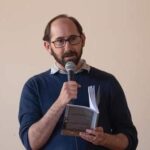 Matthew Pullar is the author of three books of poetry, including The Swelling Year, a sequence of poems for the church year. He is the 2013 winner of the Young Australian Christian Writer of the Year for his unpublished manuscript, Imperceptible Arms: A Memoir in Poems.
Matthew Pullar is the author of three books of poetry, including The Swelling Year, a sequence of poems for the church year. He is the 2013 winner of the Young Australian Christian Writer of the Year for his unpublished manuscript, Imperceptible Arms: A Memoir in Poems.Posted: 06 March 2024
-
The Year Ash Wednesday Fell on Saint Valentine’s Day by Desmond Kon
The Year Ash Wednesday Fell on Saint Valentine’s Day
Lord, you know everything; you know that I love you.
This is at the end of the two-page document they gave me years ago.
It’s placed after the Act of Contrition. It can be used too, said too.
It seems more comforting, but less interrogative of all my misgivings,
all that needs washing away.I told the priest my godfather suggested weekly confession.
That’s been his lifelong practice—I say practice; you say discipline,
some say habit. [Lifelong since he made the decision to join The Work.]
I told the priest that confession is palpably healing for me,
and Mass after becomes so much lighter, brighter.+
“Lord, you know everything; you know that I love you.”
When I say this, I like the feeling—
————————–of first deciding to say it,
————————–then the feeling of saying it,
——————————————————–having said it,
————————–the feeling that comes after.+
Saint Peter was sad that Jesus had to ask the question three times.
Simon, son of John, do you love me?
Saint Peter must have remembered the threefold denial.
Just as the crow reminded him. Did he willingly make those denials,
with full awareness of his decision? Even with Jesus letting him know,
the prophecy already revealed? Does one recognize a prophecy as it
unpeels its moment, or does the realization only happen after the fact?As plainly said as a matter of fact.
——————————————–An afterthought,
——————————————–like I keep saying these days.+
[[[[[[[ How culpable is our culpability? ]]]]]]]
+
“Please remember—”
“Bring us the palms you’ve kept all year—”
“This is what Ash Wednesday looks like—”
“This is what Saint Valentine’s Day looks like this year—”
“No meat, no dispensation from fasting—”
“I’ll imagine Saint Valentine’s relics in Dublin and Rome—”
+
[The priest at The Work said we crucify Christ still, to this day.]
[That’s why we cry “Crucify, Crucify, Crucify” in the Passion Play.]I avoid saying it,
even for the iterative drama, the enactment.————————–Some say it once,
——————————————-then stop,
————————–as if in sudden realization
————————–of what it means.+
“This is what Ash Wednesday looks like on Saint Valentine’s—”
“People walking around with ash on their foreheads—”
“Ours so well-drawn, pressed deep into skin, as if inscribed—”
“It’s like ink on skin, this heavy black—”
“Black as coal, these ashes from last year’s Palm Sunday Mass—”
“Imagine the shape of the cross on so many foreheads—”
“Imagine the shape of the cross, all across town—”
+
[The priest at The Work said we crucify Christ, because we sin still.]
I say it now, muttered under my breath, to acknowledge our culpability.
—————————————————–How guilt-smeared
—————————————————–our collective culpability.I told the priest how hard it was to live by the eight Beatitudes each day.
Every confession, there are some of the same sins, like a stubborn stain.
This, not the kind of iteration—of aesthetic—I used to like. It is not
the sort of story rhythm I’d like to remember. I remember to confess
the sins I can’t remember, that these have to be washed away too.It seems nowadays, I wait for the pews to empty. I sit for about an hour more.
I take out the prayer leaflet, A Quarter Hour Before the Blessed Sacrament,
and contemplate each item in the five small pages. Sometimes, I start with
the rosary first, which also takes a quarter hour. Then, I rise and walk
to the tabernacle. I kneel on the marble, and bring my forehead to the floor.——————————————-Three times,
————————————————————-and every time,
——————————————-the same love profession.——————————————-That’s what love looks like,
———————————————————————talking to Jesus
———————————————————————in the tabernacle.Lord, you know everything; you know that I love you.
Then the keys, then the rock,
————————–given to the loving disciple,
————————–the one who loved him most.—————-Then,
—————-Jesus said to Saint Peter:——————————————-“Feed my sheep.”
 Desmond Kon is the Singapore author of eighteen books, including his memoir The Good Day I Died and creative guided journal Depth of Field, both from Penguin Random House. He teaches creative writing at Nanyang Technological University, and can be found at: desmondkon.com. This poem is inspired by Ephesians 2:4-5.
Desmond Kon is the Singapore author of eighteen books, including his memoir The Good Day I Died and creative guided journal Depth of Field, both from Penguin Random House. He teaches creative writing at Nanyang Technological University, and can be found at: desmondkon.com. This poem is inspired by Ephesians 2:4-5.Posted: 14 February 2024
-
Sunset by Nellie deVries
Sunset
Ephesians 4:26
Sand singing beneath her feet,
she meant to pose with the setting sun
cupped in the palm of her hand.Gulls stood silent
at the waveline,
bickering done for the day.She raised her hand
to hold up the glowing orb
but his camera angle was always off.There’s no stopping sun’s setting;
anger is the variable
to be washed out like footprints in sand.Gulls, too, had been waiting.
They rise in unison at sunset—
fading commas in silhouette. Nellie deVries is a retired nurse, living in Michigan. Her poems have appeared in such places as Peninsula Poets, The 55 Project, Exhale, Heart of Flesh, and in the anthologies Adam, Eve, & the Riders of the Apocalypse; and Michigan Roots.
Nellie deVries is a retired nurse, living in Michigan. Her poems have appeared in such places as Peninsula Poets, The 55 Project, Exhale, Heart of Flesh, and in the anthologies Adam, Eve, & the Riders of the Apocalypse; and Michigan Roots.Posted: 07 February 2024
-
The Grasshopper Heart by Andrew Lansdown
The Grasshopper Heart
the Father, from whom every fatherhood
in heaven and on earth is named – Ephesians 3:14-15That man with the cowboy hat and tan and tattoos
is holding his little white-skinned daughter
very gently in the shallow water. Now he is
zooming her along, but not too quickly
for fear of her fear. He tosses her up,
catches and hugs her, holds in check
the fierce tenderness that craves to crush her.
Her father. His wholly holy love. He is smiling
and I know his heart is like a grasshopper—
leaping and landing spring-loaded to leap again.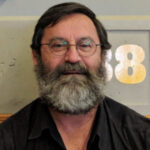 Andrew Lansdown is the author of 15 poetry books; this poem appears in his book, Abundance: New & Selected Poems (2020, Poiema/Cascade). He and his wife live in Perth, Australia; they have five adult children.
Andrew Lansdown is the author of 15 poetry books; this poem appears in his book, Abundance: New & Selected Poems (2020, Poiema/Cascade). He and his wife live in Perth, Australia; they have five adult children.Posted: 17 January 2024
-
The Man Who Stepped Out by Pamela Mordecai
The Man Who Stepped Out
… who is over all and through all and in all…
————————————Ephesians 4:6I heard the story
of a man who one
day felt and sawa world of awe
and let himself step in
to sudden radianceit lit him
and his children
and the worldthe glow
stayed all day
and the nextthen
he shut eyes
against the lighthe’d glimpsed
Elohim dancing
giddy in sand and seapervasive
in each cell
atomic in all thingssmall stones
blue air we shudder
that he’s everywherebut that
to him is mere
save always carethe story on
a page drawing
a man’s soft rage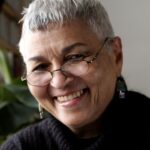 Pamela Mordecai is a Jamaican-born poet who lives in Toronto. Her A Fierce Green Place: New and Selected Poems appeared from New Directions in 2022.
Pamela Mordecai is a Jamaican-born poet who lives in Toronto. Her A Fierce Green Place: New and Selected Poems appeared from New Directions in 2022.Posted: 03 January 2024
-
Holy and Blameless by Tania Runyan
Holy and Blameless
Eph. 1:4
Before the world was made.
Your nebula of breath.
Yin-yangs of tadpole eggs
frozen inside a star.I was just a dream, a single
neuron firing. But there was
something I wanted to say
to you, something likeI won’t be saved,
my invisible fists rising.
The world did not deserve
my mercy, other that it was.You knew then
that I would return, standing here
at the kitchen sink:
I can’t scrub a pan without you.Let there be light, you said,
And I hid my face.
I can see you,
And you are good. Tania Runyan is the author of several poetry collections, including Second Sky (Poiema/Cascade) from which this poem comes. Her latest book is an autobiography, Making Peace With Paradise: an autobiography of a California girl published by T.S. Poetry Press.
Tania Runyan is the author of several poetry collections, including Second Sky (Poiema/Cascade) from which this poem comes. Her latest book is an autobiography, Making Peace With Paradise: an autobiography of a California girl published by T.S. Poetry Press.Posted: 20 December 2023
-
A House Like a Shawl by Laurie Klein
A House Like a Shawl
Of course, we must all
unravel, as we gravely
mouth the verbs of change,
until ego resists no more
than a garment,sloughed. May our souls,
exposed, finally forgo
shoring up gaps,
as if we can somehow
repair one blessèd thing. Maybethese closet selves, no more
substantial than April air
crocheted into a shawl,
only need to be shouldered,
held again to the breastbone.Ephesians 2: “[Y]ou too are being built together to become a dwelling in which God lives by his Spirit.”
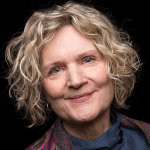 Laurie Klein is the author of Where The Sky Opens (2015), and the forthcoming House of 49 Doors ― from which this poem is taken; both are part of the Poiema Poetry Series from Cascade Books.
Laurie Klein is the author of Where The Sky Opens (2015), and the forthcoming House of 49 Doors ― from which this poem is taken; both are part of the Poiema Poetry Series from Cascade Books.Posted: 06 December 2023
-
Each Step I Take is Like a Little Death by Rena Ong
Each Step I Take is Like a Little Death
The narrow path where sometimes I can skip
can be the steep track of my weary trudge,
where jutting roots and stones cause me to trip
while bold mosquitoes follow for my blood.Each morning when I change my pus-stained bandage
so blood won’t seep, infection creep and cause
distress to excised flesh and increase damage
to new emergent skin as old withdraws.My daily restoration, Spirit-kindled,
a spark from dead wood , bears an inward flame
to light my forward steps before they’ve dwindled
my confidence, so now I can againwith purpose, tread along the guided paths,
reaching the promised mansion, home at last. Rena Ong is from England, yet has lived in Singapore for 37 years. Her poetry and other writing has appeared in Studio, Ekstasis, Proverse, The Englewood Review of Books, and A Given Grace. This poem arose from Paul’s words in Ephesians 4:22-24.
Rena Ong is from England, yet has lived in Singapore for 37 years. Her poetry and other writing has appeared in Studio, Ekstasis, Proverse, The Englewood Review of Books, and A Given Grace. This poem arose from Paul’s words in Ephesians 4:22-24.Posted: 15 November 2023
-
Walking to Eternity by Philip C. Kolin
Walking to Eternity
——-Ephesians 4:1-3; 17; 5:8
The monks of Gethsemani Monastery
avoid cold and vain stepping stones
to eternity. Those inscribed with broken
hearts, chiseled rose petals overshadowing
locket long goodbyes, weeping angels.
All for souls puffed up in finery and
encased in their tarnished bronze boudoirs.But lain between sheets of soil,
with only a cypress cross above.
the monks are caressed in light
even as their bodies lie unadorned,
faces cowled and arms stripped,
lest they enter eternity too worldly.Their sandaled feet walk east.
 Philip C. Kolin is Distinguished Professor of English Emeritus at the University of Southern Mississippi, and Emeritus Editor, of The Southern Quarterly. He has published 15 collections of poems including Reaching Forever (Poiema/Cascade, 2019), Delta Tears (Main Street Rag, 2021), and forthcoming Black Trauma: Resistance Poems about Black History (Third World Press, 2024).
Philip C. Kolin is Distinguished Professor of English Emeritus at the University of Southern Mississippi, and Emeritus Editor, of The Southern Quarterly. He has published 15 collections of poems including Reaching Forever (Poiema/Cascade, 2019), Delta Tears (Main Street Rag, 2021), and forthcoming Black Trauma: Resistance Poems about Black History (Third World Press, 2024).Posted: 01 November 2023
-
The New Self by Shane Schick
The New Self
“Put off your old self, which is corrupted
by its deceitful desires . . . and to put on
the new self, created to be like God.”
– Ephesians 4:22-24The street, I eventually decide,
is as good a dressing room as any.After another financial setback
and a client who’s never happyI didn’t even feel embarrassed
about the holes that had wornthrough my ideals, like when I
pocketed coins someone dropped.The temptation to cut corners
was loosed in me like a threadthat, if pulled rather than cut,
can unravel the entire sweater.Fortunately St. Paul’s Bloor St.
keeps its chapel open at noon.There’s only me and two others,
but we all sit in a naked silence.When my lunch hour has ended
and I stand up, it’s not cold outbut my resolve pulls together,
like teeth on a zipper’s slider.I pass through the glass doors,
fastening the promises I’ve madeas if they were a series of snaps.
Moving slowly along the sidewalk,nobody even notices how I
wrap my fear of failure tighteraround my waist, the cinching
making me more aware of itbut also a bit easier to carry.
While waiting for the walk signI wonder what other eyelets,
buckles, pins, grommets orhook-and-loops I’ll need to
figure out before I’ve donechanging, and even then,
how long it’s going to taketo break all this in, until
it finally feels like it fits. Shane Schick is a journalist and content marketer whose poems have been featured in Macrina Magazine, Ekstasis, Amethyst Review and many other publications. He lives with his wife, an Anglican priest, and their three children in Whitby, Ontario. ShaneSchick.com/poetry. Twitter: @ShaneSchick
Shane Schick is a journalist and content marketer whose poems have been featured in Macrina Magazine, Ekstasis, Amethyst Review and many other publications. He lives with his wife, an Anglican priest, and their three children in Whitby, Ontario. ShaneSchick.com/poetry. Twitter: @ShaneSchickPosted: 18 October 2023
-
Ephesians by Trey Dunham
from Ephesians [We Are Children]
We are children
Upon the sea
Adrift
In the swells
The ebbs
And flows
The crests and valleys
Of waves
Tossing us
The winds
And salt spray
Blinding us
Infants
Deceived
And drowning
The schemes
Of the crafty
The deceitful
Rising like towers
Above us
Cresting
Breaking
Falling
On our heads
Filling our lungs
Until by some grace
And against all hope
We are blown
Onto some mysterious
ShoreAnd there
We catch our breath
The first ray of morning
Warming our skin
The largeness
Of the world
And us growing
In it
Like wheat
Filling fields
Mature and golden
Adorned with
Thickening crowns
Kings and queens
Of glory
Joined
Held together
By a billion
Shafts stacked
So close
That one
Cannot push
Through
The ligatures
Binding us
A whole body
Shaken
Ebbing a flowing
In the wind
The spirit
Joining ours
Each stalk
Holding
One another
Working
Towards fulness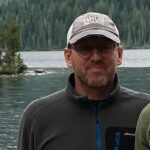 Trey Dunham is a poet living in West Virginia. His books, including Ephesians: Poems, are available through Amazon. The above is his poetic rendition of Ephesians 4: 14-16.
Trey Dunham is a poet living in West Virginia. His books, including Ephesians: Poems, are available through Amazon. The above is his poetic rendition of Ephesians 4: 14-16.Posted: 04 October 2023
-
How to Look for a Church by Violet Nesdoly
How to Look for a Church
Pretend you’re visiting
a family of distant relatives.Of course you don’t expect
—-to get an invitation for lunch
—-and all your social needs met
—-by a bunch of third cousins.
And it doesn’t matter
—-that the stairs smell of mildew
—-and water stains the ceiling
or that amongst themselves
—-they’re way too happy and loud
—-and hug a lot.What may catch you by surprise
—-even make you want to return
is how the Father you share
—-meets you there
puts His gentle but persistent hand
—-under your chin
—-to raise your face
and meet His eyes. Violet Nesdoly is a poet and novelist living in British Columbia. Her poetry collection Borrowed Gardens appeared from SparrowSong Press in 2014. This poem connects with the common bond of believers Paul speaks of in Ephesians 4:4-6.
Violet Nesdoly is a poet and novelist living in British Columbia. Her poetry collection Borrowed Gardens appeared from SparrowSong Press in 2014. This poem connects with the common bond of believers Paul speaks of in Ephesians 4:4-6.Posted: 20 September 2023
-
Lying in Wait to Deceive by Marjorie Maddox
Lying in Wait to Deceive
——-Ephesians 4:14
To deceive, he lies in wait
in plain view upon the pews.
He watches sinners congregate,then nods his head to validate
the pain of “penitents” who choose
deceit. He lies. He waitswhile the priest exonerates
the un-felt list, the false excuse,
watching sinners congregateto clear their conscience, obviate
their guilt. What tool to use?
Deceit. They lie. He waits.They check their lists, accelerate
their sense of good, and yet refuse
to watch their own sins congregate.In time, all sorrows propagate
and spread the falsehoods that he spews.
To deceive, he lies in wait.
He watches sinners congregate. Marjorie Maddox is director of Loch Haven University’s Creative Writing Program. Her most-recent poetry books include In the Museum of My Daughter’s Mind (2023, Shanti Arts), and Begin With a Question (2022, Iron Pen/Paraclete). This poem previously appeared in Mezzo Cammin.
Marjorie Maddox is director of Loch Haven University’s Creative Writing Program. Her most-recent poetry books include In the Museum of My Daughter’s Mind (2023, Shanti Arts), and Begin With a Question (2022, Iron Pen/Paraclete). This poem previously appeared in Mezzo Cammin.Posted: 06 September 2023
-
With My Mother Dying by Brad Davis
With My Mother Dying
——-Ephesians 2:10
A stalk of wheat cannot bear figs,
nor an orca a litter of seal pups.Would that it were a simple thing
to know the fruit one’s meant to bearinto the world, easy as an apple tree
her coy blossoms, then her apples.•
There is an ache within the dearest
deep down stuff of earth that begsfor our deliberate, healing gaze—
the handiwork of compassion.Why then a quandary what to bear?
All good work bends in one direction.•
Yet as with debt, there are no rules
but this: to love—with all of love’simprovisations. Which is itself a call
for wisdom. Patience, too. And lackinganswers for another’s pain, to being
free to bear the suffering without words. Brad Davis is a California-born Canadian living in northeastern Connecticut. His most recent collection is Trespassing on the Mount of Olives (Poiema/Cascade, 2021). His poems have appeared in Paris Review, Poetry, Image, Michigan Quarterly Review, Spiritus, JAMA, Brilliant Corners, Connecticut River Review, and many other journals.
Brad Davis is a California-born Canadian living in northeastern Connecticut. His most recent collection is Trespassing on the Mount of Olives (Poiema/Cascade, 2021). His poems have appeared in Paris Review, Poetry, Image, Michigan Quarterly Review, Spiritus, JAMA, Brilliant Corners, Connecticut River Review, and many other journals.Posted: 16 August 2023
-
Ephesians by Ryan Teitman
Ephesians
Beloved,
Remember what we used to know: the owl perched in the barn rafters with a kitten dangling from its beak, the summers so dry that the wheat withered underfoot as we walked through the field with ice-cream-coated hands. I remember the day you went crazy with fever and took a hatchet to the hives in the apiary. You stood in the swarm and shouted, “I am the Lord God of all creation!” before your father ran in and cradled you to the house. That night, the doctor dipped bandages in honey and wrapped your welted limbs, while your father read to you from Aesop’s Fables. You opened your mouth and let the doctor reach in with pliers, let him pull one bee after another from under your swollen tongue, and let him hold each corpse—glistened with spit—up to the windowpane, before dropping it in a jar at your bedside. You carried that jar with you always, half-filled with their dried bodies, like kernels of corn. On the last night of summer, we fell asleep in the hayloft. In your dream, you whispered, wake up, O sleeper, rise from the dead. In the morning, the jar was empty, and our eyes were the color of nectar. Ryan Teitman is a poet living in Pennyslvania, and the author of Litany for the City (BOA Editions, 2012) from which this poem is taken. The scripture reference included is from Ephesians 5:14.
Ryan Teitman is a poet living in Pennyslvania, and the author of Litany for the City (BOA Editions, 2012) from which this poem is taken. The scripture reference included is from Ephesians 5:14.Posted: 02 August 2023
-
By love are we thus bound by Joanne Epp
By love are we thus bound
Think breath: how long to hold the chord,
how to release it, how to lead them
to breathe with you, all drawing air
at once, exhaling in tune.Think of time, of echo: how voices reverberate
off hard pews, varnished floor, enlarged
by the space that contains them. Think
of the half beat it takes for the sound
from the farthest rows to reach you.Think encouragement. To hold up
the voices, not drown them. Pronounce
the rhythm with such clarity that no one
can help but feel its hearbeat.Think contrast, penultimate
to final verse: signal a new thing
coming. Lead them from four-part to unison
with bigger pedal stops, more reeds
in the manuals. Feel your neck hair
stand on end as every mouth in every
pew unites on the melody. Becomes
one instrument. Joanne Epp is a Winnipeg poet whose most recent collection is Cattail Skyline (2021, Turnstone Press).This poem arose from the poet’s reflections on Ephesians 4; the title comes from the hymn “Where charity and love prevail”; its 9th-century Latin text was translated by Omer E. Westendorf.
Joanne Epp is a Winnipeg poet whose most recent collection is Cattail Skyline (2021, Turnstone Press).This poem arose from the poet’s reflections on Ephesians 4; the title comes from the hymn “Where charity and love prevail”; its 9th-century Latin text was translated by Omer E. Westendorf.Posted: 19 July 2023
-
Being is Good by Ryan Keating
Being is Good
Be yourself is the worst
advice that ever went viral,
as if being someone else could be
a real option let alone the default ―
as if you were a static set
of style, capacity, and preference
unable to change and grow ―
as if you were an ideal type
of a particular breed whose traits
you must exemplify or risk
betraying yourself ―
as if we should all sacrifice ourselves
on the altar of authenticity
or someone’s idea of it.
You will keep being yourself,
but you might also consider
being good
and even
being better. Ryan Keating is a pastor, poet, and winemaker on the Mediterranean island of Cyprus. His poetry can be read at Foreshadow magazine and other outlets. This poem arose through reflection on Ephesians 4:22-24.
Ryan Keating is a pastor, poet, and winemaker on the Mediterranean island of Cyprus. His poetry can be read at Foreshadow magazine and other outlets. This poem arose through reflection on Ephesians 4:22-24.Posted: 05 July 2023
-
The Space Between by Eric Forsbergh
The Space Between
Jesus is walking down a road, as he often will.
From a side path emerges a centurion,
nodding at the distance of a plea.My servant lies at home, paralyzed.
Surely Jesus smells the Roman’s leather battle straps,
sees their frost of dried sweat salt, their earth-like stains and cuts,
yet hears a brittle syllable in the commander’s voice.Just say the word. My servant will be healed.
Bound at the hip, the soldier’s sword
cannot divide the space between.Just as you believed it would, says the Jew.
Back up the path, bending into shade of a low lintel,
striding through a rising rag of oven smoke
the Roman offers a clean robe, sits in the shadows,
and waits beside his ashen man for sweat to break. Eric Forsbergh is a Virginia poet, retired dentist, and Vietnam vet. He has just completed the necessary training to allow him to teach creative writing in prisons. He relates this poem to Ephesians 4:32
Eric Forsbergh is a Virginia poet, retired dentist, and Vietnam vet. He has just completed the necessary training to allow him to teach creative writing in prisons. He relates this poem to Ephesians 4:32Posted: 21 June 2023
-
Prayer 46 by Gregory of Narek
Prayer 46
Speaking with God from the Depths of the Heart
A
Now I am lost, forever punishable,
always immoral,
condemning myself to death,
shepherd of a flock of fetid sin, a flock of wild boars,
a despicable mercenary,
a shepherd watching a flock of desert goats.
The image of the shepherds’ tent in the Song of Songs
aptly applies to me,
for I do not know or understand,
by whom, in whose image or why I was created.B
Behold, you were formed like an angel,
on two feet that take and bring you,
as if in flight on two wings lifting you upward,
to gaze down on my fatherland.
O fool, why did you choose to be earthbound,
always preoccupied with the worldliness of
the here and now,
carrying on like wild asses in the desert?
On the lamp stand of your body, encircling your head,
a chandelier with many arms was placed,
so that by its light you might not stray and might
see God and know what is everlasting.
You were doubly endowed in the womb of reason,
so that you might speak with an unfettered tongue
of the victory of the good things given you.
And you were endowed with artful hands and
nimble fingers
to carry out the practical affairs of daily life
like the all-giving right hand of God,
that you might be called God.
You are assembled of 360 parts and five senses,
the number of the days of the year,
and no aspect of your physical being remains invisible
to your sight or unstudied by your mind.
For some parts are thick and strong,
some are small and others necessary,
some are sturdy but sensitive,
some are sublime, important and noble,
some are necessary but humble,
and the explanation of the image of these things is engraved on you
as on an uneraseable monument, wretched soul of mine,
so that like the elements of time
and the continuous train of days around the year
by some inner law these parts function
in unerring and inalterable order.C
And now another spiritual image,
tied to the bonds of love uniting the church,
is also reflected within you.
Like the yoke that mediates between the great
and the lowly,
the assembled body
established in the name of Christ is sometimes impaired,
as with the cutting off or loss of an unruly organ,
infecting the body.
Something is lost in your mortal structure,
feeling abode of mankind,
and the usual shape of the person undergoes
some disfigurement.
And now when the uniquely miraculous structure
in the living image of God,
is completely condemned, my enslaved soul,
that original likeness is stolen from you as
by breaking the law in the Garden of Eden.
But by the light of the baptismal font
the breath of the Holy Spirit is received and
the image is restored to God’s likeness.D
And now, why did you give up heavenly glory
like the original man Adam did in the earthly
Garden of Eden?
Why did you yourself close heaven and lock
the door to ascent?
Why did you mix the clean water with
impurities of bitter tears?
Why did you soil newly washed clothes with dirty work?
Why did you put off the clothes given you
and put on the cloak of sin?
Why did you infect the purity of your feet
by taking the path of the fallen?
Why did you repeat the violation of just vows of
the Old Testament?
Why did you refuse the fruit of grace, as Adam did
the tree of life?
Why did you willfully lose the unshadowed hope
of eternity?
Why did you cover your face with brazen shame?
Why did you arm your enemies against you,
repository of stupidity?
Why did you venture into the snares of death,
abandoning the way of faith?
Why did you get caught on the fishhook of deception,
you who share the body of the life giver?
But again, relying upon him, call to him,
the redeemer of those seeking refuge, renewer,
savior, life maker and life giver,
merciful, caring, lover of humanity,
ungrudging, generously compassionate,
blessed forever.
Amen.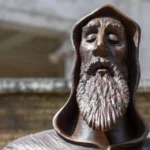 Gregory of Narek (c. 950–1003/1011) was an Armenian theologian, priest, monk and poet. Thank you to the translator of this poem, Thomas J. Samuelian, for his permission to include it here. It is from the new anthology To Heaven’s Rim: The Kingdom Poets Book of World Christian Poetry Beginnings to 1800, in English Translation (edited by Burl Horniachek). It relates to several themes in Ephesians, including the parts of Christ’s body, the church, in Ephesians 1:23, 4:16, and 5:29.
Gregory of Narek (c. 950–1003/1011) was an Armenian theologian, priest, monk and poet. Thank you to the translator of this poem, Thomas J. Samuelian, for his permission to include it here. It is from the new anthology To Heaven’s Rim: The Kingdom Poets Book of World Christian Poetry Beginnings to 1800, in English Translation (edited by Burl Horniachek). It relates to several themes in Ephesians, including the parts of Christ’s body, the church, in Ephesians 1:23, 4:16, and 5:29.Posted: 07 June 2023
-
That Birthday Present by Grace Constable
That Birthday Present
——-Ephesians 2:8-10
He is a father,
chose the gift
planned its execution
before you had breath.He is a carpenter,
secured the gift
with his
pierced hands.He is an advocate,
keeps at bay the lie
denying
this gift was made for you.He is who he is,
ever-patient
for his children
created anew. Grace Constable is graduating from Redeemer University this May with a double major in Psychology and English. She served this year as Chief Editor of Quest ― Redeemer’s literary journal ― and received the Rotary Club of Hamilton Amateur Young Writers Award for Fiction in 2021.
Grace Constable is graduating from Redeemer University this May with a double major in Psychology and English. She served this year as Chief Editor of Quest ― Redeemer’s literary journal ― and received the Rotary Club of Hamilton Amateur Young Writers Award for Fiction in 2021.Posted: 17 May 2023
-
Pain by Andrew Lansdown
Pain
——-Look carefully then how you walk …
——-making the best use of the time – Ephesians 5:15-16Yesterday, when I woke early
with that pain and got up and got
no relief, I thought of death,
my death. This is it, I thought.And I felt grief for my family
and friends. My two young sons
especially—fatherless in their
formative years. But mostlyI felt shame, an overwhelming
shame that I would soon meet
my Saviour with so little to give
in thanks. Inexcusably little.Today the pain has gone, but
not the shame. Oh, dear Jesus! Andrew Lansdown is the author of 15 poetry books ― most notably Abundance: New & Selected Poems (2020, Poiema/Cascade). He is one of Australia’s most-significant poets.
Andrew Lansdown is the author of 15 poetry books ― most notably Abundance: New & Selected Poems (2020, Poiema/Cascade). He is one of Australia’s most-significant poets.Posted: 03 May 2023
-
Bowl of Strawberries, Bowl of Milk by Steven Peterson
Bowl of Strawberries, Bowl of Milk
——-Ephesians 4:22-23
It probably wasn’t my best idea,
during the worst of COVID,
to stream Ingmar Bergman’s
1957 film The Seventh Seal
set during the 1350 bubonic plague,
because nearly every character dies—
in black and white and in Swedish.But then I reached the scene
where a grim medieval knight
encounters a poor traveling family—
mother, father, and infant—
who share their simple supper:
a bowl of strawberries
and a bowl of milk.The knight takes what he is offered,
then says, according to the subtitles:
I shall remember this moment,
your faces in the evening light,
and carry this memory between my hands
as carefully as if it were a bowl
filled to the brim with fresh milk.
It will be a sign; it will be enough for me. Steven Peterson writes poems and plays in Chicago. His poems appear in The Christian Century, Dappled Things, First Things, and elsewhere. Several of his poems are in the anthology Taking Root in the Heart (2023, Paraclete Press).
Steven Peterson writes poems and plays in Chicago. His poems appear in The Christian Century, Dappled Things, First Things, and elsewhere. Several of his poems are in the anthology Taking Root in the Heart (2023, Paraclete Press).Posted: 19 April 2023
-
love by Jonathan Chan
love
what lays outstretched in shades beyond a hill,
the silent trickling, stains upon a tree.
what every whispered prayer could fulfil
that transforms hidden shame to dignity.
to deal in glances and not platitudes,
a tight embrace and fingers intertwined.
to catch the words that tumble raw and lewd,
and tame the rudder should it steer the mind.
for love is in the poems that we give,
the conversations shared in evening rides,
the spoons of broth that nourish dreams to live,
the tender pixels laid in soft asides.
to see the mystery of a cosmic trace
within the beauty of another’s face.Jonathan Chan lives in Singapore and is the author of the poetry collection Going Home (2022, Landmark Books) This poem is from his series on the fruit of the Spirit (Galatians 5) yet relates to many verses in Ephesians, including the beginning of chapter five. It first appeared in A Given Grace, and is in his new book.
Posted: 05 April 2023
-
Amidst Compline and Prime by Desmond Kon
Amidst Compline and Prime
If a man wishes to be sure of the road he treads on,
he must close his eyes and walk in the dark.
————————-― Saint John of the Crossas much as this lyric seems so far away
inasmuch as distance is nearnessas much as that night seems as removed
inasmuch as tomorrow’s dawn is arrivalas much as this utterance feels out of reach
inasmuch as love demands an idiomas much as that sufferance feels impassable
inasmuch as hope rests on our faith Desmond Francis Xavier Kon Zhicheng-Mingdé is the Singapore author of eighteen books, including his memoir The Good Day I Died and creative guided journal Depth of Field (both from Penguin). He teaches creative writing at Nanyang Technological University. This poem is inspired by Ephesians 2:13.
Desmond Francis Xavier Kon Zhicheng-Mingdé is the Singapore author of eighteen books, including his memoir The Good Day I Died and creative guided journal Depth of Field (both from Penguin). He teaches creative writing at Nanyang Technological University. This poem is inspired by Ephesians 2:13.Posted: 22 March 2023
-
Potato Harvest by Janet Smith Post
Potato Harvest
. . .you. . .were sealed with the promised Holy Spirit,
which is the guarantee of our inheritance. .. Ephesians 1:13-14High mountain desert, birthed
from old fractures, old faults,
an ancient basin for an ancient lake,
whose slow drain left a hundred miles
of shrub brush, sage, and yucca.
Nurtured by the Rio Grande,
the river mother, sending veins of life
to scattered plots of produce—especially
potatoes, their leaves blossoming white near fall
then turning brown to dead, a signal
of waiting harvest beneath the ground.
In the fifties, school dismissed to send
us to join the work in the fields,
already filled with men and women,
bent over the blessing of the soil.
Burlap bags spread across the rows.Women, bandanas tied round their hair
to fend off flinging vines of dirt,
—their broad aprons, filled with potatoes
to tumble into crates; later into burlap bags.
Old men, old shoes, furrowed like the field.
Barefoot, we worked on our knees—good
knees—and closer to the ground.
Hands, faces and clothes congealed with dirt,
as we became one with the potatoes.
Tractor-digger filled the air with dust,
the old women called it El dolor—sorrow cloud.We caught up potatoes—fast—in each hand
upturned from their womb of soil, sometimes
throw-away-rocks, or impostor-balls of dirt.
Beside me, Alejandro’s dark eyes above his crate. And above
his head, the jagged peaks of Sangre de Cristo, the “Blood of Christ.”
Beneath us the strong smell of earth, microbes, interred in the soil.
Our pencils scratched marks, to tally crates.
Alejandro told me his Madre delivered a baby–
sister—the first child to live, since his own birth.
Alejandro and I nodded heads in rhythm
to the clink of coins counted out upon our palms.
We saw the buyer in his suit, close-surveying the field.
The farmer presented him one, small bag. “These potatoes,” he said
“are a guarantee of purchased quality.” Then a grin,
“Sweet taste of your field to come.”And then that Sunday, Alejandro’s dark eyes moist,
The baby sister—herself the size of a small bag of potatoes.
The priest drew a tiny cross of oil upon her head and said,
“Sealed with the Holy Spirit; marked as Christ’s own forever.”
The Holy Spirit—a force unseen. Believed, like the light,
splintered from the stained glass window above our heads.
The priest in scarlet robe—ambassador of guaranteed inheritance.
The farmer in his coveralls–the promise of the field to come.
The baby baptized—then dead within a month. Janet Smith Post is a writer, and musician who has written children’s books, fiction, and the self-published poetry collection Eyes of the Heart (2022). She is a member of the Colorado Authors League.
Janet Smith Post is a writer, and musician who has written children’s books, fiction, and the self-published poetry collection Eyes of the Heart (2022). She is a member of the Colorado Authors League.Posted: 08 March 2023
-
A Hymn to the Evening by Phillis Wheatley
A Hymn to the Evening
Soon as the sun forsook the eastern main
The pealing thunder shook the heav’nly plain;
Majestic grandeur! From the zephyr’s wing,
Exhales the incense of the blooming spring.
Soft purl the streams, the birds renew their notes,
And through the air their mingled music floats.
Through all the heav’ns what beauteous dies are spread!
But the west glories in the deepest red:
So may our breasts with ev’ry virtue glow,
The living temples of our God below!
Fill’d with the praise of him who gives the light,
And draws the sable curtains of the night,
Let placid slumbers sooth each weary mind,
At morn to wake more heav’nly, more refin’d;
So shall the labours of the day begin
More pure, more guarded from the snares of sin.
Night’s leaden sceptre seals my drowsy eyes,
Then cease, my song, till fair Aurora rise.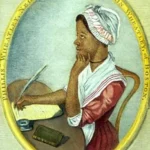 Phillis Wheatley (circa 1753—1784) is a black American poet who, as a child, was taken to be a slave. Her collection Poems on Various Subjects, Religious and Moral was published in 1773. This poem reflects what Paul says in Ephesians 2:21.
Phillis Wheatley (circa 1753—1784) is a black American poet who, as a child, was taken to be a slave. Her collection Poems on Various Subjects, Religious and Moral was published in 1773. This poem reflects what Paul says in Ephesians 2:21.Posted: 22 February 2023
-
Ephesians 1:23 by Sarah Olivo
Ephesians 1:23
body means to be earthside—
our maker roams this barren groundwhere wild prophets are buried
headless, and temples teem with gentilescleansed, and appointed to wash
millennia of grime from the inner sanctuary.we are the swelling wineskins
made of new lamb’s hide and stitched at the throat;we are baskets of fish, passed hastily about
in a crowd that doesn’t know its own hunger.driven by the visions of a shepherd king
and burdened by the right to speak them,we press our feet to a road we did not pave
and feel the desert stir beneath usat the will of him who wanders there
and calls forth heirs from stone.
 Sarah Olivio is a fourth-year honours writing major at Redeemer University in Ancaster, Ontario. She is on the editorial team for Quest, the student literary journal.
Sarah Olivio is a fourth-year honours writing major at Redeemer University in Ancaster, Ontario. She is on the editorial team for Quest, the student literary journal.Posted: 01 February 2023
-
Thanksgivings for the Soul by Thomas Traherne
from Thanksgivings for the Soul
—–Blessed be the Lord,
———Whose Understanding is infinite,
—–For giving me a Soul
———-Able to comprehend with all Saints the length, and breadth,
and depth, and height of the Love of God, which passeth
knowledge that I might be filled with all the fullness of God.———Unsatiable is my Soul,
————–Because nothing can fill it.
—–A living Centre, wider than the Heavens.
————–An infinite Abyss,
—–So made by the perfection of they Presence,
———Who art an infinite KNOWLEDGE in every Centre;
———Not corporeal, but simple Life;
———Wonderfully sufficient in all its Powers… Thomas Traherne (1637—1674) is an English writer whose poetry has been known for less than 150 years. This section of “Thanksgivings for the Soul” — which is from his book Thanksgivings — includes lines from Ephesians 3:18-19.
Thomas Traherne (1637—1674) is an English writer whose poetry has been known for less than 150 years. This section of “Thanksgivings for the Soul” — which is from his book Thanksgivings — includes lines from Ephesians 3:18-19.Posted: 18 January 2023
-
Guilty Feet by Rochelle Watt
Guilty Feet
Might I timidly tiptoe toward
a glassy sea,
or are my slippers
too tattered for holy ground?
Would the Trinity be dishonoured
by pirouettes of praise
from one wearing a ragged,
stained tutu?
I used to only peek
into your sanctuary.
Wings of a seraph
veiling my frame,
tongue too ashamed
to bless your name.But now,
clothed in confidence,
stenched garments of
insecurities and fear
surrendered.
Freedom found
through faith
in you,
guilty feet given rhythm.
Forgiveness allowing me to dance,
undignified in your presence.
Finally,
in your presence. Rochelle Watt lives in Toronto, and enjoys experiencing beauty in art, music, dance, theatre, and nature. She recently self-published her first poetry collection, Eden. This poem relates to Ephesians 3:12.
Rochelle Watt lives in Toronto, and enjoys experiencing beauty in art, music, dance, theatre, and nature. She recently self-published her first poetry collection, Eden. This poem relates to Ephesians 3:12.Posted: 04 January 2023
-
Ephesian Villanelle by Edward Clarke
Ephesian Villanelle
With psalms and hymns and odes the heart could bless,
But I must write and re-write lines I’ve read:
Do not get drunk on wine, wherein’s excess.The vodka at the fair made me legless.
My mother feared she’d wake and find me dead.
With psalms and hymns and odes the heart could bless.In Florence we styled ourselves young Bacchuses,
My mouth stained purple, but our teachers said:
Do not get drunk on wine, wherein’s excess.I sat collections in the hall, feckless,
High from the night before, and the gods fled
With psalms and hymns and odes the heart could bless.At Trinity we knocked back Guinnesses
And ate mixed grills looking like the undead:
Do not get drunk on wine, wherein’s excess.This tale’s the consort to a great goddess
Who’d have me stop and write the tune in my head.
With psalms and hymns and odes the heart could bless:
Do not get drunk on wine, wherein’s excess.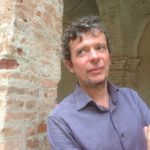 Edward Clarke lives in Oxford, England, and is the author of A Book of Psalms (2020, Paraclete). This poem relates to Ephesians 5:18.
Edward Clarke lives in Oxford, England, and is the author of A Book of Psalms (2020, Paraclete). This poem relates to Ephesians 5:18.Posted: 21 December 2022
-
Lament for a Holy People by David Doherty
Lament for a Holy People
Of the Methodists of Ontario in the middle of the nineteenth century
Beloved ones, light-footed, rising from
your pews like calves emerging from their stalls,
your hearts not soured by the gall of wine,
you seek, with opened lungs, the rushing wind.Redeemed from Adam’s twisted heart you bless
the hills and falling rivers as your Eden.
But each year harvest yields a grander heap,
and your ever-bigger barns blunt autumn’s breeze.And soon your children, playing in the orchard,
will prod a serpent coiled upon a branch. David Doherty is a graduate of McMaster Divinity College, an adjunct professor at Emmanuel Bible College, and an Anglican pastor in Oakville, Ontario. He says, “The poem refers to old-time Methodism’s famous emphasis on the apostle Paul’s twofold teaching in Ephesians 5:18.”
David Doherty is a graduate of McMaster Divinity College, an adjunct professor at Emmanuel Bible College, and an Anglican pastor in Oakville, Ontario. He says, “The poem refers to old-time Methodism’s famous emphasis on the apostle Paul’s twofold teaching in Ephesians 5:18.”Posted: 07 December 2022
-
Ambassador by Mischa Willett
Ambassador
I am writing —- ——–to you dear brothers
from the foundation ————of the blamelessness
I am writing —- ——–He who first began
dear ones —— —– the blameless to become
were later —– —– –that is to say
after the adoption —- —– —us of all people
poised cliffside —— —– –those who
he saw and said —- ——–through whom
earnest after inheritance ——-He that is the acceptance
who put together ———- –the foundation I was
referencing earlier ——– – —actually is
the greeting I send ———- —dear Ephesus Mischa Willett is the author of two poetry collections Phases (Poiema/Cascade) and The Elegy Beta (Mockingbird). He teaches at Seattle Pacific University. This poem arises from Ephesians 1:3-11.
Mischa Willett is the author of two poetry collections Phases (Poiema/Cascade) and The Elegy Beta (Mockingbird). He teaches at Seattle Pacific University. This poem arises from Ephesians 1:3-11.Posted: 16 November 2022
-
Ephesians 4:32 by Steven Searcy
Ephesians 4:32
Be kind as springtime sun to slender shoots,
as kind as April rain to stretching roots.
Be tender as a mother robin on
her nest, as tender as the dew at dawn,
as dogwood petals starting to unfold.But how can we be kind when hearts are cold
and shriveled? How can we be tender when
we’re filled with thorns and brittle stems, so thin
and barren that it seems nothing could save us?
He forgave us. He forgave us. He forgave us. Steven Searcy lives with his wife and three sons in Atlanta. He is an engineer in fiber optic telecommunications.
Steven Searcy lives with his wife and three sons in Atlanta. He is an engineer in fiber optic telecommunications.Posted: 02 November 2022
-
Poetics of Faith by Denise Levertov
Poetics of Faith
‘Straight to the point’
——-can ricochet,
————–unconvincing.
Circumlocution, analogy,
——-parable’s ambiguities, provide
————–context, stepping-stones.Most of the time. And then
the lightning power
——-amidst these indirections,
————–of plain
unheralded miracle!
——-For example,
————–as if forgetting
to prepare them, He simply
——-walks on water
————–towards them, casually –
and impetuous Peter, empowered,
——-jumps from the boat and rushes
————–On wave-tip to meet Him –
a few steps, anyway –
——-(till it occurs to him,
————–‘I can’t, this is preposterous’
and Jesus has to grab him,
——-tumble his weight
————–back over the gunwale).
Sustaining those light and swift
——-steps was more than Peter
————–could manage. Still,
years later,
——-his toes and insteps, just before sleep,
————–would remember their passage.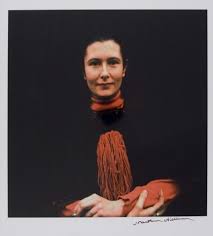 Denise Levertov (1923—1997) is a British-born American poet. This poem is from her collection The Stream and the Sapphire and speaks of experiential ways of knowing as suggested in Ephesians 1:8-10.
Denise Levertov (1923—1997) is a British-born American poet. This poem is from her collection The Stream and the Sapphire and speaks of experiential ways of knowing as suggested in Ephesians 1:8-10.Posted: 19 October 2022
-
Faithfulness by Jonathan Chan
faithfulness
“Jesus holding my hand has been the most powerful force in my life”
—————― Revd. Marcus Greenin open air by complineʼs candlelight
where dust and darkness mingle in the mind,
i had a quiet glimpse of love divine,
of images that dance in warmer nights.
descending from the dusk in paler glow,
an arm outstretched, unknowable abyss,
a comfort laced in having every wish
step out from sinking sand to glistening flow.
just as was done in sentul pasarʼs shade,
through streams that ran by street and cul-de-sac,
the careful walks that curve through waxy leaves.
just as was done in lives made and remade,
in every hug that brings the conscience back,
and messages by night to wait, to breathe.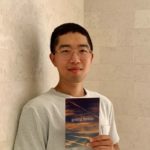 Jonathan Chan lives in Singapore and is the author of the poetry collection Going Home (2022, Landmark Books) This poem is from his series on the fruit of the Spirit (Galatians 5) and it relates to the first verse in Ephesians.
Jonathan Chan lives in Singapore and is the author of the poetry collection Going Home (2022, Landmark Books) This poem is from his series on the fruit of the Spirit (Galatians 5) and it relates to the first verse in Ephesians.Posted: 05 October 2022
-
Honoring the Dishonorable Emperor by Garrett Soucy
Honoring the Dishonorable Emperor
Teetering on the porch,
On the edge of another divorce,
He wielded the pages of Scripture
Like they were the hexagrams of the I Ching.
Hemmed in on either side
By a parapet of two lines
Desperately needing to be proven complementary
Or the relationship must end
Or the furthering of the universe
Would be threatened.
How did the vertical and horizontal
Beams of the cross not harmonize
Opposing forces?
Might not husbands now love unloveable wives?
Might not Holiness reconcile sinners?
Railing against the thought,
He moved to the ground.
Are you suggesting that I stand there
And let her crucify me?
Are you?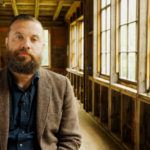 Garrett Soucy is a pastor at Christ The King Church in Belfast, Maine. This poem relates to Ephesians 5:25.
Garrett Soucy is a pastor at Christ The King Church in Belfast, Maine. This poem relates to Ephesians 5:25.Posted: 21 September 2022
-
Chancery by John Vigren
Chancery
Ephesians 1:4-5
The Giver of life comes to you (or not)
like a stray mortar round with your name on it:
not fair, like family wealth or a cleft palate.
Einstein put omnipotent God in the dock,
a Judge of deeds who brings all deeds about.
That genius, who saw in each planetary curve
a dimple in smiling space, could not see love
in the Light that foreordained the ruling light
if God knew all along how horribly
few of His children will not suffer always.
Unwilling to lose any, yet He craves
true friendship more than we crave certainty:
random, run-dom, deliberate luck of the draw
when Love decrees a law beyond the law. John Vigren is a New Jersey poet, landscape photographer, and a recovering addict. His verse has won awards, including the Utmost Christian Rhyming Poetry Prize.
John Vigren is a New Jersey poet, landscape photographer, and a recovering addict. His verse has won awards, including the Utmost Christian Rhyming Poetry Prize.Posted: 07 September 2022
-
Sometimes, at 3:00 a.m. by Laurie Klein
Sometimes, at 3:00 a.m.
—–. . . night is a rosary
—–of unanswered hours . . .
——————Ariel FranciscoOne airless jolt—
—–breath, a spasm,
shaking me wakeful—
—–& then what? Lie
still, if I can;
—–try not to obsess
over feeling shaken
—–in a realm
resoundingly shrill,
—–where foreboding
abets chaos. Alone,
—–in the starless hours,
the body flails, unfit
—–for the rugged soles
an ascent requires,
—–among the crags.
Still, I muster
—–the trusted ropes
& pitons: psalms,
—–hymns, my belief
that truth begets
—–traction, lest reason
shear, lest the cliff
—–where I anchored
my little flag
—–crumble. Rattle-shot
thoughts collide,
—–sinew & muscles
seize. Tell me,
—–who among us
can swallow
—–the flaring coal,
wedged in the bell
—–of the throat
when love & dread
—–liquesce, distilled
to raw vowels? All is
—–raveling sinus,
the jaws, unslung.
—–Come down,
ageless Waker of Rain!
—–Commandeer
lightning’s stilts
—–amid the reckless
thunders we’ve loosed
—–on your world.
I am so small.
—–So sorry & scared.
Absorb & absolve
—–my gibbering Whys,
aimed headlong,
—–into the gale. Come
because heard,
—–I can endure, graced
for the breaking
—–eventual dawn when
divinely unsteadied,
—–I kneel again,
knowing myself
—–saved, summoned,
in all ways met.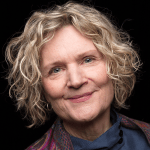 Laurie Klein is the author of the poetry collection Where The Sky Opens (2015, Poiema/Cascade). This poem arises from Ephesians 3:14, where Paul speaks of coming before the Father in prayer.
Laurie Klein is the author of the poetry collection Where The Sky Opens (2015, Poiema/Cascade). This poem arises from Ephesians 3:14, where Paul speaks of coming before the Father in prayer.Posted: 17 August 2022
-
Prayer (I) by George Herbert
Prayer (I)
Prayer the church’s banquet, angel’s age,
God’s breath in man returning to his birth,
The soul in paraphrase, heart in pilgrimage,
The Christian plummet sounding heav’n and earth
Engine against th’ Almighty, sinner’s tow’r,
Reversed thunder, Christ-side-piercing spear,
The six-days world transposing in an hour,
A kind of tune, which all things hear and fear;
Softness, and peace, and joy, and love, and bliss,
Exalted manna, gladness of the best,
Heaven in ordinary, man well drest,
The milky way, the bird of Paradise,
Church-bells beyond the stars heard, the soul’s blood,
The land of spices; something understood.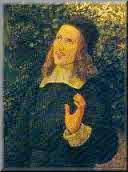 George Herbert (1593—1633) is one of Britain’s great metaphysical poets. The line “Heaven in ordinary, man well drest,” has been explained to mean that in prayer God reaches down, and we, as in Ephesians 4:22-24, have put on the new self.
George Herbert (1593—1633) is one of Britain’s great metaphysical poets. The line “Heaven in ordinary, man well drest,” has been explained to mean that in prayer God reaches down, and we, as in Ephesians 4:22-24, have put on the new self.Posted: 03 August 2022
-
The Chapel by R.S. Thomas
The Chapel
A little aside from the main road,
becalmed in a last-century greyness,
there is the chapel, ugly, without the appeal
to the tourist to stop his car
and visit it. The traffic goes by,
and the river goes by, and quick shadows
of clouds, too, and the chapel settles
a little deeper into the grass.But here once on an evening like this,
in the darkness that was about
his hearers, a preacher caught fire
and burned steadily before them
with a strange light, so that they saw
the splendour of the barren mountains
about them and sang their amens
fiercely, narrow but saved
in a way that men are not now. R.S. Thomas (1913-2000) has been called “the pre-eminent, Welsh poet writing in English in the second half of the twentieth century.” He served as an Anglican priest in rural Wales. This poem touches on Paul’s words concerning God mysteriously revealing himself through the church in Ephesians 3:10 & 11.
R.S. Thomas (1913-2000) has been called “the pre-eminent, Welsh poet writing in English in the second half of the twentieth century.” He served as an Anglican priest in rural Wales. This poem touches on Paul’s words concerning God mysteriously revealing himself through the church in Ephesians 3:10 & 11.Posted: 20 July 2022
-
Mindfulness by Violet Nesdoly
Mindfulness
I have brightened the walls
and enhanced the lighting
in the rooms of my mind
in order to see clearly
the thoughts that come and go.I have put up surveillance cameras
in each room and at the door.
At the end of the day
I replay the scenes
to better understand the role
of my thoughts in the day’s happenings.When doubt, fear, criticism
self-pity, pride and all their siblings
manage to slip in (and they do)
I freshen the atmosphere
With scripture balms
of faith, hope, and love.
The interlopers cannot stand
the fragrance and quickly leave.I am working on using
my single-purpose cubicles
(where no media is allowed)
for reading, listening, and praying. Violet Nesdoly is a poet and novelist living in British Columbia. She contributed poetry to the Crossings: A Journey to Easter catalogue and outdoor art exhibit in Toronto, 2022. This poem connects with Ephesians 5:20-24 ― especially with verse 23: “and be renewed in the spirit of your mind” (NKJV).
Violet Nesdoly is a poet and novelist living in British Columbia. She contributed poetry to the Crossings: A Journey to Easter catalogue and outdoor art exhibit in Toronto, 2022. This poem connects with Ephesians 5:20-24 ― especially with verse 23: “and be renewed in the spirit of your mind” (NKJV).Posted: 06 July 2022
-
Children of Wrath by Brian Volck
Children of Wrath
———–…tossed to and fro and blown about
———–by every wind of doctrine. – Ephesians 4:14The peace Christ preached demolished massive walls,
sent great blocks tumbling as from a temple
laid waste, not one stone left upon another.But we, who covet defensible positions
in our bitter quarrels amid the rubble,
rebuild the ramparts, making us aliensand strangers once more. That heretics thrive,
I have no doubt, having heard my share
in church preaching a merciless godin a graceless world, and if they speak
the truth, it seems done less in love
than in some desperate need to be right.Yet even these love God in their fashion,
shaming me with the fervor of what seems
misguided witness, and as we’re gatheredin one body, Spirit, Lord, and faith,
I hope to find ample forgiveness
in the furnace of Divine mercyto burn away not only their
overprized virtues and opinions
but the several I hold far too dear. Brian Volck is a pediatrician, and a writer whose poetry collection Flesh Becomes Word (2013) was published by Dos Madras Press.
Brian Volck is a pediatrician, and a writer whose poetry collection Flesh Becomes Word (2013) was published by Dos Madras Press.Posted: 15 June 2022
-
Predestination by Robert Herrick
Predestination
Predestination is the cause alone
Of many standing, but of fall to none.Robert Herrick (1591―1674) served as vicar of Dean Prior in Devonshire, and is the author of Hesperides: Or, The Works Both Humane & Divine (1648). This epigrammatic poem relates to the first chapter of Ephesians.
Posted: 01 June 2022
-
Καταβολής by John C. Mannone
Καταβολής (kataboláys)
Before the foundations of the Earth were laid,
even before stardust settled from the heavens
when a myriad of suns catastrophically cast off
their fiery shells—after their luminous bloating
or after glorious cataclysmic explosions, supernovas—
even before the Big Bang when there was nothing:
no space, no matter, no energy. Not even time. Yetbefore the attempted overthrow, catalyzed by pride
when a third of the angels fell, their wings unfolded
and proverbially stripped off, Lucifer catapulted,and even before conceived in my mother’s womb,
———God knew me and he loved me. I was cast
———in his own image. John C. Mannone is the author of four poetry collections, including the forthcoming Song of the Mountains (Middle Creek Publishing, 2023). He is a retired physics professor, living in Tennessee. The poem’s Greek title means an overthrow or a violent casting down but is typically translated as the foundations of the earth (Eph 1:4 and 1 Pet 1:20). The poem plays on other kata-words.
John C. Mannone is the author of four poetry collections, including the forthcoming Song of the Mountains (Middle Creek Publishing, 2023). He is a retired physics professor, living in Tennessee. The poem’s Greek title means an overthrow or a violent casting down but is typically translated as the foundations of the earth (Eph 1:4 and 1 Pet 1:20). The poem plays on other kata-words.Posted: 18 May 2022
-
And with what body do they come? by Emily Dickinson
And with what body do they come?
‘And with what body do they come?’ –
Then they do come – Rejoice!
What Door – What Hour – Run – run – My Soul!
Illuminate the House!‘Body!’ Then real – a Face and Eyes –
To know that it is them!
Paul knew the Man that knew the News –
He passed through Bethlehem – Emily Dickinson (1830–1886) is a poet who always wrestled with scripture. Here she is drawing hope from the promise of a physical resurrection in 1 Corinthians 15:35; This relates to passages such as Ephesians 2:6. She once wrote to a friend, “We both believe and disbelieve a hundred times an hour, which keeps Believing nimble.”
Emily Dickinson (1830–1886) is a poet who always wrestled with scripture. Here she is drawing hope from the promise of a physical resurrection in 1 Corinthians 15:35; This relates to passages such as Ephesians 2:6. She once wrote to a friend, “We both believe and disbelieve a hundred times an hour, which keeps Believing nimble.”Posted: 04 May 2022
-
Love’s As Warm As Tears by C.S. Lewis
Love’s As Warm As Tears
Love’s as warm as tears,
Love is tears:
Pressure within the brain,
Tension at the throat,
Deluge, weeks of rain,
Haystacks afloat
Featureless seas between
Hedges, where once was green.Love’s as fierce as fire,
Love is fire:
All sorts—infernal heat
Clinkered with greed and pride,
Lyric desire, sharp-sweet,
Laughing, even when denied,
And that empyreal flame
Whence all loves came.Love’s as fresh as spring,
Love is spring:
Bird-song hung in the air,
Cool smells in a wood,
Whispering ‘Dare! Dare!’
To sap, to blood,
Telling ‘Ease, safety, rest,
Are good; not best.’Love’s as hard as nails,
Love is nails:
Blunt, thick, hammered through
The medial nerves of One
Who, having made us, knew
The thing He had done,
Seeing (with all that is)
Our cross, and His. C.S. Lewis (1898—1963) is the author of The Narnia Chronicles and dozens of other books including Poems (where this poem may be found). This poem reflects the truth Paul expresses in Ephesians 3:17-19.
C.S. Lewis (1898—1963) is the author of The Narnia Chronicles and dozens of other books including Poems (where this poem may be found). This poem reflects the truth Paul expresses in Ephesians 3:17-19.Posted: 20 April 2022
-
The Living Flame of Love by John of the Cross
The Living Flame Of Love
O living flame of love
that tenderly wounds my soul
in its deepest center! Since
now you are not oppressive,
now consummate! if it be your will:
tear through the veil of this sweet encounter!O sweet cautery,
O delightful wound!
O gentle hand! O delicate touch
that tastes of eternal life
and pays every debt!
In killing you changed death to life.O lamps of fire!
in whose splendors
the deep caverns of feeling,
once obscure and blind,
now give forth, so rarely, so exquisitely,
both warmth and light to their Beloved.How gently and lovingly
you wake in my heart,
where in secret you dwell alone;
and in your sweet breathing,
filled with good and glory,
how tenderly you swell my heart with love. John of the Cross (1542–1591) is a Spanish poet, known for his mystical poetry. He was a Carmelite friar. The final stanza of this poem reflects Paul’s words in Ephesians 3:16 & 17.
John of the Cross (1542–1591) is a Spanish poet, known for his mystical poetry. He was a Carmelite friar. The final stanza of this poem reflects Paul’s words in Ephesians 3:16 & 17.Posted: 06 April 2022
-
The Apostle Paul Extends a Metaphor by Graham Hillard
The Apostle Paul Extends a Metaphor
———–Ephesians 2:19-21
The language seems to gather force and leap
Into the air: divine analogy
As spinning top. We, all of us, are those
Whom God has “fitly framed together” as
His holy temple. Still, Paul wonders if
The metaphor is incomplete, as though
A Roman mile had lost its thousandth pace.
Might masonry alone suggest a torpor
Or stillness unbecoming of the bride
Of Christ? Are we not rather restive deer,
Great leopards in a pack, or mourning doves
Lamenting these long lives? The great man knows
His art will be declined. Best close the scroll.
There will be time for craft another day. Graham Hillard is the editor of The Cumberland River Review and an associate professor of English at Trevecca Nazarene University. He lives in Nashville, Tennessee, with his wife and children.
Graham Hillard is the editor of The Cumberland River Review and an associate professor of English at Trevecca Nazarene University. He lives in Nashville, Tennessee, with his wife and children.Posted: 16 March 2022
-
Collage by John Robert Lee
Collage
―for Ann-Margaret Lim
“To the saints who are in Ephesus…” (Ephesians 1:1)
Gospelling yellow-breasts among avocado blossoms,
butterflies cavorting round the Rose of Sharon
a clean white flower in the morning
tinged at noon with pink changings,
hummingbirds probing under grapefruit,
hens and chicks foraging brown fallen leaves,
children on this Sabbath chanting hymns from their verandah,
and palm tree like a winged angel under the blue, sparse-cloud sky —who would think
that pestilence is ravaging our world?No safe zone on continent or island,
regular routines locked-down,
family, friends, lovers masked, distanced,
networks obsessed with flattening curves, death statistics,
churches and mosques closed, except for fanatics,
beaches, bars, brothels shut, except for skeptics
or those who want normal here, now,
and there are us crowding long lines outside shops —who wrote the script
who configured this incredible dystopia?Skies are clearing over megalopolitans everywhere
Himalayas in view after decades
I hear canals in Venice and Amsterdam are clean these days;
in neighborhoods under curfew,
wood-doves, various warblers clock quick-passing hours;
crickets, breezes soughing through leaves, are the night sounds,
no backfiring bikes or late-night dj’s. Judgement is dropping abroad
from our mouths, our hands —what unbelievable drama is rolling out behind the scenes,
Who is moving, Ephesians, to centre-stage of this cosmic scenario?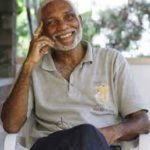 John Robert Lee is a Saint Lucian writer. His Collected Poems 1975-2015 (2017) and his most-recent book Pierrot (2020) are published by Peepal Tree Press.
John Robert Lee is a Saint Lucian writer. His Collected Poems 1975-2015 (2017) and his most-recent book Pierrot (2020) are published by Peepal Tree Press.Posted: 02 March 2022
-
Artemis of Ephesus by Tania Runyan
Artemis of Ephesus
Acts 19: 23-29
Jesus would have just smiled
at the cluster of breasts
cascading down her torso
like grapes: It is trueyou have not two, but forty.
Return to the meteor
from which you were carved
and fertilize no more.And she would start over
as a space rock fallen
from the sky―untouched―
and all her silver cousinsrescued from those sweaty
pilgrim hands he would melt
back to the ground where they lived
before slaves shimmieddown shafts to separate
the lead from the luster
veining the earth, running
in the stones like his blood. Tania Runyan is the author of five poetry collections, including What Will Soon Take Place (Paraclete) and Second Sky (Poiema/Cascade). She was the first poet featured on Poems For Ephesians.
Tania Runyan is the author of five poetry collections, including What Will Soon Take Place (Paraclete) and Second Sky (Poiema/Cascade). She was the first poet featured on Poems For Ephesians.Posted: 16 February 2022
-
Pictures by Sarah Klassen
Pictures
Ephesians 6:13-17
Picture the recommended pieces
of protective armor: belt, breastplate, boots,
shield, helmet. Objects of leather and metal,
hand-crafted by artisans, moulded to fit.
And also, of course, a sword. Implements
Long since replaced–except in movies—
by technically superior methods of defence
and attack, all more or less amenable to metaphor,a poetic tool that connects what’s not connected
as a rule. In other words, the apostle was a poet.
So was David, who picked up from the wadi
five smooth stones. With one he slew a giant.
His poems picture God as Rock. As fortress.
Shield. As shepherd with both rod and staff. Sarah Klassen is a Winnipeg poet whose eighth poetry collection is The Tree of Life (2020, Turnstone Press). Her first collection, Journey to Yalta (1988), won the Gerald Lampert Memorial Award.
Sarah Klassen is a Winnipeg poet whose eighth poetry collection is The Tree of Life (2020, Turnstone Press). Her first collection, Journey to Yalta (1988), won the Gerald Lampert Memorial Award.Posted: 02 February 2022
-
And That Will Be Heaven by Evangeline Paterson
And That Will Be Heaven
and that will be heaven
and that will be heaven
at last the first unclouded
seeingto stand like the sunflower
turned full face to the sun drenched
in light in the still centre
held while the circling planets
hum with an utter joy
seeing and knowing
at last in every particle
seen and known and not turning
away
never turning away
again
 Evangeline Paterson (1928—2000) is a poet who lived at various times in Ireland, Scotland and England. Her New and Selected poems, entitled Lucifer, with Angels was published by Dedalus in 1994. She expresses in the above poem the confidence Paul speaks of in Ephesians 3:12.
Evangeline Paterson (1928—2000) is a poet who lived at various times in Ireland, Scotland and England. Her New and Selected poems, entitled Lucifer, with Angels was published by Dedalus in 1994. She expresses in the above poem the confidence Paul speaks of in Ephesians 3:12.Posted: 19 January 2022
-
Lamentation by Marjorie Garvey
Lamentation
Your roomy leather chair, Anne,
is being pushed and pulled
into the buyer’s van;
even the couch I sat on
is sold, where I told you
—again and again—
my visits weren’t for money.Our lunch at DiCarlo’s, the same:
I tried to connect but your
regal moves blocked me—
an inconsequential pawn.
Always bad at chess, I stopped
the clock, abandoned your game.Each piece you possessed
and prized is sold off.
The porcelain roosters
watch the parade,
then are swept up.Petals from your tired,
red-tipped begonias fall
to the ground as one more
buyer brushes by
bearing the wooden case
of silver visitors seldom saw.
I breathe in the emptiness.A tough winter rose traps
the straggling rays of light. Marjorie Garvey is a Child Neurologist living in Washington, DC. She received her medical degree from Trinity College, Dublin. One early inspiration was hearing Seamus Heaney read his poetry to her high school class. “Lamentation” arises from the poet’s reading of Ephesians 4:25-32.
Marjorie Garvey is a Child Neurologist living in Washington, DC. She received her medical degree from Trinity College, Dublin. One early inspiration was hearing Seamus Heaney read his poetry to her high school class. “Lamentation” arises from the poet’s reading of Ephesians 4:25-32.Posted: 05 January 2022
-
Light Is His Shadow by Peter Venable
Light Is His Shadow
I pause in the sanctuary, beholding
a huge stained-glass window . . .
Joseph leaning, watching—
Mary in blue, sitting, cradling her baby—
sunlight blazes through Jesus’ head,
searing my eyes. I slam shut
a fiery brand on my retina—His light so bright
I cannot gaze upon Him.Must step aside
and adore Him
in sanctuary shade. Peter Venable lives in Winston-Salem, South Carolina, and has had poetry appear in such publications as Anglican Theological Review, Christian Century, and Ekstasis. This poem is drawn from the poet’s reflections on Ephesians 5:13.
Peter Venable lives in Winston-Salem, South Carolina, and has had poetry appear in such publications as Anglican Theological Review, Christian Century, and Ekstasis. This poem is drawn from the poet’s reflections on Ephesians 5:13.Posted: 15 December 2021
-
The Idea of It by Brad Davis
The Idea of It
Ephesians 4:10
What is good beyond
measure has begun, is nowand ever shall be good
beyond all math and music, danceand words and drama—beyond all smoke
and mirrors and manual acts.The crack in the air
where the light shines throughis the body of Immanuel—
changed and raised, ascended, new—and in this light we see the very
good made good beyond even all imagining. Brad Davis lives in Putnam, Connecticut. His latest book is Trespassing on the Mount of Olives (2021, Poiema/Cascade), which includes a poem which first appeared in Poems for Ephesians.
Brad Davis lives in Putnam, Connecticut. His latest book is Trespassing on the Mount of Olives (2021, Poiema/Cascade), which includes a poem which first appeared in Poems for Ephesians.Posted: 01 December 2021
-
When Two Become One by Anne Laidlaw
When Two Become One
Like Mary, a woman caught slacking in serving skills, accused by assumption
that she lost the home-coming role.Like she, who is bruised, so politely, behind closed doors, unable to genuflect
on cue and her tongue bitten dry with silence.When two become one, he surrenders first ― his body to me and crosses my
frozen precipice of fear and his self-death invites our vow.Then the loom of love weaves warp and weft. Two candles lean in and the
kisses of our flames fuse.He genuflects to wash my feet and gives me time to gather what music I need
to step towards him in our dance.Our melody is a waltz for two. His leading yields my feet in reassurance across
the marriage floor. Anne Laidlaw is an artist, poet, and writer ― originally from Edinburgh, Scotland ― who lives in Sault Ste Marie, Ontario. She has taught art intermittently at the Art Gallery of Algoma. This poem relates to Paul’s teaching in Ephesians 5.
Anne Laidlaw is an artist, poet, and writer ― originally from Edinburgh, Scotland ― who lives in Sault Ste Marie, Ontario. She has taught art intermittently at the Art Gallery of Algoma. This poem relates to Paul’s teaching in Ephesians 5.Posted: 17 November 2021
-
In Praise of the Light by Maryanne Hannan
In Praise of the Light
———–Ephesians 5:13-14
Wait for the Pauline paradox:
All things that are reproved are made manifest by the light
Breathe deep its depth:
For whatsoever doth make manifest is light.
The rounds of linguistic richness
Which steady our shadow dwelling ways
These words- let’s remember-
Fishermen diction, a small supply,
The common, vernacular, koiné
Used and reused,
A scarcity for the work at hand,
Laying in layers, the paradox
We ponder now, with fragile
Well-worked nets, breaking under the weight
Of subtle Substance. As we waken
Into the light, Paul needs few words:
ἐπιφαύσει, epiphanies on you, σοι
ὁ Χριστός: The Christ. Maryanne Hannan is a former Latin teacher, and the author of Rocking Like It’s All Intermezzo: 21st Century Responsorial Psalms (Resource Publications, 2019).
Maryanne Hannan is a former Latin teacher, and the author of Rocking Like It’s All Intermezzo: 21st Century Responsorial Psalms (Resource Publications, 2019).Posted: 03 November 2021
-
Ephesus at Sunset by Paul J. Pastor
Ephesus at Sunset
1.
Alkaline song in my acid mouth,
the Christ-hymn spills, a dear free
going of words, of praise-barks
slung slobberwise, as if I am a dog
who’s caught his master’s scent:
you came you came you came,and I have gone all clumsy in the tongue,
gone flop, gone adolescent in my joy, every
limb tripping every other limbbecause I see a star come over the horizon
just now, a star that speaks only its own name
then mine, each syllable a prism of ground glass,
slinging light, each syllable a humming crystal egg, a snapping diode,
an alkaline song.2.
Then I was elbow-deep in dishwater.
I looked up
as sunset light just caught
a spider on her window-web, as she
(backlit) tiptoed up her tightrope
to a sac of eggs just at the hatch, where
silhouetted like a shadow puppet
from the mahogany islands, she waved
her frontward legs, welcoming
her dear immortal young who spilled out
the worn and flattering bag, rejoicing, rejoicing
we came we came we came,
“and this,” I thought (all soapy at the wrists),
“is a type, a revelation, this” (rinsing a chipped bowl)
“is Christ.”3.
In other ages this was not known,
and even now is quite forgotten (how few
words it takes to tell the Mystery),
but it is all here, all in this first love
from which we either fall
or trip upon, trip on upward,
all us eight-legged puppies come happy to the hatch,
to our first boad glimpse of Mother-master, that star in burning web,
that maiden-cry, that blossom and that slit,
that sword dragged sharp on sidewalk brick,
that soap froth shaken in a filthy cup,
that sunset for the world, which shall turn to
our last and backward dawn:
————————————————become become become. Paul J. Pastor is an Oregon writer, and author of the poetry collection Bower Lodge which will be launched by Fernwood Press in December. This poem, which first appeared in Solum, is influenced by what Pastor calls, “Paul’s colossal run-on sentence in the Greek” of Epheisans 1:3-14.
Paul J. Pastor is an Oregon writer, and author of the poetry collection Bower Lodge which will be launched by Fernwood Press in December. This poem, which first appeared in Solum, is influenced by what Pastor calls, “Paul’s colossal run-on sentence in the Greek” of Epheisans 1:3-14.Posted: 20 October 2021
-
Stillborn by Margo Swiss
Stillborn
Awake thou that sleepest. Arise from the dead,
and Christ shall give thee light. (Ephesians 5.14)One dark night
I heard You speak and knew
that voice was none but You.
But so dog-tired and too far gone to rise
I beggared off pledging to write
another night.Days then passed and only now
Do I recall what I forgot that
You so kindly all for-
————————-gave those precious words spilling into
————————-lines a little poem let go
————————-come to not or even worse
————————-what might have been in time
————————-a sacred verse mis-
———————————————–carried now
———————————————–your stillborn art
———————————————–bleeds away in tears———————————————–my heart cries
———————————————–to rouse itself
———————————————–awake. Margo Swiss is a Toronto poet whose most-recent poetry book is Second Gaze (2020, St. Thomas Poetry Series). This poem is from this new collection.
Margo Swiss is a Toronto poet whose most-recent poetry book is Second Gaze (2020, St. Thomas Poetry Series). This poem is from this new collection.Posted: 06 October 2021
-
A Dialogue, between the Resolved Soul and Created Pleasure by Andrew Marvell
A Dialogue, between the Resolved Soul and Created Pleasure
Courage, my Soul, now learn to wield
The weight of thine immortal shield.
Close on thy head thy helmet bright.
Balance thy sword against the fight.
See where an army, strong as fair,
With silken banners spreads the air.
Now, if thou be’st that thing divine,
In this day’s combat let it shine:
And show that Nature wants an art
To conquer one resolvèd heart.PLEASURE
Welcome the creation’s guest,
Lord of earth, and heaven’s heir.
Lay aside that warlike crest,
And of Nature’s banquet share:
Where the souls of fruits and flowers
Stand prepared to heighten yours.SOUL
I sup above, and cannot stay
To bait so long upon the way.PLEASURE
On these downy pillows lie,
Whose soft plumes will thither fly:
On these roses strewed so plain
Lest one leaf thy side should strain.SOUL
My gentler rest is on a thought,
Conscious of doing what I ought.PLEASURE
If thou be’st with perfumes pleased,
Such as oft the gods appeased,
Thou in fragrant clouds shalt show
Like another god below.SOUL
A soul that knows not to presume
Is heaven’s and its own perfume.PLEASURE
Everything does seem to vie
Which should first attract thine eye:
But since none deserves that grace,
In this crystal view thy face.SOUL
When the Creator’s skill is prized,
The rest is all but earth disguised.PLEASURE
Hark how music then prepares
For thy stay these charming airs;
Which the posting winds recall,
And suspend the river’s fall.SOUL
Had I but any time to lose,
On this I would it all dispose.
Cease, tempter. None can chain a mind
Whom this sweet chordage cannot bind.CHORUS
Earth cannot show so brave a sight
As when a single soul does fence
The batteries of alluring sense,
And heaven views it with delight.
—Then persevere: for still new charges sound:
—And if thou overcom’st, thou shalt be crowned.PLEASURE
All this fair, and soft, and sweet,
—Which scatteringly doth shine,
Shall within one beauty meet,
—And she be only thine.SOUL
If things of sight such heavens be,
What heavens are those we cannot see?PLEASURE
Wheresoe’er thy foot shall go
—The minted gold shall lie,
Till thou purchase all below,
—And want new worlds to buy.SOUL
Were’t not a price, who’d value gold?
And that’s worth naught that can be sold.PLEASURE
Wilt thou all the glory have
—That war or peace commend?
Half the world shall be thy slave
—The other half thy friend.SOUL
What friends, if to my self untrue!
What slaves, unless I captive you!PLEASURE
Thou shalt know each hidden cause;
—And see the future time:
Try what depth the centre draws;
—And then to heaven climb.SOUL
None thither mounts by the degree
Of knowledge, but humility.CHORUS
Triumph, triumph, victorious Soul;
The world has not one pleasure more:
The rest does lie beyond the Pole,
And is thine everlasting store. Andrew Marvel (1621—1678) is an English Metaphysical poet. The shield, helmet and sword in the opening of this poem, and the conflict throughout, relates to Ephesians 6:13-17.
Andrew Marvel (1621—1678) is an English Metaphysical poet. The shield, helmet and sword in the opening of this poem, and the conflict throughout, relates to Ephesians 6:13-17.Posted: 15 September 2021
-
Blessing For Humanitarian Disaster Relief by Karen An-hwei Lee
Blessing For Humanitarian Disaster Relief
Dear Jesus, we survived a year in a world weary
of its capacity for disaster— economic recession,
a pandemic of asphyxiation, the loss of millions—
no one knew how it began, how it would ever end,
whether we might vanquish a virus with variants
when our makeshift clinics run out of ventilators.
The world and its catastrophes tilts in darkness:
Every solo hour of the day yields enough trouble—
we need not ever seek flame: there is famine and fire
throughout the land flooded by a ruthless storm
of unknowing that arrives with misery in the night.
God put the world on pause— and for what purpose?
To draw near to Christ, who draws near to suffering,
who endured afflictions while ministering on earth.
Say there comes a day after a year in the anthropause
when Jesus shows up, yet no one is watching? Maybe
the world will pay attention at last: righteousness
shall blossom: the oppressor will no longer oppress:
hungry hearts shall be fed by an avalanche of love,
as the apostle says: for we wrestle not against flesh
and blood but against principalities, against powers,
against the rulers of the darkness of this world.
We shall serve as humble agents under the mercy,
spreading the fragrance of Christ wherever we go.
Bless our eyes to see, our tongues to sing, our ears
to listen, our hands to heal, and soles of our feet
going into this world of tumult, war, and disaster. Karen An-hwei Lee is the author of Rose is a Verb: Neo-Georgics (2021, Wipf & Stock/Slant Books). The scriptural quote in this poem is from Ephesians 6:12. Her work has recently been featured on Kingdom Poets.
Karen An-hwei Lee is the author of Rose is a Verb: Neo-Georgics (2021, Wipf & Stock/Slant Books). The scriptural quote in this poem is from Ephesians 6:12. Her work has recently been featured on Kingdom Poets.Posted: 01 September 2021
-
Tenebrism Again, In Relief by Desmond Kon
Tenebrism Again, In Relief
“Love is not consolation. It is light.”
——————————-― Simone WeilIn Caravaggio’s own words: Amor Vincit Omnia.
It must have been an ode to Virgil’s Eclogue X,
how Virgil has returned to his home village, Andes.Look at the different cut and strain of logic here.
Fact is: the unilinear is an unreasonable expectation of art.
Virgil was his own guide,
the long trek from Milan up north to the flatland of Mantua.The Latin in translation: [That] Love conquers all.
The love has remained capitalized,
an effect I find something of an earned appearance
and purchase for my poetry these days.Did I actually just confess
that remote intentionality, that aesthetic
——————denial-and-removal-turned-allowance?Look at Caravaggio’s Deposition of Christ.
It hangs, like history, in the Vatican Pinacoteca.———Christ’s body,
———luminous skin defying every working
——————of light, its effortless rise and fall
——————like nature,
——————its owned and abstract rhythms,
———the way light travels in logical directions.[I never minded the monologic, if it brought me Truth.]
The fourth wall breaks,
entire scene—descent from the Cross—foregrounded.Foreshortened tomb ledge, and bent elbow.
These Baroque artists knew how to collapse
the inside-outside within canvas
———with the real outside—of our evolving world.We watch tradition, animated through light and dark.
Willing or not, we are involved
——————vis-à-vis our closed-in gaze.What character do we allow ourselves to become thus?
What narrator, what person beyond the mouthed,
the made known?Mere accessory-in-waiting, ready to help.
—————————God forbid, an antagonist.
——————Maybe adherent and aide;
——————spreader of the faith
—————————like in the good old days.——————What beloved, given apostolate then?
——————What lyric calling for today?
 Desmond Francis Xavier Kon Zhicheng-Mingdé is the Singapore author of eighteen books, including his memoir The Good Day I Died (Penguin) and his most recent poetry collection Found Texts of the AAI Anon, Circa 3119 (Ethos Books, 2020). He helms Squircle Line Press, and can be found at: desmondkon.com. This poem is inspired by Ephesians 1:18-23.
Desmond Francis Xavier Kon Zhicheng-Mingdé is the Singapore author of eighteen books, including his memoir The Good Day I Died (Penguin) and his most recent poetry collection Found Texts of the AAI Anon, Circa 3119 (Ethos Books, 2020). He helms Squircle Line Press, and can be found at: desmondkon.com. This poem is inspired by Ephesians 1:18-23.Posted: 18 August 2021
-
The Loadstone by Francis Quarles
The Loadstone
Eternal God! O Thou that only art
The sacred fountain of eternal light,
And blessed loadstone of my better part,
O Thou my heart’s desire, my soul’s delight!
Reflect upon my soul, and touch my heart;
And then my heart shall prize no good above Thee,
And then my soul shall know Thee; knowing, love Thee;
And then my trembling thoughts shall never start
From thy commands, or swerve the least degree,
Or once presume to move, but as they move in Thee. Francis Quarles (1592–1644) was appointed cupbearer to Princess Elizabeth — the daughter of England’s James I in 1613. The poet here expresses what is in his heart, which is what Paul desires for the church in Ephesians 3:17.
Francis Quarles (1592–1644) was appointed cupbearer to Princess Elizabeth — the daughter of England’s James I in 1613. The poet here expresses what is in his heart, which is what Paul desires for the church in Ephesians 3:17.Posted: 04 August 2021
-
Apples by Andrew Lansdown
Apples
and the two shall become one flesh. This mystery is profound ― Ephesians 5:31-32
She lifts her long skirt
to cradle the windfalls.
Her legs are very white,
like the flesh of apples.Some things about women
a woman can never know.
Else she would not stand
with her skirt caught up.Or she would more often.
She stands in the shade
of the laden tree, unaware
I am aware of her legs.Beloved, even the apples
are blushing in your lap. Andrew Lansdown is the author of 15 poetry books ― most recent of which is Abundance: New & Selected Poems (2020, Poiema/Cascade). He is one of Australia’s most-significant poets.
Andrew Lansdown is the author of 15 poetry books ― most recent of which is Abundance: New & Selected Poems (2020, Poiema/Cascade). He is one of Australia’s most-significant poets.Posted: 21 July 2021
-
Church by Les Murray
Church
i.m. Joseph Brodsky
The wish to be right
has decamped in large numbers
but some come to God
in hopes of being wrong.High on the end wall hangs
the Gospel, from before he was books.
All judging ends in his fix,
all, including his own.He rose out of Jewish,
not English evolution
and he said the lamp he held
aloft to all nations was Jewish.Freedom still eats freedom,
justice eats justice, love –
even love. One retarded man said
church makes me want to be naughty,but naked in a muddy trench
with many thousands, someone’s saying
the true god gives his flesh and blood.
Idols demand yours off you. Les Murray (1938—2019) is considered the leading Australian poet of his generation. This poem relates to the truths found in Ephesians 4:17—24.
Les Murray (1938—2019) is considered the leading Australian poet of his generation. This poem relates to the truths found in Ephesians 4:17—24.Posted: 07 July 2021
-
Praying by Mary Oliver
Praying
It doesn’t have to be
the blue iris, it could be
weeds in a vacant lot, or a few
small stones; just
pay attention, then patcha few words together and don’t try
to make them elaborate, this isn’t
a contest but the doorwayinto thanks, and a silence in which
another voice may speak. Mary Oliver (1935—2019) is one of the best-selling contemporary poets in the United States. This poem, which is from her collection Thirst (2006,Beacon Press), works as a fine companion piece to Ephesians 3:12.
Mary Oliver (1935—2019) is one of the best-selling contemporary poets in the United States. This poem, which is from her collection Thirst (2006,Beacon Press), works as a fine companion piece to Ephesians 3:12.Posted: 16 June 2021
-
Paradiso by Dante Alighieri
from Paradiso―Canto XXVIII
(The Ninth Heaven: the Primum Mobile. The nine luminous circles of the angelic hierarchies. Their revolutions around a Point. Beatrice’s explanation. The celestial hierarchy. The correct angelology of Dionysius and the mistake of St. Gregory.)
And she who saw my mind’s perplexities
said: “The first circles have displayed to you
the Seraphim and Cherubim. They followthe ties of love with such rapidity
because they are as like the Point as creatures
can be, a power dependent on their vision.Those other loves that circle round them are
called Thrones of the divine aspect, because
they terminated the first group of three;….The second triad—blossoming in this
eternal springtime that the nightly Ram
does not despoil—perpetually sings‘Hosanna’ with three melodies that sound
in the three ranks of bliss that form this triad;
within this hierarchy there are threekinds of divinities: first, the Dominions,
and then the Virtues; and the final order
contains the Powers. The two penultimategroups of rejoicing ones within the next
triad are wheeling Principalities
and the Archangels; last, the playful Angels.These orders all direct—ecstatically—
their eyes on high; and downward, they exert
such force that all are drawn and draw to God.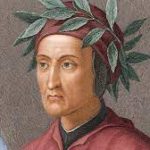 Dante Alighieri (1265—1321) has laid out here the nine ranks of angelic beings, which comes from the medieval interpretation of Ephesians 1:21, and Colossians 1:16. This translation of Paradiso is from Allen Mandelbaum.
Dante Alighieri (1265—1321) has laid out here the nine ranks of angelic beings, which comes from the medieval interpretation of Ephesians 1:21, and Colossians 1:16. This translation of Paradiso is from Allen Mandelbaum.Posted: 02 June 2021
-
The Bat by Jane Kenyon
The Bat
I was reading about rationalism,
the kind of thing we do up north
in early winter, where the sun
leaves work for the day at 4:15Maybe the world is intelligible
to the rational mind;
and maybe we light the lamps at dusk
for nothing…Then I heard the wings overhead.
The cats and I chased the bat
in circles—living room, kitchen,
pantry, kitchen, living room…
At every turn it evaded uslike the identity of the third person
in the Trinity: the one
who spoke through the prophets,
the one who astounded Mary
by suddenly coming near. Jane Kenyon (1947―1995) is an American poet who was married to poet Donald Hall (1928―2018). She was Poet Laureate of New Hampshire when she died of leukemia. Every chapter in Ephesians speaks of the influence of the Holy Spirit, who both draws near, and yet remains a mystery.
Jane Kenyon (1947―1995) is an American poet who was married to poet Donald Hall (1928―2018). She was Poet Laureate of New Hampshire when she died of leukemia. Every chapter in Ephesians speaks of the influence of the Holy Spirit, who both draws near, and yet remains a mystery.Posted: 19 May 2021
-
A Quintina Of Crosses by Chad Walsh
A Quintina Of Crosses
Beyond, beneath, within, wherever blood,
If there were blood, flows with the pulse of love,
Where God’s circle and all orbits cross,
Through the black space of death to baby life
Came God, planting the secret genes of God.By the permission of a maiden’s love,
Love came upon the seeds of words, broke blood,
And howled into the Palestine of life,
A baby roiled by memories of God.
Sometimes he smiled, sometimes the child was cross.Often at night he dreamed a dream of God
And was the dream he dreamed. Often across
The lily fields he raged and lived their life,
And Heaven’s poison festered in his blood,
Loosing the passion of unthinkable love.But mostly, though, he lived a prentice’s life
Until a singing in the surge of blood,
Making a chorus of the genes of God,
Flailed him into the tempest of a love
That lashed the North Star and the Southern Cross.His neighbors smelled an alien in his blood,
A secret enemy and double life;
He was a mutant on an obscene cross
Outraging decency with naked love.
He stripped the last rags from a proper God.The life of God must blood this cross for love.
 Chad Walsh (1914—1991) taught at Beloit College for more than 30 years, and authored more than 20 books. This poem expresses truths found in Ephesians 1:4-8. A quintina is a poetic form, similar to a sestina, but with five-line stanzas featuring five required end words.
Chad Walsh (1914—1991) taught at Beloit College for more than 30 years, and authored more than 20 books. This poem expresses truths found in Ephesians 1:4-8. A quintina is a poetic form, similar to a sestina, but with five-line stanzas featuring five required end words.Posted: 05 May 2021
-
Siesta by George Whipple
Siesta
——————― for Margaret Avison
Infolded like a fieldmouse in warm hay
while gnats negotiate the price of wheat,
I grab a little shut-eye, drown
in white delicious underworlds of sleep.Parched otiose two-legged lust-crazed spit,
I whisper softly to sweet ears of corn,
and enter ant hill churches with a slow
sad eye explores the looking grass.Although I join my foster mother, earth,
am pitchforked into dogbone-buried clay,
I trust my rising to the Paraclete
who mends the leaky milkpail of my soul―as in some muddy ditch a shining frog
slowly hatches in the tadpole mind of God.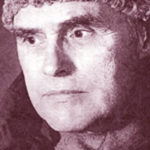 George Whipple (1927—2014) is a Canadian poet who authored many collections. His papers and other works are archived in the Thomas Fisher Rare Book Library, University of Toronto. The turn in this sonnet draws its authority from Ephesians 1:13.
George Whipple (1927—2014) is a Canadian poet who authored many collections. His papers and other works are archived in the Thomas Fisher Rare Book Library, University of Toronto. The turn in this sonnet draws its authority from Ephesians 1:13.Posted: 21 April 2021
-
Vegetable Patch by Luci Shaw
Vegetable Patch
“Rooted and grounded in love” ― Ephesians 3: 17
Spring, and we are flush with the energy
of hope. It’s growing season again, and this week,
as I kneel in the soil next to a budding bulb,
or even my ancient, perennial rhubarb, I find
myself (and that word feels right: I find my self)
as if I were as rooted and perennial as this
living thing. When a minor underground upsurge
shows a flourish of green leaves and stalks
red as wine it’s as if I too am bursting free
after a long, icy winter.Root is a word of promise, proof that life prepares
to thrust itself up into the light, carrying
the energy of hope. Jesus prefigured this
miracle of rising—telling us that only as a small,
dry seed dies will it thrust out its root tendril,
its declaration of intent to grow and thrive.As those rhubarb stems yielded to the knife,
may I now yield to the harvesting hand that has
rooted me, and lifts me now from the earth. Luci Shaw is the author of 36 books ― 16 of which are her own poetry collections (by my count). She has been Writer-in-Residence at Regent College in Vancouver since 1986, and is the 2013 recipient of the Denise Levertov Award. Her most recent collection is The Generosity (2020, Paraclete Press).
Luci Shaw is the author of 36 books ― 16 of which are her own poetry collections (by my count). She has been Writer-in-Residence at Regent College in Vancouver since 1986, and is the 2013 recipient of the Denise Levertov Award. Her most recent collection is The Generosity (2020, Paraclete Press).Posted: 14 April 2021
-
Anguish by Henry Vaughan
Anguish
My God and King! to Thee
I bow my knee;
I bow my troubled soul, and greet
With my foul heart thy holy feet.
Cast it, or tread it! it shall do
Even what thou wilt, and praise thee too.My God, could I weep blood,
Gladly I would,
Or if thou wilt give me that art,
Which through the eyes pours out the heart,
I will exhaust it all, and make
Myself all tears, a weeping lake.O! ’tis an easy thing
To write and sing;
But to write true, unfeigned verse
Is very hard! O God, disperse
These weights, and give my spirit leave
To act as well as to conceive!———O my God, hear my cry;
————–Or let me die! Henry Vaughan (1622―1695) is a Welsh metaphysical poet. He expresses his desire here, like in Ephesians 4:12 and the surrounding verses, that he would be equipped to serve God and his people through the gift God has given to him.
Henry Vaughan (1622―1695) is a Welsh metaphysical poet. He expresses his desire here, like in Ephesians 4:12 and the surrounding verses, that he would be equipped to serve God and his people through the gift God has given to him.Posted: 07 April 2021
-
On Old Women by Czeslaw Milosz
On Old Women
Invisible, dressed in clothes too big for me,
I take a walk, pretending I am a detached mind.What country is this? Funeral wreaths, devalued medals,
a general avoidance of remembering what happened.I think of you, old women, silently fingering past days
of your lives like the beads of your rosaries.It had to be suffered, endured, managed.
One had to wait and not wait, one had to.I send my prayers for you to the Highest, helped
by your faces in old photographs.May the day of your death not be a day of hopelessness,
but of trust in the light that shines through earthly forms. Czeslaw Milosz (1911—2004) is a Polish poet who won the Nobel Prize in 1980. This poem is from his collection Second Space and relates to Paul’s prayer in Ephesians 1:18.
Czeslaw Milosz (1911—2004) is a Polish poet who won the Nobel Prize in 1980. This poem is from his collection Second Space and relates to Paul’s prayer in Ephesians 1:18.Posted: 31 March 2021
-
The Power to Grasp by Rena Ong
The Power to Grasp
The giant Octopus, tentacles unfolding
in its inky blackness, dwells in
the sonar-calculated depths, stretching its skin,
umbrella-like as if towards infinity.The universe itself, with its cloak of stars
expands throughout space, where Hubble’s law
and telescope try to measure its height and breadth.How does one measure the unfathomable,
the One with no beginning or end, with whom
all known measurements are irrelevant, for whom
time itself does not exist?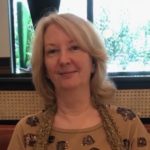 Rena Ong is from England, yet has lived in Singapore for many years with her Singaporean husband. She has poetry forthcoming in Ekstasis. This poem arose from Paul’s words in Ephesians 3:18.
Rena Ong is from England, yet has lived in Singapore for many years with her Singaporean husband. She has poetry forthcoming in Ekstasis. This poem arose from Paul’s words in Ephesians 3:18.Posted: 24 March 2021
-
Letter to Lewis Smedes about God's Presence by Rod Jellema
Letter to Lewis Smedes about God’s Presence
I have to look in cracks and crevices.
Don’t tell me how God’s mercy
is as wide as the ocean, as deep as the sea.
I already believe it, but that infinite prospect
gets farther away the more we mouth it.
I thank you for lamenting his absences —
from marriages going mad, from the deaths
of your son and mine, from the inescapable
terrors of history: Treblinka. Viet Nam.
September Eleven. It’s hard to celebrate
his invisible Presence in the sacrament
while seeing his visible absence from the world.This must be why mystics and poets record
the slender incursions of splintered light,
echoes, fragments, odd words and phrases
like flashes through darkened hallways.
These stabs remind me that the proud
and portly old church is really only
that cut green slip grafted into a tiny nick
that merciful God himself slit into the stem
of His chosen Judah. The thin and tenuous
thread we hang by, so astonishing,
is the metaphor I need at the shoreline
of all those immeasurable oceans of love.Adapted from an e-mail discussion, Summer 2002
 Rod Jellema (1927—2018) founded the Creative Writing Program at the University of Maryland, and is the author of Incarnality: The Collected Poems (2010, Eerdmans). This poem echoes Ephesians 2:4.
Rod Jellema (1927—2018) founded the Creative Writing Program at the University of Maryland, and is the author of Incarnality: The Collected Poems (2010, Eerdmans). This poem echoes Ephesians 2:4.Posted: 17 March 2021
-
The Other by R.S. Thomas
The Other
There are nights that are so still
that I can hear the small owl calling
far off and a fox barking
miles away. It is then that I lie
in the lean hours awake listening
to the swell born somewhere in the Atlantic
rising and falling, rising and falling
wave on wave on the long shore
by the village that is without light
and companionless. And the thought comes
of that other being who is awake, too,
letting our prayers break on him,
not like this for a few hours,
but for days, years, for eternity.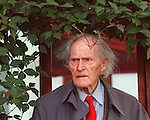
R.S. Thomas (1913―2000) is a Welsh poet and Anglican priest who spent his life in the rural parishes of the hill country in Wales. In 1964 he won the Queen’s Gold Medal for poetry. This poem reflects the truth of Ephesians 3:12.
Posted: 10 March 2021
-
Some Words by Violet Nesdoly
Some Words
I can think a thing a long time
with the words going
round and round
inside my head
like the gray gruel
mixing in a cement truckbut once I say those thoughts
once those words
escape my mouth
pour out
become exposed to air
everything changes.The minute they’re out
they start to solidify.
Too late now
to scoop them up
shove them back
into the place they came fromfor they’ve already begun
to work their alchemy
changing the elements
inside me, inside youhardening—
a shameful statue
a concrete wall
a sad gray memorial
between us. Violet Nesdoly is a poet, writer, and visual artist living in Langley, British Columbia. This poem is from her 2004 chapbook Calendar (now a free download from Smashwords). Ephesians 4:31 (NKJV) – “Let all bitterness, wrath, anger, clamour, and evil speaking be put away from you, with all malice.” Violet’s newest novel Under the Cloud appeared in 2020.
Violet Nesdoly is a poet, writer, and visual artist living in Langley, British Columbia. This poem is from her 2004 chapbook Calendar (now a free download from Smashwords). Ephesians 4:31 (NKJV) – “Let all bitterness, wrath, anger, clamour, and evil speaking be put away from you, with all malice.” Violet’s newest novel Under the Cloud appeared in 2020.Posted: 03 March 2021
-
Apology by Vassar Miller
Apology
My mortal love’s a rabbit skin
That will not reach around your bones
To charm the chill, to wrap you in
Against the wind whose undertones
Are death, or snow whose flakes are stones.
My word will never do for thread
To knit you garments snug and tight
Though I would fold you foot and head
Against the frost-fangs of the night
Killing whatever rose they bite.
My will is not enough to stretch
The tattered pelt around us two.
Pity, with each of us a wretch,
Comes dyed my hurt’s deceitful hue
As rag for me, not robe for you.
The only comfort under which
Our naked souls may crouch together
Only immortal love, all-rich
In warmer wool than fleece, can stitch.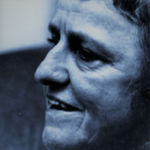 Vassar Miller (1924–1998) twice served as Poet Laureate of Texas. She lived her whole life with cerebral palsy. This poem reflects scriptural teaching on love, including that in Ephesians 3:17-19. This poem is from her first book, Adam’s Footprint (1956).
Vassar Miller (1924–1998) twice served as Poet Laureate of Texas. She lived her whole life with cerebral palsy. This poem reflects scriptural teaching on love, including that in Ephesians 3:17-19. This poem is from her first book, Adam’s Footprint (1956).Posted: 24 February 2021
-
Love (1) by George Herbert
Love (1)
Immortal Love, author of this great frame,
Sprung from that beauty which can never fade,
How hath man parcel’d out Thy glorious name,
And thrown it on that dust which Thou hast made,
While mortal love doth all the title gain!
Which siding with Invention, they together
Bear all the sway, possessing heart and brain,
(Thy workmanship) and give Thee share in neither.
Wit fancies beauty, beauty raiseth wit;
The world is theirs, they two play out the game,
Thou standing by: and though Thy glorious name
Wrought our deliverance from th’ infernal pit,
Who sings Thy praise? Only a scarf or glove
Doth warm our hands, and make them write of love.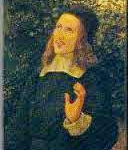 George Herbert (1593—1633) is an influential metaphysical poet, whose collection The Temple appeared shortly after his death. The word “workmanship” (the Greek word poiema meaning “the thing made”) refers to Ephesians 2:10 as it appears in the King James Version.
George Herbert (1593—1633) is an influential metaphysical poet, whose collection The Temple appeared shortly after his death. The word “workmanship” (the Greek word poiema meaning “the thing made”) refers to Ephesians 2:10 as it appears in the King James Version.Posted: 17 February 2021
-
Paul by Fred Allen
Paul
Crystalline intellect!
Diamond sheer clarity!
Dynamo-drive engine
—————-of the Almighty!
What forces intersect,
What electricity,
That you convulse to win—
—————-no, to wrench us free?Magnificent torrent!
Brilliant bright ascension!
Incandescent cloudburst
—————-of apprehension!
Dazzling brainstorms torment
Thorny flesh, spark tension—
Turbulent truth dispersed
—————-flaring like the sun!Such joy to be devoured
By a voracious God!
Wrung empty, shell shattered
—————-by his ruthless claim!
Broken and empowered,
Budded like Aaron’s rod,
You badger the scattered
—————-felons toward the flame. Fred Allen lives in Salem, Oregon, and taught for many years at George Fox University. He has just published his new poetry collection Fool’s Gold through Lulu. This poem was inspired through the poet’s reading of Ephesians.
Fred Allen lives in Salem, Oregon, and taught for many years at George Fox University. He has just published his new poetry collection Fool’s Gold through Lulu. This poem was inspired through the poet’s reading of Ephesians.Posted: 10 February 2021
-
Paul Discusses His Healings at Ephesus by Tania Runyan
Paul Discusses His Healings at Ephesus
Acts 19:11-12
The dove that descended on Christ
and now makes his nest in my bodystrains his wings against the walls
of my chest. I coax him outof my fingertips―flight of heaven,
come―until he blazes throughwith my skin on his claws.
People thrust fabric before me,and when the Spirit sweeps down
I feel myself enter the wave:the handkerchief a woman will wrap
around her husband’s palsied hand,the blanket the mother will press
to her baby’s violet lips. A child fallsat my feet with his mother’s apron.
She is trying to get the baby outbut only blood is coming.
I hold this cloth to my face and weepInto the birth fluid and blood,
the smoke from last night’s meal.As night falls, I feel it is I in their home―
not the apron, but my own hands drapedover the whimpering pulse in her wrists
as the baby screams in the corner for milkand the father splits me with his stares,
wondering, Spirit, if we will come through. Tania Runyan is the author of five poetry collections, including What Will Soon Take Place (Paraclete) and Second Sky (Poiema/Cascade). She was the first poet featured on Poems For Ephesians.
Tania Runyan is the author of five poetry collections, including What Will Soon Take Place (Paraclete) and Second Sky (Poiema/Cascade). She was the first poet featured on Poems For Ephesians.Posted: 03 February 2021
-
Blue Jay Scamper by Pier Giorgio Di Cicco
Blue Jay Scamper
Thank you for this day
in which I am not deadbut figuring
how to be in a hostile world
by an act of faith.Thank you then for ageing sunlight
and dandelions that look northward to my eyesand for the plain look of me.
Between gratitude and peacelessness I sally,
abandoning one music for another.Though I seek to be safe in
the furniture of the world,
I wish to speak
your heart;to know simply
Your presence
among us.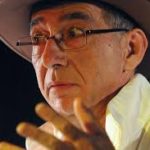 Pier Giorgio Di Cicco (1949―2019) is the former Poet Laureate of Toronto. This poem is from his collection Names of Blessing, and reflects Paul’s words in Ephesians 2:4 ff.
Pier Giorgio Di Cicco (1949―2019) is the former Poet Laureate of Toronto. This poem is from his collection Names of Blessing, and reflects Paul’s words in Ephesians 2:4 ff.Posted: 27 January 2021
-
Come, My Soul, Thy Suit Prepare by John Newton
Come, My Soul, Thy Suit Prepare
Come, my soul, thy suit prepare;
Jesus loves to answer prayer:
He Himself has bid thee pray,
Therefore will not say thee nay.Thou art coming to a King,
Large petitions with thee bring;
For his grace and power are such,
None can ever ask too much.With my burden I begin;
Lord, remove this load of sin;
Let Thy blood, for sinners spilt,
Set my conscience free from guilt.Lord, I come to Thee for rest;
Take possession of my breast;
There Thy blood-bought right maintain,
And without a rival reign.As the image in the glass
Answers the beholder’s face;
Thus unto my heart appear,
Print Thine own resemblance there.While I am a pilgrim here,
Let Thy love my spirit cheer;
As my Guide, my Guard, my Friend,
Lead me to my journey’s end.Show me what I have to do,
every hour my strength renew:
let me live a life of faith,
let me die thy people’s death.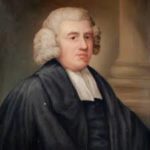 John Newton (1725–1807) wrote perhaps the world’s most-famous hymn, “Amazing Grace.” He went from being a slave ship captain to being a prominent abolitionist. The above hymn reflects Paul’s thoughts from Ephesians 3:8.
John Newton (1725–1807) wrote perhaps the world’s most-famous hymn, “Amazing Grace.” He went from being a slave ship captain to being a prominent abolitionist. The above hymn reflects Paul’s thoughts from Ephesians 3:8.Posted: 20 January 2021
-
Hierarchy by Marjorie Maddox
Hierarchy
———-Ephesians 1:2; 3:7, 8, 13-15, 20
Less than
Paul’s less than
the least of all saints,I full-swoon tribulations,
melodramatically tumble off
the pedestals of grace,arrive sprawled and spread-eagled
in the Victorian-style parlor
of “Peace be with you.”Cut off at my once-bowed knees,
I’ve lost sight of any inner woman
in need of strengthening what oncewas Sabbath-strong by the effectual power
of His working but now in need
of stones and less than———-his less than
——————–the least of all saints
full swoon——————tumbling———-cut off
less than
———-Paul’s less thanunable to do exceeding abundantly
———-the least.
——————–Peace be withall the less than’s,
grace fainting daily
into Amen,———-into above all
that we ask,
———-cry, think;grace be to you the less-than’s, the
broken, and daily pieces of peace. Marjorie Maddox is director of Loch Haven University’s Creative Writing Program. Her most-recent books include Inside Out: Poems on Writing and Reading Poems (2020, Kelsay), and the children’s book I’m Feeling Blue, Too! (2020, Wipf & Stock). This poem previously appeared in Mockingbird.
Marjorie Maddox is director of Loch Haven University’s Creative Writing Program. Her most-recent books include Inside Out: Poems on Writing and Reading Poems (2020, Kelsay), and the children’s book I’m Feeling Blue, Too! (2020, Wipf & Stock). This poem previously appeared in Mockingbird.Posted: 13 January 2021
-
Soldiers of Christ, Arise by Charles Wesley
Soldiers Of Christ, Arise
Soldiers of Christ, arise,
and put your armour on,
strong in the strength which God supplies
through his eternal Son.
Strong in the Lord of hosts,
and in his mighty power,
who in the strength of Jesus trusts
is more than conqueror.Stand then in his great might,
with all his strength endued;
but take, to arm you for the fight,
the panoply of God.
Leave no unguarded place,
no weakness of the soul;
take every virtue, every grace,
and fortify the whole.To keep your armour bright,
attend with constant care;
still walking in your Captain’s sight,
and watching unto prayer.
From strength to strength go on;
wrestle and fight and pray;
tread all the powers of darkness down,
and win the well-fought day.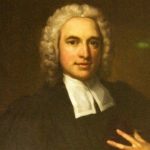 Charles Wesley (1707–1788) was the most-popular hymn writer of his day. Together with his brother John, they were central figures in the Methodist movement which swept Britain. These lyrics rose out of Ephesians 6:10-18.
Charles Wesley (1707–1788) was the most-popular hymn writer of his day. Together with his brother John, they were central figures in the Methodist movement which swept Britain. These lyrics rose out of Ephesians 6:10-18.Posted: 06 January 2021
-
O God Of Earth And Altar by G.K. Chesterton
O God Of Earth And Altar
O God of earth and altar,
bow down and hear our cry,
our earthly rulers falter,
our people drift and die;
the walls of gold entomb us,
the swords of scorn divide,
take not thy thunder from us,
but take away our pride.From all that terror teaches,
from lies of tongue and pen,
from all the easy speeches
that comfort cruel men,
from sale and profanation
of honour, and the sword,
from sleep and from damnation,
deliver us, good Lord!Tie in a living tether
the prince and priest and thrall,
bind all our lives together,
smite us and save us all;
in ire and exultation
aflame with faith, and free,
lift up a living nation,
a single sword to thee. G.K. Chesterton (1874―1936) is an important Christian intellectual, known for his fiction including The Man Who Was Thursday (1908), and his popular mystery stories featuring Father Brown (a character misappropriated by a recent TV series). This poem echoes Ephesians 5:6-14, and many other passages.
G.K. Chesterton (1874―1936) is an important Christian intellectual, known for his fiction including The Man Who Was Thursday (1908), and his popular mystery stories featuring Father Brown (a character misappropriated by a recent TV series). This poem echoes Ephesians 5:6-14, and many other passages.Posted: 30 December 2020
-
First Coming by Madeleine L’Engle
First Coming
He did not wait till the world was ready,
till men and nations were at peace.
He came when the Heavens were unsteady,
and prisoners cried out for release.He did not wait for the perfect time.
He came when the need was deep and great.
He dined with sinners in all their grime,
turned water into wine.He did not wait till hearts were pure.
In joy he came to a tarnished world of sin and doubt.
To a world like ours, of anguished shame
he came, and his Light would not go out.He came to a world which did not mesh,
to heal its tangles, shield its scorn.
In the mystery of the Word made Flesh
the Maker of the stars was born.We cannot wait till the world is sane
to raise our songs with joyful voice,
for to share our grief, to touch our pain,
He came with Love: Rejoice! Rejoice! Madeleine L’Engle (1918—2007) is best known for her Newbery Medal winning novel A Wrinkle in Time. Although she may not have been specifically thinking of Ephesians 3:4-6 when she wrote this poem, the “mystery” spoken of here is one and the same.
Madeleine L’Engle (1918—2007) is best known for her Newbery Medal winning novel A Wrinkle in Time. Although she may not have been specifically thinking of Ephesians 3:4-6 when she wrote this poem, the “mystery” spoken of here is one and the same.Posted: 23 December 2020
-
Eternal by Pat Connors
Eternal
“…and grace will lead me home.”
Amazing Grace, John NewtonUnder grey November skies
which winter follows close behindthe leader of the free world
will not admit he lost the electionthe premier of Ontario sacrifices
our health to feed the machineand a 12-year-old boy out with his mother
is shot dead in gangster crossfire.For the love of God, which we can’t earn
we must resist the powers of darknessuntil the end of their unfolding
becomes the beginning of true light.In a world where a beautiful boy
paid for sins he didn’t commitlet us hold him close in our hearts
and leave the rest to the Lord. Pat Connors’ first chapbook, Scarborough Songs, was published by Lyricalmyrical Press in 2013. His first full manuscript, The Other Life, is about to be released by Mosaic Press. He mentions several Ephesians passages as having influenced “Eternal” (1:7, 2:2, 4:18, 5:2, and 5:8).
Pat Connors’ first chapbook, Scarborough Songs, was published by Lyricalmyrical Press in 2013. His first full manuscript, The Other Life, is about to be released by Mosaic Press. He mentions several Ephesians passages as having influenced “Eternal” (1:7, 2:2, 4:18, 5:2, and 5:8).Posted: 16 December 2020
-
Prayer by Andrew Lansdown
Prayer
remembering you in my prayers – Ephesians 1:16
Oh, for my mother in her pain,
Almighty and all-loving Lord,
I come to plead with you again.For years her body’s been a bane
That’s put all gladness to the sword:
Oh, for my mother in her pain!Too much misery makes a stain
To black all light and block all laud:
I come to plead with you again.Today at least relieve the strain
And give reprieve as a reward,
Oh, for my mother in her pain.I know there is no other Name.
Despite the fact my faith is flawed,
I come to plead with you again.Although my many sins maintain
That I deserve to be ignored—
Oh, for my mother in her pain
I come to plead with you again!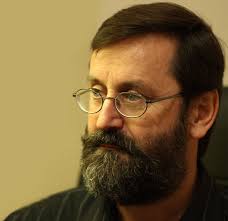 Andrew Lansdown is a major Australian poet. This poem appears in his new book Abundance: New & Selected Poems (Poiema/Cascade) which just appeared on December 1st. I am honoured to have worked with Andrew on editing this collection.
Andrew Lansdown is a major Australian poet. This poem appears in his new book Abundance: New & Selected Poems (Poiema/Cascade) which just appeared on December 1st. I am honoured to have worked with Andrew on editing this collection.Posted: 09 December 2020
-
Even So, God by Kaitlyn Hogeterp
Even So, God
am i dead,
suffocated
stiff &
still?am i paralyzed,
senseless
stolid &
enslaved?am i a stone,
lifeless
callous &
chilled?full of error,
empty of truth,
a shrivelling shell—am i?
even so, God breathes &
lifeless souls
waken,
ready
as he calls them
by name.am i?
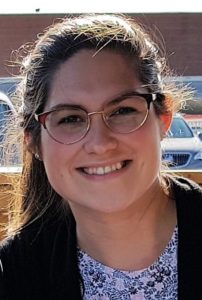 Kaitlyn Hogeterp is a 4th year English Writing student at Redeemer University, in Ancaster, Ontario. She was born and raised in rural Nova Scotia ― and has been forced by the pandemic to pursue her studies online. “Even so, God” is based on Ephesians 2:1-6.
Kaitlyn Hogeterp is a 4th year English Writing student at Redeemer University, in Ancaster, Ontario. She was born and raised in rural Nova Scotia ― and has been forced by the pandemic to pursue her studies online. “Even so, God” is based on Ephesians 2:1-6.Posted: 02 December 2020
-
Religio Laici by John Dryden
from Religio Laici or A Layman’s Faith
Dim, as the borrow’d beams of moon and stars
To lonely, weary, wand’ring travellers,
Is reason to the soul; and as on high,
Those rolling fires discover but the sky
Not light us here; so reason’s glimmering ray
Was lent not to assure our doubtful way,
But guide us upward to a better day.
And as those nightly tapers disappear
When day’s bright lord ascends our hemisphere
So pale grows reason at religion’s sight:
So dies, and so dissolves in supernatural light.
Some few, whose lamp shone brighter, have been led
From cause to cause, to Nature’s secret head;
And found that one first principle must be:
But what, or who, that Universal He;
Whether some soul incompassing this ball
Unmade, unmov’d; yet making, moving all;
Or various atoms’ interfering dance
Leapt into form (the noble work of chance;)
Or this great all was from eternity;
Not even the Stagirite himself could see;
And Epicurus guess’d as well as he:
As blindly grop’d they for a future state;
As rashly judg’d of Providence and Fate:
But least of all could their endeavours find
What most concern’d the good of human kind.
For happiness was never to be found;
But vanish’d from ’em, like enchanted ground.
One thought content the good to be enjoy’d:
This, every little accident destroy’d:
The wiser madmen did for virtue toil:
A thorny, or at best a barren soil:
In pleasure some their glutton souls would steep;
But found their line too short, the well too deep;
And leaky vessels which no bliss could keep.
Thus anxious thoughts in endless circles roll,
Without a centre where to fix the soul:
In this wild maze their vain endeavours end:
How can the less the greater comprehend?
Or finite reason reach infinity?
For what could fathom God were more than He.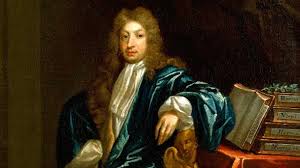 John Dryden (1631―1700), the leading poet and literary critic of Restoration England, in Religio Laici (1682) expresses our reason’s insufficiency to lead us to salvation, which is expressed well in Ephesians 1:9. These are the first 41 lines of Dryden’s 456-line poem.
John Dryden (1631―1700), the leading poet and literary critic of Restoration England, in Religio Laici (1682) expresses our reason’s insufficiency to lead us to salvation, which is expressed well in Ephesians 1:9. These are the first 41 lines of Dryden’s 456-line poem.Posted: 25 November 2020
-
A Helpmeet For Him by Christina Rossetti
A Helpmeet For Him
Woman was made for man’s delight,―
Charm, O woman! Be not afraid!
His shadow by day, his moon by night,
Woman was made.Her strength with weakness is overlaid;
Meek compliances veil her might;
Him she stays, by whom she is stayed.World-wide champion of truth and right,
Hope in gloom, and in danger aid,
Tender and faithful, ruddy and white,
Woman was made.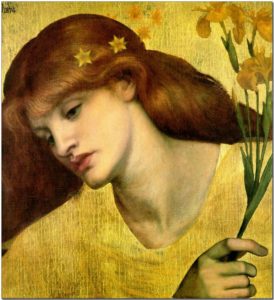 Christina Rossetti (1830—1894) is one of the best-known English poets of the nineteenth century. This poem embodies the poet’s wrestling with Paul’s teaching on women in Ephesians 5.
Christina Rossetti (1830—1894) is one of the best-known English poets of the nineteenth century. This poem embodies the poet’s wrestling with Paul’s teaching on women in Ephesians 5.Posted: 18 November 2020
-
The Whole Shebang by Helen Freeman
The Whole Shebang
Ephesians 1:9-10
rococo sky puzzle
with no missing pieces
Grandma’s orange opals
regathered and restrung
all my broken bones
fused into wholeness
off-tone trombonist
harmonious again
in full-blown orchestra
excelling in her solo
savannah species
at the waterhole lapping
surprisingly together
not red in tooth or claw
tapestry threads sown
knotted and turned
over for the noble reveal
a warm coat shackles
sprung vision in focus
clearer than a telescope
the whole household
aligned with places set
not one missing not one
tension cream lavished
on exotic fruit salads
no weeds in wheat fields
no riverbanks bursting
enemies shaking hands
the entire world kneeling
the whole-hearted yes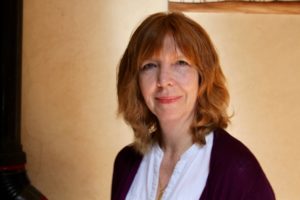 Helen Freeman was born in Kenya and spent many years in East Africa and the Arabian Gulf. She recently moved to Durham, England. Her poetry has appeared in Red River Review, Barren Magazine, Ekphrastic Review and other publications. Her instagram page is @chemchemi.hf
Helen Freeman was born in Kenya and spent many years in East Africa and the Arabian Gulf. She recently moved to Durham, England. Her poetry has appeared in Red River Review, Barren Magazine, Ekphrastic Review and other publications. Her instagram page is @chemchemi.hfPosted: 11 November 2020
-
anniversary by Marianne Jones
anniversary
Ephesians 5:25
his love
the air I breathe
permeates my clothing
skin absorbs
like perfume
droplets cling, liquid
and flesh commingling.
he floats over me, wraps like warm mist.my house sings jazz.
 Marianne Jones lives in Thunder Bay, Ontario, and was named Christian Poet Laureate 2012 by Utmost Christian Writers. Her poetry collection Here, on the Ground was a winner at the 2011 Word Awards. Her literary novel, Maud and Me, is slated for publication in 2021 by Crossfield Publishing.
Marianne Jones lives in Thunder Bay, Ontario, and was named Christian Poet Laureate 2012 by Utmost Christian Writers. Her poetry collection Here, on the Ground was a winner at the 2011 Word Awards. Her literary novel, Maud and Me, is slated for publication in 2021 by Crossfield Publishing.Posted: 04 November 2020
-
This Present Darkness by Catherine Chandler
This Present Darkness
This present darkness
has so far devoured three seasons.
It hovers still. It looms.It is poised and ready
to swallow another—
the imminent winter.And so . . .
I don the belt of truth
and see grace
in the geese’s awkward descent
onto the sand-pit pond.I don the breastplate of righteousness
and find harmony
in the rusty-wheel screeching
of the blue jays.I don the shield of faith
and sense peace
in the earthy smell
of a leaf pile.I don the helmet of salvation
and taste beauty
in the first snowflakes melting
on my tongue.I don the sword of the Spirit
and feel the immeasurable love
of a grandchild’s kiss
through a cell phone screen.This present darkness
cannot last forever.
I have put on the full armor
of God.— Saint-Lazare, Québec, October 26, 2020
 Catherine Chandler is a Canadian poet whose latest collection Pointing Home came out in 2019. She wrote this poem this week for Poems For Ephesians based on Ephesians 6. This week’s post at Kingdom Poets also features Catherine Chandler.
Catherine Chandler is a Canadian poet whose latest collection Pointing Home came out in 2019. She wrote this poem this week for Poems For Ephesians based on Ephesians 6. This week’s post at Kingdom Poets also features Catherine Chandler.Posted: 28 October 2020
-
The Puzzle by Tehillah Presado
The Puzzle
Sun beams
into the living room
where jigsaw pieces are scattered
across the floor.Colour schemes and corners
purposefully placed
in sections where most
understood.Some pieces have
splashes of fuchsia, rose and golden yellow,
others with hints of greens
or stone silver with blues.A rich Victorian garden,
abundant in daisies and lilies
dances across the box cover.
Vines have wrapped around benches,
where a couple chats and laughs.A stone fountain stands center
flowing diligently.
The blues of the water
reflect the fairness of the sky,
without a cloud in sight.Each piece has its own place,
contributing to the unity,
the complete picture,
like the body of Christ. Tehillah Presado is a recent graduate from Université de Saint-Boniface with a double major in French and Psychology. She lives with her family in Winnipeg. Her poem is based on Ephesians 4 emphasising the unity of the body of Christ. She completed a writing intensive in August through The Word Guild with D.S. Martin.
Tehillah Presado is a recent graduate from Université de Saint-Boniface with a double major in French and Psychology. She lives with her family in Winnipeg. Her poem is based on Ephesians 4 emphasising the unity of the body of Christ. She completed a writing intensive in August through The Word Guild with D.S. Martin.Posted: 21 October 2020
-
Jerusalem ― The Emanation of the Giant Albion by William Blake
from Jerusalem ― The Emanation of the Giant Albion
I see the Four-fold Man. The Humanity in deadly sleep
And its fallen Emanation. The Spectre & its cruel Shadow.
I see the Past, Present & Future, existing all at once
Before me; O Divine Spirit sustain me on thy wings!
That I may awake Albion from his long & cold repose.
For Bacon & Newton sheathd in dismal steel, their terrors hang
Like iron scourges over Albion. Reasonings like vast Serpents
Infold around my limbs, bruising my minute articulationsI turn my eyes to the Schools & Universities of Europe
And there behold the Loom of Locke whose Woof rages dire
Washed by the water-wheels of Newton. black the cloth
In heavy wreathes over every Nation; cruel Works
Of many Wheels I view, wheel without wheel, with cogs tyrannicMoving by compulsion each other: not as those in Eden: which
Wheel within Wheel in freedom revolve in harmony & peace.Awake! Awake O sleeper in the land of shadows, wake! expand!
I am in you and you in me, mutual in love divine:
Fibres of love from man to man thro Albions pleasant land.But the perturbed Man away turns down the valleys dark;
Phantom of the over heated brain! Shadow of immortality!
Seeking to keep my soul a victim to thy Love! Which binds
Man the enemy of man into deceitful friendships;
Jerusalem is not! Her daughters are indefinite;
By demonstration, man alone can live, and not by faith.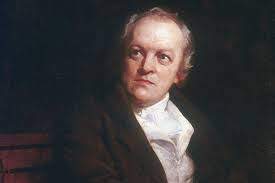 In this extended poem, Blake represents England as Albion ― a sleeper in the grips of industrialism and imperialism ― who needs to awake to Jesus. According to Malcolm Guite, this is a call for national repentance, which echoes Ephesians 5:14. However, at this point in the poem, Albion turns away. Later, it’s foretold how Albion repents and bows before Christ.
In this extended poem, Blake represents England as Albion ― a sleeper in the grips of industrialism and imperialism ― who needs to awake to Jesus. According to Malcolm Guite, this is a call for national repentance, which echoes Ephesians 5:14. However, at this point in the poem, Albion turns away. Later, it’s foretold how Albion repents and bows before Christ.Posted: 14 October 2020
-
Beloved by Bonnie Beldan-Thomson
Beloved
“…the riches of his grace that he lavished on us…” Ephesians 1:7b, 8a
My friend’s garden rabbits were birthed
behind her deck in the shelter
of scented geraniums. She watched
them, all eight of them, kicking
their little legs as they nursed.Mine descended like a scruffy plague, eating
my euonymous down to dry twigs,
decimating emerging daffodils,
stalking my bean stalks, waiting
for a delicious surge of maturity
before devouring, then
waiting for leaves to grow
into another good meal.
I shouted Go away, envying
Mr MacGregor’s solution.
Finally, the plants gave up
and so did I.But an adolescent amused me,
practicing laps around my asparagus
before taking off after a chipmunk.
Others disarmed me, hopping, then stopping
to be sure I was still chasing them.Babies snuggled under hosta leaves.
Adults snoozed in my potato patch,
shaded by gooseberry and josta,
legs outstretched, head resting,
rousing after awhile for a dirt bath,
scattering earth onto the lawn.Then one evening, as I admired
scarlet bee balm and a thicket
of yellow, orange and red echinacea,
planning plants to complete my creation,
a young rabbit kept its eyes on me
as it crept closer, then settled down,
an arms’ length away, to nibble grass.
I surrendered.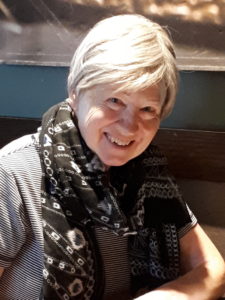 Bonnie Beldan-Thomson lives near Toronto. Her poetry, fiction and non-fiction have appeared in a variety of publications throughout North America and internationally. She is a recent participant in a writing intensive with D.S. Martin, as part of The Word Guild’s annual conference ― Write Canada.
Bonnie Beldan-Thomson lives near Toronto. Her poetry, fiction and non-fiction have appeared in a variety of publications throughout North America and internationally. She is a recent participant in a writing intensive with D.S. Martin, as part of The Word Guild’s annual conference ― Write Canada.Posted: 07 October 2020
-
Walking the Dog on Windy Night under a Full Moon by Susan Alexander
Walking the Dog on Windy Night under a Full Moon
The trees are wrestling.
Their hinges creak open and closed.
On the white road under our feet,shadows brawl and we are pushed
towards the cul-de-sac –
the turning point.What is it
to fill, to be filled into fullness?
Moon face glares downwhile a hundred arms thrash.
Black fingers rake
the lit road, search for troubledcreeds to buffet and twist,
to sift, rattle and split,
to explodeprodigiously –
schema of sky littered
on blacktop just behind. Susan Alexander lives on Bowen Island, B.C. Her second poetry collection, Nothing You Can Carry is newly launched this fall from Thistledown Books. In 2019 she won the prestigious Mitchell Poetry Prize. This poem arises from Paul’s phrase “every wind of doctrine” in Ephesians 4:14.
Susan Alexander lives on Bowen Island, B.C. Her second poetry collection, Nothing You Can Carry is newly launched this fall from Thistledown Books. In 2019 she won the prestigious Mitchell Poetry Prize. This poem arises from Paul’s phrase “every wind of doctrine” in Ephesians 4:14.Posted: 30 September 2020
-
This Battle Born by Lynne Collier
This Battle Born
Ephesians 6:12-18, NIV
We fight not flesh and blood—
crashing swords crushing our shields,
severing bone from sinew.This battle is born from the depths of the earth
where scheming demons scream eternal damnation.
We rage against the rulers authorities
and dark powers of this world
against spiritual forces of evil in heavenly realms.The armour of man cold and lifeless
frays decays to a whisper
against such foes.Truth holds battle gear in place for virtuous warriors
who stand ready to fight for peace—
their shields extinguish flaming arrows
as their faithful hearts call out like a sweet aroma rising.
These more powerful weapons
prevail for their king.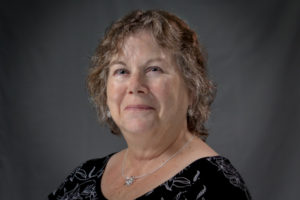 Lynne Collier was born in West Yorkshire, and now lives near Bowmanville, Ontario. Her memoir about raising a child with autism is called, Raising Benjamin Frog. She is a recent participant in a writing intensive with D.S. Martin.
Lynne Collier was born in West Yorkshire, and now lives near Bowmanville, Ontario. Her memoir about raising a child with autism is called, Raising Benjamin Frog. She is a recent participant in a writing intensive with D.S. Martin.Posted: 23 September 2020
-
Crucifixion: Jesus is nailed to the cross by Malcolm Guite
Crucifixion: Jesus is nailed to the cross
See, as they strip the robe from off his back
And spread his arms and nail them to the cross,
The dark nails pierce him and the sky turns black,
And love is firmly fastened onto loss.
But here a pure change happens. On this tree
Loss becomes gain, death opens into birth.
Here wounding heals and fastening makes free
Earth breathes in heaven, heaven roots in earth.
And here we see the length, the breadth, the height
Where love and hatred meet and love stays true
Where sin meets grace and darkness turns to light
We see what love can bear and be and do,
And here our saviour calls us to his side
His love is free, his arms are open wide.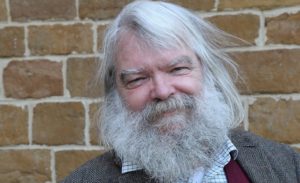 Malcolm Guite teaches at the Faculty of Divinity at Cambridge University, and is chaplain at Girton College. This poem is from the series The Stations of the Cross from his book Sounding the Seasons (2012, Canterbury Press). Besides the imagery of Christ’s crucifixion, it alludes to Ephesians 3:18. It is included here with the author’s permission. (malcolmguite.wordpress.com)
Malcolm Guite teaches at the Faculty of Divinity at Cambridge University, and is chaplain at Girton College. This poem is from the series The Stations of the Cross from his book Sounding the Seasons (2012, Canterbury Press). Besides the imagery of Christ’s crucifixion, it alludes to Ephesians 3:18. It is included here with the author’s permission. (malcolmguite.wordpress.com)Posted: 16 September 2020
-
Noise by Jane Harris
Noise
Based on Ephesians 4:17-19
Crows mock each other on the fence
like radio prophets or tweeting activists,
caw, caw, cawing:You’ll never be what you hoped,
that unspeakable thing still cages you
like a wren trapped in a gardener’s net,
staring at strawberries forever outside your reach.So much noise.
They don’t know
since the day the wind’s singing set elm leaves dancing,
like puppies set free in a park,
I’ve climbed over cactusy hills, picking my own wildberries,I wrap myself in a white wool coat to hike to the river when
—–the snowflakes fly,
and I dance through the winter like young coyotes do:
Boundless.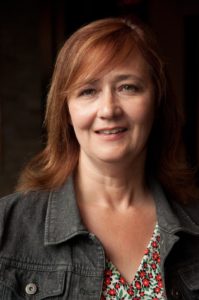 Jane Harris lives in Lethbridge, Alberta. She is the author of Finding Home in the Promised Land: A Personal History of Homelessness and Social Exile (J Gordon Shillingford, 2015, Signature Editions, 2016). She is a recent participant in a writing intensive with D.S. Martin.
Jane Harris lives in Lethbridge, Alberta. She is the author of Finding Home in the Promised Land: A Personal History of Homelessness and Social Exile (J Gordon Shillingford, 2015, Signature Editions, 2016). She is a recent participant in a writing intensive with D.S. Martin.Posted: 09 September 2020
-
Q&A with Clock by Greg Huteson
Q&A with Clock
Cuckoo, time’s monger,
raucously hawking your wares,
why crack the stifling air
with your close-reckoned cries,
your minute ticks and chittering?
Whistling while you work,
you jar our sheltered days.
Are you a tocsin of tedium’s terrors
or a harbinger of the eighth day
and a new winding? Greg Huteson’s poems have appeared in or are forthcoming from The Road Not Taken, Modern Age, the Saint Katherine Review, Better Than Starbucks, The Honest Ulsterman and various other journals. He’s worked in East Asia as a missionary for more than twenty years. This poem was influenced by Ephesians 5:16’s “redeeming the time.”
Greg Huteson’s poems have appeared in or are forthcoming from The Road Not Taken, Modern Age, the Saint Katherine Review, Better Than Starbucks, The Honest Ulsterman and various other journals. He’s worked in East Asia as a missionary for more than twenty years. This poem was influenced by Ephesians 5:16’s “redeeming the time.”Posted: 02 September 2020
-
Wilt Thou Love God as He Thee? by John Donne
Wilt Thou Love God as He Thee?
Wilt thou love God as He thee? Then digest,
My soul, this wholesome meditation,
How God the Spirit, by angels waited on
In heaven, doth make His temple in thy breast.
The Father having begot a Son most blest,
And still begetting—for he ne’er begun—
Hath deign’d to choose thee by adoption,
Co-heir to His glory, and Sabbath’s endless rest.
And as a robb’d man, which by search doth find
His stolen stuff sold, must lose or buy it again,
The Sun of glory came down, and was slain,
Us whom He had made, and Satan stole, to unbind.
’Twas much, that man was made like God before,
But, that God should be made like man, much more. John Donne (1572—1631) although not esteemed enough in his own day, has now been established as one of the English language’s greatest poets. This poem, known as Holy Sonnet #15, links with passages in Paul’s epistles such as Ephesians 1:5, and Ephesians 3:6.
John Donne (1572—1631) although not esteemed enough in his own day, has now been established as one of the English language’s greatest poets. This poem, known as Holy Sonnet #15, links with passages in Paul’s epistles such as Ephesians 1:5, and Ephesians 3:6.Posted: 26 August 2020
-
Ode to the Pulse by Crystal Hurd
Ode to the Pulse
Ephesians 2:10: “For we are God’s workmanship”
Gentle throb,
tributaries of turquoise,
veins, poetic
meters of stressed
syllables buried inside
temples and neck,
wrists and elbows,
groin and knees,
down to the tops of your feet.
Throughout the complete
territory of your body,
below strata of skin and bone,
is this sacred tempo.
Beloved metronome,
pacing an arc through
air, like through body,
subtle thump and
reassurance. Remember
the blackness of unconsciousness
and the hard grasp of your wrist,
the shriek of voices and the
calm when the stranger found it,
the dull rhythm of existence,
the percussion in your chest,
Still present.
It thrums on uninterrupted.
Through light and darkness,
feel this small reminder
of your place on a large, weary planet.
And in your final hours,
place two wrinkled fingers
aside the stem of your neck
and find it there,
consistent carotid beneath
the wild maze of your fingertips.And be satisfied.
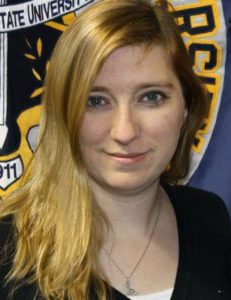 Crystal Hurd has just been awarded the 2020 Clyde S. Kilby Research Grant by the Marion E. Wade Center at Wheaton College to complete research for her book on the artistic impact of C. S. Lewis’s family titled Bookish, Clever People. She has written extensively about C.S. Lewis, and is Reviews Editor for Sehnsucht: The C. S. Lewis Journal.
Crystal Hurd has just been awarded the 2020 Clyde S. Kilby Research Grant by the Marion E. Wade Center at Wheaton College to complete research for her book on the artistic impact of C. S. Lewis’s family titled Bookish, Clever People. She has written extensively about C.S. Lewis, and is Reviews Editor for Sehnsucht: The C. S. Lewis Journal.Posted: 19 August 2020
-
Yet Do I Marvel by Countee Cullen
Yet Do I Marvel
I doubt not God is good, well-meaning, kind
And did He stoop to quibble could tell why
The little buried mole continues blind,
Why flesh that mirrors Him must some day die,
Make plain the reason tortured Tantalus
Is baited by the fickle fruit, declare
If merely brute caprice dooms Sisyphus
To struggle up a never-ending stair.
Inscrutable His ways are, and immune
To catechism by a mind too strewn
With petty cares to slightly understand
What awful brain compels His awful hand.
Yet do I marvel at this curious thing:
To make a poet black, and bid him sing!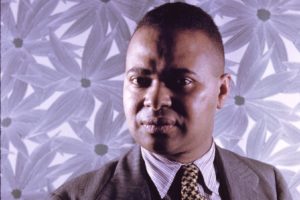 Countee Cullen (1903—1946) is one of the most important poets of the 1920s’ Harlem Renaissance. In this poem he demonstrates the same confidence in God’s inscrutable wisdom that Paul does in Ephesians 1:3-10.
Countee Cullen (1903—1946) is one of the most important poets of the 1920s’ Harlem Renaissance. In this poem he demonstrates the same confidence in God’s inscrutable wisdom that Paul does in Ephesians 1:3-10.Posted: 12 August 2020
-
patience by Jonathan Chan
patience
i sat in quiet so i could learn to pray
to learn again a native eloquence
the gaps in what is said and left unsaid
the wordless groans that could not find their shape.
i sat in stillness for i tried to tame
the errant flickers of a wandering mind,
to quell the fidgeting of anxious flesh,
to learn again to hear His still small voice.
when silence was the crucible of doubt
and prayers wafted loftily like smoke,
when starlight painted avenues to home
and aching feet tread on a patchy road,
i learned that waiting was in the becoming
and held the words that never were my own. Jonathan Chan is a recent graduate of the University of Cambridge where he read for a degree in English. He was raised, and is currently based, in Singapore. This poem is from a series he has written about the Fruit of the Spirit (Galatians 5) and it relates to Ephesians 4:2.
Jonathan Chan is a recent graduate of the University of Cambridge where he read for a degree in English. He was raised, and is currently based, in Singapore. This poem is from a series he has written about the Fruit of the Spirit (Galatians 5) and it relates to Ephesians 4:2.Posted: 05 August 2020
-
Lack of Faith by Anna Kamieńska
Lack Of Faith
Yes
even when I don’t believe
there is a place in me
inaccessible to unbelief
a patch of wild grace
a stubborn preserve
impenetrable
pain untouched sleeping in the body
music that builds its nest in silence Anna Kamieńska (1920–1986) is a Polish poet. In this poem she touches on the mysterious contribution Christ himself provides for us in stirring up faith within us, as suggested by Ephesians 4:7 and 13.
Anna Kamieńska (1920–1986) is a Polish poet. In this poem she touches on the mysterious contribution Christ himself provides for us in stirring up faith within us, as suggested by Ephesians 4:7 and 13.Posted: 29 July 2020
-
Struck by Rena Ong
Struck
Ephesians 2:4-6
The lightning bolt of mercy
surges through the darkened soul.
Its current seeks and transforms, pulsating,
to change the What Was to the realms of What Can Be.
Nerves tingle and prickle, and in a flash,
the sparkling soul is raised within its atmospheric glory,
full of light and truly alive.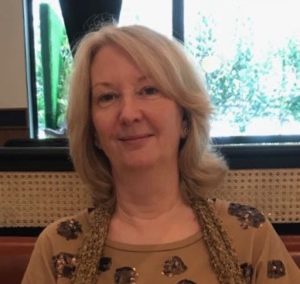 Rena Ong is from England, yet has lived in Singapore for many years with her Singaporean husband. Their adult son lives in Australia. In recent years, God has renewed her love of Christ and has grown a creative spirit within her.
Rena Ong is from England, yet has lived in Singapore for many years with her Singaporean husband. Their adult son lives in Australia. In recent years, God has renewed her love of Christ and has grown a creative spirit within her.Posted: 22 July 2020
-
Battle Prep by Chris Barnes
Battle Prep
Trumpets blare, alarms sound, bells ring; enemy at the threshold.
Praying for serenity calms my anxiety at the call to arms.
Swinging legs over cot sides, my feet slide into combat boots made ready with laces undone, tongues out for a hasty departure. Boots, foundations of armor, bring restless minds to peaceful focus for the coming battle.
Praying for quiet understanding concentrates my energy.
Swaying my hips side to side, tactical straps laden with tools weave rapidly through fabric loops. Belts maintain a sturdy core, presenting a disciplined truth.
Praying for certainty ensures my confidence for action.
Flinging arms overhead, my shoulders accept the bulky, bulletproof guardian prepped with combat equipment. Body armor, defender of vital organs and morality, conveys the significance of our just and righteous stance.
Praying for honorable conflict helps me face issues of right and wrong.
Steadying my neck muscles, a concave protector settles to the crown, held tight by jawline straps. The helmet offers timely rescue from unruly fragments; salvation shelters the brain and soul.
Praying for deliverance rests my soul after long days of fighting.
Beseeching physical strength, my weary hands overload with protective gear. The spiritual melee is only met and turned back by the faithful shield and slashing sword.
Praying for swift resolution diminishes swirling thoughts that entangle me in constant conflict.
Accepting light to fight darkness, my soul safeguarded from the Devil’s onslaught, my vanguard dispensing spiritual defeat upon the adversary;
Stand firm, stand steady, stand strong – and pray continuously.
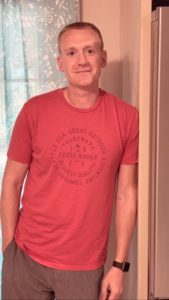 Chris Barnes is transitioning from nearly 20 years of service in the U.S. Air Force. He began writing as a means to moderate his combat-related Post-Traumatic Stress Disorder, and has continued this as a passion, to relay life experiences through poetry. “Battle Prep” relates to Ephesians 6: 10-18.
Chris Barnes is transitioning from nearly 20 years of service in the U.S. Air Force. He began writing as a means to moderate his combat-related Post-Traumatic Stress Disorder, and has continued this as a passion, to relay life experiences through poetry. “Battle Prep” relates to Ephesians 6: 10-18.Posted: 15 July 2020
-
Footnote To All Prayers by C.S. Lewis
Footnote To All Prayers
He whom I bow to only knows to whom I bow
When I attempt the ineffable Name, murmuring Thou,
And dream of Pheidian fancies and embrace in heart
Symbols (I know) which cannot be the thing Thou art.
Thus always, taken at their word, all prayers blaspheme
Worshipping with frail images a folk-lore dream,
And all men in their praying, self-deceived, address
The coinage of their own unquiet thoughts, unless
Thou in magnetic mercy to Thyself divert
Our arrows, aimed unskilfully, beyond desert;
And all men are idolaters, crying unheard
To a deaf idol, if Thou take them at their word.Take not, O Lord, our literal sense. Lord, in thy great
Unbroken speech our limping metaphor translate.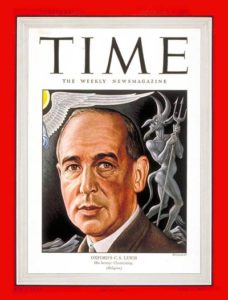 C.S. Lewis (1898―1963) just might be the most influential Christian of the twentieth century. This poem adds an insightful accompaniment to what Paul says in Ephesians 3:12, and to other instructions in the epistle.
C.S. Lewis (1898―1963) just might be the most influential Christian of the twentieth century. This poem adds an insightful accompaniment to what Paul says in Ephesians 3:12, and to other instructions in the epistle.Posted: 08 July 2020
-
Choruses from ‘The Rock’ by T.S. Eliot
from Choruses from ‘The Rock’ ― I
The Eagle soars in the summit of Heaven,
The Hunter with his dogs pursues his circuit.
O perpetual revolution of configured stars,
O perpetual recurrence of determined seasons,
O world of spring and autumn, birth and dying!
The endless cycle of idea and action,
Endless invention, endless experiment,
Brings knowledge of motion, but not of stillness;
Knowledge of speech, but not of silence;
Knowledge of words, and ignorance of the Word.
All our knowledge brings us nearer to our ignorance,
All our ignorance brings us nearer to death,
But nearness to death no nearer to God .
Where is the Life we have lost in living?
Where is the wisdom we have lost in knowledge?
Where is the knowledge we have lost in information?
The cycles of Heaven in twenty centuries
Bring us farther from God and nearer to the Dust.
 T.S. Eliot (1888—1965) is one of the most influential poets of the twentieth century. The preceding is the opening of the first section of his 1934 book Choruses from ‘The Rock.’ The loss of wisdom in the pursuit of knowledge and information, as expressed by Eliot, is the hollow reversal of what Paul says in Ephesians 1:7-10 ― “With all wisdom and understanding, [God] made known to us the mystery of his will according to his good pleasure, which he purposed in Christ…”
T.S. Eliot (1888—1965) is one of the most influential poets of the twentieth century. The preceding is the opening of the first section of his 1934 book Choruses from ‘The Rock.’ The loss of wisdom in the pursuit of knowledge and information, as expressed by Eliot, is the hollow reversal of what Paul says in Ephesians 1:7-10 ― “With all wisdom and understanding, [God] made known to us the mystery of his will according to his good pleasure, which he purposed in Christ…”Posted: 01 July 2020
-
Sabbaths 1985 ― II by Wendell Berry
Sabbaths 1985 ― II
A gracious Sabbath stood here while they stood
Who gave our rest a haven.
Now fallen, they are given
To labor and distress.
These times we know much evil, little good
To steady us in faith
And comfort when our losses press
Hard on us, and we choose,
In panic or despair or both,
To keep what we will lose.For we are fallen like the trees, our peace
Broken, and so we must
Love where we cannot trust,
Trust where we cannot know,
And must await the wayward-coming grace
That joins living and dead,
Taking us where we would not go –
Into the boundless dark.
When what was made has been unmade
The Maker comes to His work.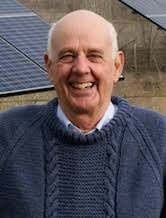 Wendell Berry is a poet, essayist, novelist, environmentalist, professor and farmer living in Port Royal, Kentucky. His Sabbath poems are an extensive series arising from his habit of taking solitary Sunday walks. This poem reflects what Paul says in Ephesians 6:23
Wendell Berry is a poet, essayist, novelist, environmentalist, professor and farmer living in Port Royal, Kentucky. His Sabbath poems are an extensive series arising from his habit of taking solitary Sunday walks. This poem reflects what Paul says in Ephesians 6:23Posted: 24 June 2020
-
Dusting by Marilyn Nelson
Dusting
Thank you for these tiny
particles of ocean salt,
pearl-necklace viruses,
winged protozoans:
for the infinite,
intricate shapes
of submicroscopic
living things.For algae spores
and fungus spores,
bonded by vital
mutual genetic cooperation,
spreading their
inseparable lives
from equator to pole.My hand, my arm,
make sweeping circles.
Dust climbs the ladder of light.
For this infernal, endless chore,
for these eternal seeds of rain:
Thank you. For dust.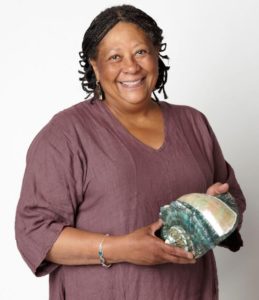 Marilyn Nelson is a former Connecticut poet laureate. This poem reminds us in an insightful, over-the-top, way of what Paul says in Ephesians 5:20. “Dusting” is from her 1994 collection Magnificat.
Marilyn Nelson is a former Connecticut poet laureate. This poem reminds us in an insightful, over-the-top, way of what Paul says in Ephesians 5:20. “Dusting” is from her 1994 collection Magnificat.Posted: 17 June 2020
-
The One by Patrick Kavanagh
The One
Green, blue, yellow and red –
God is down in the swamps and marshes
Sensational as April and almost incred-
ible the flowering of our catharsis.
A humble scene in a backward place
Where no one important ever looked
The raving flowers looked up in the face
Of the One and the Endless, the Mind that has baulked
The profoundest of mortals. A primrose, a violet,
A violent wild iris – but mostly anonymous performers
Yet an important occasion as the Muse at her toilet
Prepared to inform the local farmers
That beautiful, beautiful, beautiful God
Was breathing His love by a cut-away bog.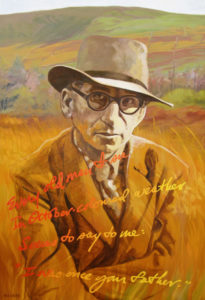 Patrick Kavanagh (1904―1967) sought in his poetry of the particular the connection between the spiritual with the things seen in this world ― as beautifully expressed in Ephesians 1:10, and in this poem.
Patrick Kavanagh (1904―1967) sought in his poetry of the particular the connection between the spiritual with the things seen in this world ― as beautifully expressed in Ephesians 1:10, and in this poem.Posted: 10 June 2020
-
Paradise Lost by John Milton
from Paradise Lost Book X Lines 183―191
When Jesus, son of Mary, second Eve,
Saw Satan fall like lightning down from heaven,
Prince of the air; then, rising from his grave,
Spoiled Principalities and Powers, triumphed
In open shew, and, with ascension bright,
Captivity led captive through the air,
The realm itself of Satan, long usurped,
Whom he shall tread at last under our feet;
Even he who now foretold his fatal bruise… John Milton (1608–1674) in his masterpiece Paradise Lost keeps the concept from Ephesians 2:2 of Satan as “prince of the power of the air” central to his understanding. Notice here, how Christ leads captives through “the air, / The realm itself of Satan” to demonstrate his over-powering defeat of the devil. There is also a reference to Ephesians 6:12.
John Milton (1608–1674) in his masterpiece Paradise Lost keeps the concept from Ephesians 2:2 of Satan as “prince of the power of the air” central to his understanding. Notice here, how Christ leads captives through “the air, / The realm itself of Satan” to demonstrate his over-powering defeat of the devil. There is also a reference to Ephesians 6:12.Posted: 03 June 2020
-
The Missionary by Charlotte Brontë
from The Missionary
…Protected by salvation’s helm,
Shielded by faith–with truth begirt,
To smile when trials seek to whelm
And stand ‘mid testing fires unhurt!
Hurling hell’s strongest bulwarks down,
Even when the last pang thrills my breast,
When Death bestows the Martyr’s crown,
And calls me into Jesus’ rest.
Then for my ultimate reward–
Then for the world-rejoicing word–
The voice from Father–Spirit–Son:
“Servant of God, well hast thou done!”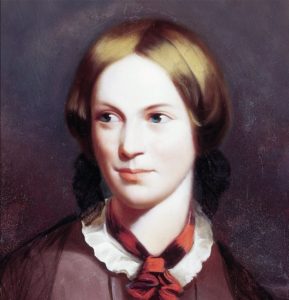 Charlotte Brontë (1816―1855) is the eldest of the three famous Brontë sisters. She is best remembered as the author of the novel Jane Eyre (1847). This is the conclusion of a 159-line poem, “The Missionary, which celebrates those on foreign fields, and includes lines clearly inspired by Ephesians 6:14-16.
Charlotte Brontë (1816―1855) is the eldest of the three famous Brontë sisters. She is best remembered as the author of the novel Jane Eyre (1847). This is the conclusion of a 159-line poem, “The Missionary, which celebrates those on foreign fields, and includes lines clearly inspired by Ephesians 6:14-16.Posted: 27 May 2020
-
The Predestined by Katharine Tynan
The Predestined
Dear, we might have known you were
To die young—and were we blind
To the light on face and hair?
Dear, so simple and so kind.You were clean as your own sword
And as straight too and steel true.
In the Army of the Lord
What promotion waits for you!I can see you where you stand,
Knightly soul, so clean, so brave.
With a new sword in your hand
Where the lilied banners wave.Flower of simple chivalry,
Marked for honour and for grace;
It was very plain to see
The clear shining of your face.You are gone now: it’s turned cold:
Very good you were and dear.
Wear the looks you wore of old
When we meet, —some other year. Katharine Tynan (1859—1931) is the most prominent female writer associated with the Irish Revival which began in the 1880s. “The Predestined” demonstrates her confidence in Paul’s words from Ephesians 1:5.
Katharine Tynan (1859—1931) is the most prominent female writer associated with the Irish Revival which began in the 1880s. “The Predestined” demonstrates her confidence in Paul’s words from Ephesians 1:5.Posted: 20 May 2020
-
The Second Nun’s Tale by Geoffrey Chaucer
from The Second Nun’s Tale (Lines 169―210)
Cecile answered immediately in this manner:
“If you wish, you shall see the angel,
Provided that you believe in Christ and have yourself baptized.
Go forth to the Appian Way,” said she,
“That from this town stands no more than three miles,
And to the poor folks that dwell there,
Say to them exactly thus, which I shall tell you.“Tell them that I, Cecile, sent you to them
To show you the good Urban the old,
For secret needs and for a good purpose.
And when you have beheld Saint Urban,
Tell him the words which I told to you;
And when he has cleansed you of sin (by baptism),
Then you shall see that angel, ere you depart.”Valerian has gone to the place,
And just as he was taught by his learning (from Cecilie),
He immediately found this holy old Urban
In hiding among the saints’ burial places.
And he immediately without delay
Said his message; and when he told it,
Urban for joy did hold up his hands.He let the tears fall from his eyes.
“Almighty Lord, O Jesus Christ,” said he,
“Sower of chaste counsel, shepherd of us all,
The fruit of that same seed of chastity
That thou hast sown in Cecile, take to thee!
Lo, like a busy bee, without guile,
Always thine own servant Cecile serves Thee.“For that same spouse that she took just now
Very like a fierce lion, she sends here,
As meek as ever was any lamb, to you!”
And with that word anon there did appear
An old man, clad in clear white clothes,
Who had in hand a book with lettering of gold ,
And did stand before Valerian.Valerian as if dead fell down for fear
When he saw him, and the old man picked him up then,
And from his book right thus he began to read:
“One Lord, one faith, one God, without more,
One baptism, and Father of all also,
Above all and over all everywhere.”
These words were written all with gold.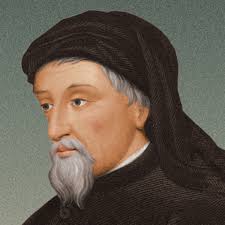 Geoffrey Chaucer (c. 1340―1400) included “The Second Nun’s Tale” in his collection The Canterbury Tales. It tells the legend of Saint Cecilia (Cecile). She revealed to her new Roman husband that an angel guarded her virginity. To see the angel, Valerian, had to declare faith in Christ, and seek out Urban who would baptise him. The passage Urban reads to Valerian is from Ephesians 4:6.
Geoffrey Chaucer (c. 1340―1400) included “The Second Nun’s Tale” in his collection The Canterbury Tales. It tells the legend of Saint Cecilia (Cecile). She revealed to her new Roman husband that an angel guarded her virginity. To see the angel, Valerian, had to declare faith in Christ, and seek out Urban who would baptise him. The passage Urban reads to Valerian is from Ephesians 4:6.Posted: 13 May 2020
-
Clear Evening by Mary Willis
Clear Evening
I signal over stretched silence,
a shared road, the social distance
that should save us:
Are you well?
And neighbours wave back,
we all try to keep the far
near.This morning was dark
with the latest death counts.
This evening I sat watching reflections
through glass, our dislocated world.
I didn’t expect much from a flock of grackles
arrested in a beech tree. They shone
with the separate lights that were leaving
small streams, their neck feathers rippling,
indistinct like itinerant waves.I looked away and almost missed the moment
when they rose as one
uprooted river flinging something distinct
in iridescent ink across a bleached sky.Who is ever prepared to catch grace
and hold a rare flourish?Paul in prison, staring into absence,
writing to the Ephesians,
stopped sometimes, wordless,
startled by light so quickly drying
to afterlife in a mind.
He closed his eyes,
refused to look back or ahead
but just sat there to find
light coursing, present still.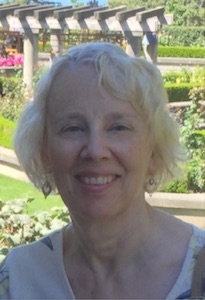 Mary Willis lives in London, Ontario. Her poems have appeared in Canadian Literature, The Fiddlehead, and Faith Today. Her work has been included in anthologies, most recently in In a Strange Land: Introducing Ten Kingdom Poets (Poiema Poetry Series, 2019). She has also published three chapbooks through Fiddlehead Poetry Books.
Mary Willis lives in London, Ontario. Her poems have appeared in Canadian Literature, The Fiddlehead, and Faith Today. Her work has been included in anthologies, most recently in In a Strange Land: Introducing Ten Kingdom Poets (Poiema Poetry Series, 2019). She has also published three chapbooks through Fiddlehead Poetry Books.Posted: 06 May 2020
-
Ambassador by Violet Nesdoly
Ambassador
Though my position is disguised
by my ordinary appearance
I am a diplomat
of the King of Kings.Though my embassy is a simple house
on an obscure street
it is a dispatch station for communiqués
from the Lord of the Universe.Though I have lived in this land all my life
and furloughs are never granted
my real citizenship is in another place
and someday I shall be called home.Until then I remain
an Ambassador of the Kingdom of Heaven
proclaiming to hungry, thirsty, bruised and broken
“Asylum-seekers welcome!”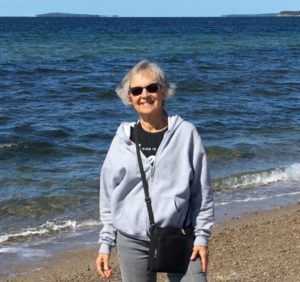 Violet Nesdoly is a poet, writer, and visual artist living in Langley, British Columbia. She has written extensively: articles, devotionals, poetry, and fiction; her novel Destiny’s Hands appeared in 2012. This poem’s image arises from Ephesians 6:20, where Paul refers to himself as an “ambassador in chains.”
Violet Nesdoly is a poet, writer, and visual artist living in Langley, British Columbia. She has written extensively: articles, devotionals, poetry, and fiction; her novel Destiny’s Hands appeared in 2012. This poem’s image arises from Ephesians 6:20, where Paul refers to himself as an “ambassador in chains.”Posted: 29 April 2020
-
Sonnet #43 by Elizabeth Barrett Browning
Sonnet #43
How do I love thee? Let me count the ways.
I love thee to the depth and breadth and height
My soul can reach, when feeling out of sight
For the ends of Being and ideal Grace.
I love thee to the level of every day’s
Most quiet need, by sun and candlelight.
I love thee freely, as men strive for Right;
I love thee purely, as they turn from Praise.
I love with a passion put to use
In my old griefs, and with my childhood’s faith.
I love thee with a love I seemed to lose
With my lost saints, — I love thee with the breath,
Smiles, tears, of all my life! — and, if God choose,
I shall but love thee better after death.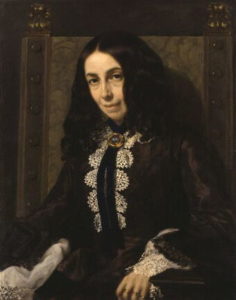 Elizabeth Barrett Browning (1806–1861) wrote this ever-so-famous love sonnet, to her husband, Robert Browning. In 1846 the couple eloped and moved to Italy because of her ill health. She uses the same language here in speaking of her love for him, as Paul uses in Ephesians 3:18 to describe the love of Christ. This is not a secularizing of scripture, for as can be seen at the poem’s end, she willingly submits their love to God’s will.
Elizabeth Barrett Browning (1806–1861) wrote this ever-so-famous love sonnet, to her husband, Robert Browning. In 1846 the couple eloped and moved to Italy because of her ill health. She uses the same language here in speaking of her love for him, as Paul uses in Ephesians 3:18 to describe the love of Christ. This is not a secularizing of scripture, for as can be seen at the poem’s end, she willingly submits their love to God’s will.Posted: 22 April 2020
-
Henry IV Part 1 by William Shakespeare
from Henry IV Part 1 ― Act 1, Scene 2
I know you all, and will awhile uphold
The unyoked humour of your idleness:
Yet herein will I imitate the sun,
Who doth permit the base contagious clouds
To smother up his beauty from the world,
That, when he please again to be himself,
Being wanted, he may be more wonder’d at,
By breaking through the foul and ugly mists
Of vapours that did seem to strangle him.
If all the year were playing holidays,
To sport would be as tedious as to work;
But when they seldom come, they wish’d for come,
And nothing pleaseth but rare accidents.
So, when this loose behaviour I throw off
And pay the debt I never promised,
By how much better than my word I am,
By so much shall I falsify men’s hopes;
And like bright metal on a sullen ground,
My reformation, glittering o’er my fault,
Shall show more goodly and attract more eyes
Than that which hath no foil to set it off.
I’ll so offend, to make offence a skill;
Redeeming time when men think least I will. William Shakespeare (1564―1616) “Reading further in Ephesians with the Henry IV plays in mind amply confirms [the allusion in the final line of this soliloquy to Ephesians 5:15-16 and] almost gives one the illusion that Shakespeare set out to confirm St. Paul’s epistle.” (Shakespeare scholar, J.A. Bryant Jr. ― “Prince Hal and the Ephesians” in Hippolyta’s View: Some Christian Aspects of Shakespeare’s Plays)
William Shakespeare (1564―1616) “Reading further in Ephesians with the Henry IV plays in mind amply confirms [the allusion in the final line of this soliloquy to Ephesians 5:15-16 and] almost gives one the illusion that Shakespeare set out to confirm St. Paul’s epistle.” (Shakespeare scholar, J.A. Bryant Jr. ― “Prince Hal and the Ephesians” in Hippolyta’s View: Some Christian Aspects of Shakespeare’s Plays)Posted: 15 April 2020
-
The Word[s] by John C. Mannone
The Word[s]
———We are his workmanship, his poetry
———― After Ephesians 2:10You are the Word and speak
of stories made flesh
——————and bone, lines
breaking like a poem;
——————your skin, pierced
by our unholiness.One body of work,
coherent, harmonious, clear
as your soul, not fragmented
like mine.You created all things
by your word, including me.
I am your workmanship, your poem,
———which I messed up
———with a sloppy rewrite.I repent and I am desperate
for your revision.———I worship you,
yet before the ink of those words
has dried, I blot my soul with disgrace.I should decrease,
so you can increase.
That will give me new
literary depth. I would be
less self-aware, know
you more.You knew me
before I entered
my mother’s womb.You know the words of me,
the syllables, my very letters
knitted together in my DNA.
And your name is written there, too.
You signed me, your workmanship,
as yours.Revise me, O Lord, into a new song,
a new poem.
 John C. Mannone is the author of three poetry collections, including the forthcoming Flux Lines (2020, Linnet’s Wings Press), and is the president of the Chattanooga Writers’ Guild. He is a retired physics professor, living in Tennessee. His poetry won the 2020 Impressions of Appalachia Creative Arts Contest.
John C. Mannone is the author of three poetry collections, including the forthcoming Flux Lines (2020, Linnet’s Wings Press), and is the president of the Chattanooga Writers’ Guild. He is a retired physics professor, living in Tennessee. His poetry won the 2020 Impressions of Appalachia Creative Arts Contest.Posted: 08 April 2020
-
Her Little Parasol to Lift by Emily Dickinson
Her Little Parasol to Lift (Poem 1038)
Her little Parasol to lift
And once to let it down
Her whole Responsibility –
To imitate be Mine.A Summer further I must wear,
Content if Nature’s Drawer
Present me from sepulchral Crease
As blemishless, as Her.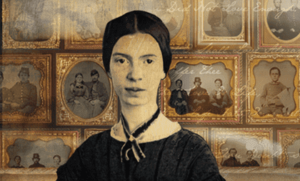 Emily Dickinson (1830―1886) is early-America’s great poet of faith and questioning. In this poem she speaks of the morning glory that opens in the morning and closes in the afternoon. She desires to be content to live her life, and then when she’s raised to heaven to be blemishless ― as the church will be in glory according to Ephesians 5:27 ― and as the morning glory is.
Emily Dickinson (1830―1886) is early-America’s great poet of faith and questioning. In this poem she speaks of the morning glory that opens in the morning and closes in the afternoon. She desires to be content to live her life, and then when she’s raised to heaven to be blemishless ― as the church will be in glory according to Ephesians 5:27 ― and as the morning glory is.Posted: 01 April 2020
-
Redeemed by Fanny J. Crosby
Redeemed
Redeemed—how I love to proclaim it!
Redeemed by the blood of the Lamb;
Redeemed through His infinite mercy,
His child, and forever, I am.Redeemed, redeemed,
Redeemed by the blood of the Lamb;
Redeemed, redeemed,
His child, and forever, I am.Redeemed and so happy in Jesus,
No language my rapture can tell;
I know that the light of His presence
With me doth continually dwell.I think of my blessed Redeemer,
I think of Him all the day long;
I sing, for I cannot be silent;
His love is the theme of my song.I know I shall see in His beauty
The King in whose way I delight;
Who lovingly guardeth my footsteps,
And giveth me songs in the night.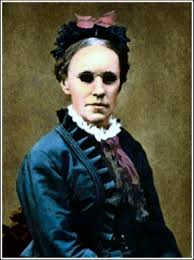 Fanny J. Crosby (1820—1915) is a poet who published four collections, and the writer of more than 9,000 hymns and gospel songs. She was blind from six years of age. This well-known hymn is drawn from scriptures such as Ephesians 1:7.
Fanny J. Crosby (1820—1915) is a poet who published four collections, and the writer of more than 9,000 hymns and gospel songs. She was blind from six years of age. This well-known hymn is drawn from scriptures such as Ephesians 1:7.Posted: 25 March 2020
-
The Person by Thomas Traherne
from The Person
IV
Let verity
Be thy delight; let me esteem
True wealth far more than toys:
Let sacred riches be,
While falser treasures only seem,
My real joys.
For golden chains and bracelets are
But gilded manacles, whereby
Old Satan doth ensnare,
Allure, bewitch the eye.
Thy gifts, O God, alone I’ll prize,
My tongue, my eyes,
My cheeks, my lips, my ears, my hands, my feet;
Their harmony is far more sweet;
Their beauty true. And these in all my ways
Shall themes become and organs of Thy praise. Thomas Traherne (1637—1674) is an English metaphysical poet whose work was largely not discovered until 200 years after his death. The words “far more” are common in Traherne, and allude to Ephesians 3:20 ― praising “him who is able to do far more abundantly than all we ask or think”.
Thomas Traherne (1637—1674) is an English metaphysical poet whose work was largely not discovered until 200 years after his death. The words “far more” are common in Traherne, and allude to Ephesians 3:20 ― praising “him who is able to do far more abundantly than all we ask or think”.Posted: 18 March 2020
-
His Power that is at Work Within Us by Carolyn Weber
His Power that is at Work Within Us
God’s power works through all things:
in the lowering of the casket
and the rising of the sun,
in the unimaginable
birthing of a dying earth:
the autumn trees’ beauty beyond describing,
aflame with memories
along fields gleamed bare,
their counterparts burning
with branches yearning,
rooted deep within my being:
flare!The infant clutch of my forefinger
rivals any mystery of the vastest cosmos.
Daylight slips behind the white-haired head
I kiss in the hospital bed, and from the same
immeasurable darkness now, stars spill
sifting over
moonlit waters
shifting to fill me to the measure of all the fulness of God.I cannot bear the weight of such glory and live:
bleeding through this crowd of daily distractions –
I cannot open my eyes to such shining –
remembering is the most I can carry, and even then, I stumble …
from my knees, I grasp for the hem …
and somehow, surpassingly,
understand in the grazing of such grace
this reaching –
this touch is
enough. Carolyn Weber has served as faculty at Oxford University, Seattle University, University of San Francisco and Westmont College, and was the first female dean of St. Peter’s College, Oxford. She currently teaches at Heritage College and Seminary, and at Brescia University College (both in Ontario). Her first memoir, Surprised by Oxford, won among other distinctions the Grace Irwin Award, the largest award for Christian writing in Canada. This poem was inspired by Ephesians 4:6.
Carolyn Weber has served as faculty at Oxford University, Seattle University, University of San Francisco and Westmont College, and was the first female dean of St. Peter’s College, Oxford. She currently teaches at Heritage College and Seminary, and at Brescia University College (both in Ontario). Her first memoir, Surprised by Oxford, won among other distinctions the Grace Irwin Award, the largest award for Christian writing in Canada. This poem was inspired by Ephesians 4:6.Posted: 11 March 2020
-
Kairos and Logos by W.H. Auden
from Kairos and Logos
I
Around them boomed the rhetoric of time,
The smells and furniture of the known world
Where conscience worshipped an aesthetic order
And what was unsuccessful was condemned;
And, at the centre of its vast self-love,
The emperor and his pleasures, dreading death.In lovely verse that military order,
Transferring its obsession onto time,
Besieged the body and cuckolded love;
Puzzling the boys of an athletic world,
These only feared another kind of Death
To which the time-obsessed are all condemned.Night and the rivers sang a cationic love,
Destroyer of cities and the daylight order,
But seemed to them weak arguments for death;
The apple tree that cannot measure time
Might taste the apple yet not be condemned;
They, to enjoy it, must renounce the world.Friendly to what the sensual call death,
Placing their lives below the dogs who love
Their fallen masters and are not condemned,
They came to life within a dying order;
Outside the sunshine of its civil world
The savage waited their appointed time.Its brilliant self-assertions were condemned
To interest the forest and draw death
On aqueducts and learning; yet the world,
Through them, had witnessed, when predestined love
Fell like a daring meteor into time,
The condescension of eternal order.So, sown in little clumps about the world,
The fair, the faithful and the uncondemned
Broke out spontaneously all over time,
Setting against the random facts of death
A ground and possibility of order,
Against defeat the certainty of love.And never, like its own, condemned the world
Or hated time, but sang until their death:
“O Thou who lovest, set its love in order.”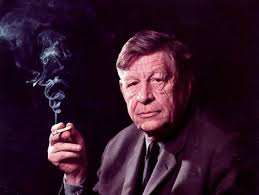 W.H. Auden (1907—1973) is an important British poet who moved to the United States in 1939. He received the 1948 Pulitzer Prize, The Bollingen Prize (1953) and the National Book Award (1956). This poem relates to Paul’s concerns in Ephesians 5:16 ― “Redeeming the time, because the days are evil.” The selection’s final quotation is from Francis of Assisi’s “Cantica ― Our Lord Christ: of order”
W.H. Auden (1907—1973) is an important British poet who moved to the United States in 1939. He received the 1948 Pulitzer Prize, The Bollingen Prize (1953) and the National Book Award (1956). This poem relates to Paul’s concerns in Ephesians 5:16 ― “Redeeming the time, because the days are evil.” The selection’s final quotation is from Francis of Assisi’s “Cantica ― Our Lord Christ: of order”Posted: 04 March 2020
-
Celestial Bodies by Jody Collins
Celestial Bodies
——–Ephesians 1:18 &19
My weary eyes need reminders to
view the galaxies aright. Focused on
the sliver of moon, they forget an
entire orb hides in the dark.
I gaze at dull concrete, traipse
around the observatory, past
an entrance where God stands in the
doorway beckoning me to peer,
Galileo-like, past roofs, across
trees, into velvet sky.As feet pause on sure ground,
a whisper beckons to dream
above, beyond to distant beauty.
Consider the immeasurable
heavens inside, reckon my
need as I’m handed a telescope.Brightened eyes rest and remember.
 Jody Collins is a Seattle-area writer, speaker and retreat facilitator. She is the author of Living the Season Well: Reclaiming Christmas (2017, Newport Press). Her essays and poetry have appeared in such publications as The High Calling, and Grace Table. Visit her website: www.jodyleecollins.com
Jody Collins is a Seattle-area writer, speaker and retreat facilitator. She is the author of Living the Season Well: Reclaiming Christmas (2017, Newport Press). Her essays and poetry have appeared in such publications as The High Calling, and Grace Table. Visit her website: www.jodyleecollins.comPosted: 26 February 2020
-
A Prayer by Thomas Ken
A Prayer
I Bow my knee to God on high,
Father of Filial Deity,
To whom the blessed owe their birth,
Inhabiting or heaven or earth,
That from his gracious glories He
Would dart one pardoning ray on me:
That by his Holy Spirit’s aid,
My soul may be his temple made:
That He by faith may in me dwell,
And all terrestrial joys expel:
That I in love may deeply root;
And may with all the saints compute
All measures, length, breadth, depth, and height,
Of his benign, all-saving might;
That I his loves may comprehend,
Which intellectual force transcend,
Filled with all plenitude divine,
Derivable from Godhead Trine. Thomas Ken (1637―1711) served as Royal Chaplain to Charles II, and later as the Bishop of Bath. This poem is a reworking of Paul’s prayer for the believers, in Ephesians 3:14-19, into rhyming couplets and iambic tetrameter.
Thomas Ken (1637―1711) served as Royal Chaplain to Charles II, and later as the Bishop of Bath. This poem is a reworking of Paul’s prayer for the believers, in Ephesians 3:14-19, into rhyming couplets and iambic tetrameter.Posted: 19 February 2020
-
To Live in the Mercy of God by Denise Levertov
To Live in the Mercy of God
To lie back under the tallest
oldest trees. How far the stems
rise, rise
———–before ribs of shelter
——————————–open!To live in the mercy of God. The complete
sentence too adequate, has no give.
Awe, not comfort. Stone, elbows of
stony wood beneath lenient
moss bed.And awe suddenly
passing beyond itself. Becomes
a form of comfort.
—————–Becomes the steady
air you glide on, arms
stretched like the wings of flying foxes.
To hear the multiple silence
of trees, the rainy
forest depths of their listening.To float, upheld,
————as salt water
————would hold you,
——————————once you dared.To live in the mercy of God.
To feel vibrate the enraptured
waterfall flinging itself
unabating down and down
———————–to clenched fists of rock.
Swiftness of plunge,
hour after year after century,
————————————-O or Ah
uninterrupted, voice
many-stranded.
———————–To breathe
spray. The smoke of it.
———————–Arcs
of steelwhite foam, glissades
of fugitive jade barely perceptible. Such passion—
rage or joy?
———————–Thus, not mild, not temperate,
God’s love for the world. Vast
flood of mercy
——————flung on resistance. Denise Levertov (1923―1997) is a British-born American poet who authored more than two dozen collections. Across her career, her gradual progression from agnosticism to Christian faith is evident. This poem is from her collection Sands from the Well. (1996, New Directions), and relates well to Paul’s theme in Ephesians 2:4 and 5.
Denise Levertov (1923―1997) is a British-born American poet who authored more than two dozen collections. Across her career, her gradual progression from agnosticism to Christian faith is evident. This poem is from her collection Sands from the Well. (1996, New Directions), and relates well to Paul’s theme in Ephesians 2:4 and 5.Posted: 12 February 2020
-
Round Trip by Marjorie Maddox
Round Trip
—–“He that descended is the same
—–also that ascended…” Ephesians 4:8-10And the descending and the rising
was three days, and it was good.And the descending to the not-good—
where the rising and the conquering
were proclaimed throughout Hades—
was good.Or
the descending to the good-gone-
before-Him was very good, and
the proclaiming was their rising, too.And His rising was their rising,
and their rising was ours.
And the descending and the rising
was three days of proclaiming good.
And it was eternity. And it was very good.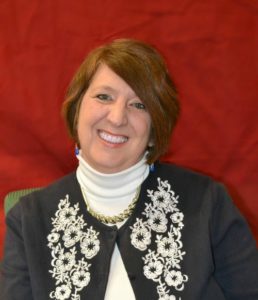 Marjorie Maddox is professor of English at Loch Haven University in Pennsylvania, the director of their Creative Writing Program, and the author of True, False, None of the Above (Poiema/Cascade). This poem, which first appeared in Anglican Theological Review, is her second poem at Poems For Ephesians.
Marjorie Maddox is professor of English at Loch Haven University in Pennsylvania, the director of their Creative Writing Program, and the author of True, False, None of the Above (Poiema/Cascade). This poem, which first appeared in Anglican Theological Review, is her second poem at Poems For Ephesians.Posted: 05 February 2020
-
One Flesh by Elizabeth Jennings
One Flesh
Lying apart now, each in a separate bed,
He with a book, keeping the light on late,
She like a girl dreaming of childhood,
All men elsewhere ― it is as if they wait
Some new event: the book he holds unread,
Her eyes fixed on the shadows overhead.Tossed up like flotsam from a former passion,
How cool they lie. They hardly ever touch,
Or if they do, it is like a confession
Of having little feeling ― or too much.
Chastity faces them, a destination
For which their whole lives were a preparation.Strangely apart, yet strangely close together,
Silence between them like a thread to hold
And not wind in. And time itself’s a feather
Touching them gently. Do they know they’re old,
These two who are my father and my mother
Whose fire from which I came, has now grown cold?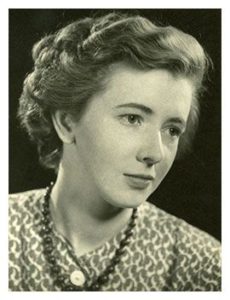 Elizabeth Jennings (1926―2001) is an Oxford poet. She received a C.B.E. (Commander of the Order of the British Empire) in 1992. This poem strikes me as a sad backspin on the truth spoken in Genesis 2 ― and echoed in Ephesians 5:31 ― of husband and wife becoming “one flesh.”
Elizabeth Jennings (1926―2001) is an Oxford poet. She received a C.B.E. (Commander of the Order of the British Empire) in 1992. This poem strikes me as a sad backspin on the truth spoken in Genesis 2 ― and echoed in Ephesians 5:31 ― of husband and wife becoming “one flesh.”Posted: 29 January 2020
-
Ephesus by Sarah Klassen
Ephesus
Rev: 2:1-7
i.
Here’s where a thing gets turned on its head in the mind
of a man self-named a sinner. He deciphers titles
inscribed on gates to the Agora: Son of Caesar. High Priest.
Lord. Titles claimed by VIPs of empire. Divinity a thing
to be grasped. Gloated on. Devotion wrought by drawn swords,
glint of steel helmets, great snorting horses.The apostle, unconvinced, squints at the flattery
carved on gates designed and built by slaves once chained
to masters they served with loyalty, intelligence,
engineering skills. Qualities they possessed in measure
greater than those who owned them. The slaves,
set free, paid the debt of gratitude they did not owe. In Paul’s mindhonor belongs to a man he never sat at table with
yet knows by heart. A victim of empire, arrested, taunted,
executed. Who with his last breath said to a sinner:
Today you will be with me in paradise.
Friends around the table call him master, priest, prince.
They believe his kingdom has begun to turn
the whole damned empire upside down.ii.
Wisdom, in the book of Proverbs, stands like any shameless woman
at the entrance to the city, raises her voice in the street:
instructions to the simple, precepts for pilgrims, the hungry
ushered to a table set with meat and drink. In EphesusSophia stands restored between two pillars,
shoulders wrapped in a stone shawl, stone eyes fixed
on the unstoppable tsunami: tourists and time
stream past the excavated, reconstructed Celsus library,empty of books. A ghost-filled haven.
Croesus who had gold enough to fund construction of a temple
honoring Artemis. Demetrius the silversmith
made money making shrines for her.The wise know speech is silver, silence, gold
and those with ears can hear wind blowing in the streets
of Ephesus. Dust fills the air. Cypress trees are shaken.
Leaves on the tree of life glow green.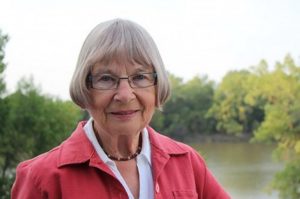 Sarah Klassen is a Winnipeg-based writer who’s won numerous awards, including The Canadian Authors Association Award for Poetry for her collection A Curious Beatitude. Her eighth and most-recent collection is Monstrance (2012, Turnstone Press). This is the second post here about Sarah Klassen. These poems first appeared in Image.
Sarah Klassen is a Winnipeg-based writer who’s won numerous awards, including The Canadian Authors Association Award for Poetry for her collection A Curious Beatitude. Her eighth and most-recent collection is Monstrance (2012, Turnstone Press). This is the second post here about Sarah Klassen. These poems first appeared in Image.Posted: 22 January 2020
-
A Prayer for Setting the Table by Annabelle Moseley
A Prayer for Setting the Table
In memory of Annabelle Black
“…praying always with all prayer and supplication in the Spirit, and watching thereunto with all perseverance and supplication for all saints…” Eph 6:17-18
As the tablecloth unfurls like an altar linen—
as napkins are folded and cups are placed
with the dishes of ordinary time—
we pray for you, to be like you.
It isn’t always in words.Sometimes, the motion of our fingers is the prayer
leafing through the hymnal of daily tasks—
smoothing folds of fabric, scraping pots,
singing kitchen psalms.You know the way a room breathes—
as bowls are taken out and put away?
You lived this well, the daily push of it all—
doing, serving, pursuing, moving.
Yet you were our table, and we sat around you.So now, as our tablecloth unfurls like an altar linen,
as napkins are folded and cups are placed
with the dishes of ordinary time—
We pray to nourish others the way you nourished us:May we always have as much.
May our tables welcome,
May our food sustain,
may we have enough for the guests we do not expect—May we supplicate. May we persevere.
May we keep watch for saints.
May our words anoint like oil.
We pray for you, to be like you. It isn’t always in words.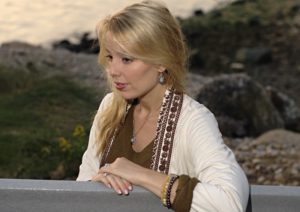 Annabelle Moseley is an award-winning poet and an author of ten books, most recently Sacred Braille (En Route, 2019). She has served as the Writer-in-Residence of the Walt Whitman Birthplace in New York and 2014 Long Island Poet of the Year. Twelve of her poems are included in the anthology Adam, Eve, & the Riders of the Apocalypse. Her work as a poet of faith is featured in the documentary film, Masterpieces, now available to view on Amazon Prime.
Annabelle Moseley is an award-winning poet and an author of ten books, most recently Sacred Braille (En Route, 2019). She has served as the Writer-in-Residence of the Walt Whitman Birthplace in New York and 2014 Long Island Poet of the Year. Twelve of her poems are included in the anthology Adam, Eve, & the Riders of the Apocalypse. Her work as a poet of faith is featured in the documentary film, Masterpieces, now available to view on Amazon Prime.Posted: 15 January 2020
-
For the Unknown Sculptor by James A. Zoller
For the Unknown Sculptor
I have imagined the body of Christ
in the presence of the Venus de Milo
in a sanctuary jammed with self-devoted pilgrims.I have considered the glorious conception
abused by time, cold. Abused by antagonisms.Raised on her plinth above the throng, she
stands where we can regard her irenic sobriety,
her face unmoved by the beauty of her form.What gifts of God might possibly survive our obsessions
with nakedness, with celebrity, with self-righteousness?She leans forward as if to embrace those who seek.
Before we leave, in turn, we would beg her blessing,
were she able, now, to raise her arms in peace.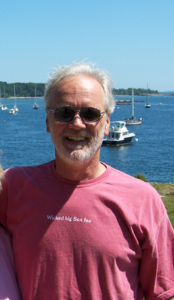 James A. Zoller is Professor of Writing and Literature at Houghton College in New York State. His most recent poetry collection is Ash & Embers (2018, Poiema/Cascade). Among other passages in the epistle, Ephesians 1:22,23; and 4:16, have influenced this poem.
James A. Zoller is Professor of Writing and Literature at Houghton College in New York State. His most recent poetry collection is Ash & Embers (2018, Poiema/Cascade). Among other passages in the epistle, Ephesians 1:22,23; and 4:16, have influenced this poem.Posted: 08 January 2020
-
Disciples by Philip C. Kolin
Disciples
———-after Ephesians 1:13-14; 6:15
Apprentices to the master
of wood and nailsthey follow him to the corners
of the world lacing their sandalsfor the journey. Dressed in red
banners, christened withbirth certificates signed by
a whirling wind that whispersas soft as smoldering embers–
they go forth, fishermenwithout boats, unlevying
publicans, dismountedcameleers, a tentmaker folding
spools of haircloth away.Twelve first, then seventy
all with tongues on fire nowto spread the light to cold
hollow bones. Across the centurieswhen a famine of faith struck,
these gifted garners filled empty soulsfrom a storehouse of God’s plenty.
When the night terrors descendedthey hid themselves in his blood
and thorns until they toowere ready to fare toward
that world without end.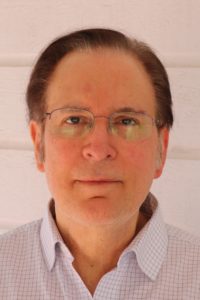 Philip C. Kolin is the author of several poetry collections, most-recently Reaching Forever (2018, Poiema/Cascade). He is the Distinguished Professor of English (Emeritus) at the University of Southern Mississippi. This is his second poem to appear at Poems For Ephesians.
Philip C. Kolin is the author of several poetry collections, most-recently Reaching Forever (2018, Poiema/Cascade). He is the Distinguished Professor of English (Emeritus) at the University of Southern Mississippi. This is his second poem to appear at Poems For Ephesians.Posted: 01 January 2020
-
O Holy Night by Marjorie Stelmach
O Holy Night
———-Ephesians 4:31 – Let all bitterness and wrath
——————–and anger…be put away from you…In the easement,
stripped trees daven apathetically
under a skull-cap sky.
——————–Oh, Child,
are you sure? This world?
This bleak winter?
These unconscionable times?The last of the day’s feeble sun
steeps the holly,
staining its berries a rich
——————–crimson
as bright and slick
as a seasoned trickster, then
slips off the edge of the earth,leaving to us this night,
first among too many nights
we’ve marked
——————–and mean,
every year, to find holy.
It’s getting old, this act.
Or maybe it’s me. Lately,I’m all lapse and misstep.
And yet, love’s tiny fist seeks out
my heart with the old entreaty,
———————and yearly
I somehow let in love enough
to try again: to call our people
decent, our planet worthy. Marjorie Stelmach is the author of five poetry collections, including Falter (Poiema Poetry Series). She is the winner of the Chad Walsh Prize, and has had poems appear in Adam, Eve, & the Riders of the Apocalypse, and in The Turning Aside: The Kingdom Poets Book of Contemporary Christian Poetry. She lives in Manchester, Missouri, and has served as director of the Howard Nemerov Writing Scholars Program at Washington University.
Marjorie Stelmach is the author of five poetry collections, including Falter (Poiema Poetry Series). She is the winner of the Chad Walsh Prize, and has had poems appear in Adam, Eve, & the Riders of the Apocalypse, and in The Turning Aside: The Kingdom Poets Book of Contemporary Christian Poetry. She lives in Manchester, Missouri, and has served as director of the Howard Nemerov Writing Scholars Program at Washington University.Posted: 25 December 2019
-
Dear Christians, One and All, Rejoice by Martin Luther
Dear Christians, One and All, Rejoice
Dear Christians, one and all, rejoice,
With exultation springing,
And, with united heart and voice
And holy rapture singing,
Proclaim the wonders God hath done,
How His right arm the victory won;
Right dearly it hath cost Him.Fast bound in Satan’s chains I lay,
Death brooded darkly o’er me,
Sin was my torment night and day,
In sin my mother bore me;
Yea, deep and deeper still I fell,
Life had become a living hell,
So firmly sin possessed me.My own good works availed me naught,
No merit they attaining;
Free will against God’s judgment fought,
Dead to all good remaining.
My fears increased till sheer despair
Left naught but death to be my share;
The pangs of hell I suffered.But God beheld my wretched state
Before the world’s foundation,
And, mindful of His mercies great,
He planned my soul’s salvation.
A father’s heart He turned to me,
Sought my redemption fervently:
He gave His dearest Treasure.He spoke to His beloved Son:
‘Tis time to have compassion.
Then go, bright Jewel of My crown,
And bring to man salvation;
From sin and sorrow set him free,
Slay bitter death for him that he
May live with Thee forever.This Son obeyed His Father’s will,
Was born of virgin mother,
And God’s good pleasure to fulfill,
He came to be my Brother.
No garb of pomp or power He wore,
A servant’s form, like mine, He bore,
To lead the devil captive.To me He spake: Hold fast to Me,
I am thy Rock and Castle;
Thy Ransom I Myself will be,
For thee I strive and wrestle;
For I am with thee, I am thine,
And evermore thou shalt be Mine;
The Foe shall not divide us.The Foe shall shed My precious blood,
Me of My life bereaving.
All this I suffer for thy good;
Be steadfast and believing.
Life shall from death the victory win,
My innocence shall bear thy sin;
So art thou blest forever.Now to My Father I depart,
The Holy Spirit sending
And, heavenly wisdom to impart,
My help to thee extending.
He shall in trouble comfort thee,
Teach thee to know and follow Me,
And in all truth shall guide thee.What I have done and taught, teach thou,
My ways forsake thou never;
So shall My kingdom flourish now
And God be praised forever.
Take heed lest men with base alloy
The heavenly treasure should destroy;
This counsel I bequeath thee.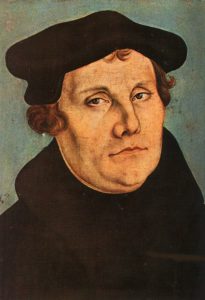 Martin Luther (1483―1546) inadvertently started the Protestant Reformation when he posted 95 theses on the door of the Wittenberg Castle Church for debate. This hymn, translated by Richard Massie, relates to many scriptures, including Ephesians 1: 7-10; consider the hymn’s fifth and sixth verses, which fit well, too, with our celebrations of Christmas.
Martin Luther (1483―1546) inadvertently started the Protestant Reformation when he posted 95 theses on the door of the Wittenberg Castle Church for debate. This hymn, translated by Richard Massie, relates to many scriptures, including Ephesians 1: 7-10; consider the hymn’s fifth and sixth verses, which fit well, too, with our celebrations of Christmas.Posted: 18 December 2019
-
Before Creation by Joanne Newbery
Before Creation
We are the fruit of ancient longing;
before night and day were created
the founding father had a cunning plan:
His Word would love into being
the very image of the lover
made afresh and free in every soul.My womb felt the unfolding
of sons before their earthly birth,
the aching of making after love;
God chose the cherishing
to bubble along for billions of years
before I appeared in history.After such a long gestation
am I doing it right,
am I what you hoped,
when you sent the Son
to blaze a path home?Carved from the great yearning
we recently populated the world;
it was a free entry.
We can walk away to death,
fall as woodshavings to the sculptor’s floor,
but I scramble towards life,
to seize the crown of the truly known
in the humble place made for me,
who was thought of so long ago,
before star dust ever blew into God’s eye.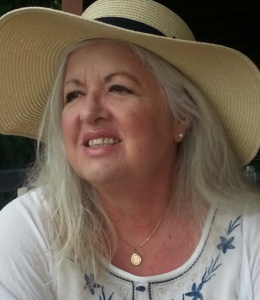 Joanne Newbery is a Creative Writing student at Australia’s Southern Cross University. Her work has appeared in such Australian journals as Quadrant and Verity La. “Before Creation” was inspired by Ephesians 1:4, 5 and 11.
Joanne Newbery is a Creative Writing student at Australia’s Southern Cross University. Her work has appeared in such Australian journals as Quadrant and Verity La. “Before Creation” was inspired by Ephesians 1:4, 5 and 11.Posted: 11 December 2019
-
Ephesus by John Newton
Ephesus
Thus saith the Lord to Ephesus,
And thus he speaks to some of us;
Amidst my churches, lo, I stand,
And hold the pastors in my hand.Thy works, to me, are fully known,
Thy patience, and thy toil, I own;
Thy views of gospel truth are clear,
Nor canst thou other doctrine bear.Yet I must blame while I approve,
Where is thy first, thy fervent love?
Dost thou forget my love to thee,
That thine is grown so faint to me?Recall to mind the happy days
When thou wast filled with joy and praise;
Repent, thy former works renew,
Then I’ll restore thy comforts too.Return at once, when I reprove,
Lest I thy candlestick remove;
And thou, too late, thy loss lament;
I warn before I strike, Repent.Hearken to what the Spirit saith,
To him that overcomes by faith;
The fruit of life’s unfading tree,
In paradise his food shall be. John Newton (1725—1807) is the author of perhaps the best-known hymn in English — “Amazing Grace”. This poem is based on Revelation 2:1-7, where John is instructed to write these things to the angel of the church in Ephesus.
John Newton (1725—1807) is the author of perhaps the best-known hymn in English — “Amazing Grace”. This poem is based on Revelation 2:1-7, where John is instructed to write these things to the angel of the church in Ephesus.Posted: 04 December 2019
-
Sonnet of Thanksgiving by Andrew Lansdown
Sonnet of Thanksgiving
giving thanks always and for everything to God the Father – Ephesians 5:20
I wake, draw the curtains and am suddenly aware
that He is profligate, our God, giving us more
than we need, more than we ever dream to ask for.
Through the window on this winter morning, therebeside my house, the forest is faint with mist.
The white trees are like women standing half-seen
in a sauna. The bushes where the spiders have been
are strewn with ornaments for throat and wrist:necklaces, bracelets, strung with diamonds. A stark
and startling wealth, this jewellery the women
have put off. They stand in silent communion:
unadorned, white, bar the occasional birthmark.And then in the stillness, the whiteness, the swirl,
a lone bird call: it hangs on the ear like a pearl. Andrew Lansdown was called Australia’s greatest Christian poet, by the late Les Murray. He has published more than a dozen poetry collections, including Far from Home: poems of faith, grief and gladness (2010, Wombat Books) from which this poem is taken. His poetry has appeared in the McMaster Journal of Theology & Ministry and in The Turning Aside: The Kingdom Poets Book of Contemporary Christian Poetry.
Andrew Lansdown was called Australia’s greatest Christian poet, by the late Les Murray. He has published more than a dozen poetry collections, including Far from Home: poems of faith, grief and gladness (2010, Wombat Books) from which this poem is taken. His poetry has appeared in the McMaster Journal of Theology & Ministry and in The Turning Aside: The Kingdom Poets Book of Contemporary Christian Poetry.Posted: 27 November 2019
-
Person by Margaret Avison
Person
Sheepfold and hill lie
under open sky.This door that is ‘I AM’
seemed to seal my tomb
my ceilinged cell
(not enclosed earth, or hill)there was no knob, or hinge.
A skied stonehenge
unroofed the prison?
and lo its walls uprising,
very stone drawing breath?They closed again. Beneath
steel tiers, all walled, I lay
barred every way.‘I am.’ The door
was flesh; was there.No hinges swing, no latch
lifts. Nothing moves. But such
is love, the captive may
in blindness find the way:In all his heaviness, he passes through.
So drenched with Being and created new
the flock is folded close, and free
to feed ― His cropping clay, His earth ―
and to the woolly, willing bunt-head, forth
shining, unseen, draws near
the Morning Star. Margaret Avison (1918―2007) is a Toronto poet, an officer of the Order of Canada, and a two-time winner of the Governor General’s Award. This poem relates primarily to John 10, but also includes the thought of the “captive” only being able to be rescued by Christ (Ephesians 2: 8 & 9; 4:8; etc).
Margaret Avison (1918―2007) is a Toronto poet, an officer of the Order of Canada, and a two-time winner of the Governor General’s Award. This poem relates primarily to John 10, but also includes the thought of the “captive” only being able to be rescued by Christ (Ephesians 2: 8 & 9; 4:8; etc).Posted: 20 November 2019
-
St. Paul’s Letter to the Ephesians, Lent by Anya Krugovoy Silver
St. Paul’s Letter to the Ephesians, Lent
At the word fornicators, I roll my eyes.
Not to live in the passions of the flesh―
how grim and arid the light we’re promised,
as if all the earth were bleak midwinter.
Meanwhile, Paul, plum trees are bruising
the church parking lot, cherry trees readying
their exuberant and joyful climax of pink,
the palest pink, nipple pink, pink of my dry
(I licked them) lips, of my amoral animal body.
Not easily have I obeyed the commandments.
For I love that keen, painful twisting of desire,
the tight bud of it straining against its husk.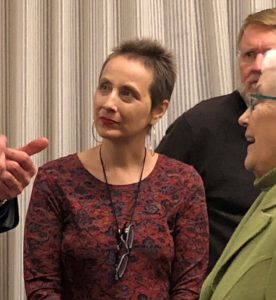 Anya Krugovoy Silver (1968―2018) is the author of four poetry collections, including Second Bloom (2017, Poiema/Cascade) and from nothing (2016, LSU Press) from which this poem is taken. She taught English at Mercer University in Macon, Georgia. The honest, wrestling response in this poem is to a perceived judgemental tone in Ephesians 5:5.
Anya Krugovoy Silver (1968―2018) is the author of four poetry collections, including Second Bloom (2017, Poiema/Cascade) and from nothing (2016, LSU Press) from which this poem is taken. She taught English at Mercer University in Macon, Georgia. The honest, wrestling response in this poem is to a perceived judgemental tone in Ephesians 5:5.Posted: 13 November 2019
-
Poem for November by Jill Peláez Baumgaertner
Poem for November
———-Ephesians 5: 8-20.
Many trees are mere stencils now,
but some still dazzle, those with light
in their yellow leaves, this even
as November skies stretch mute
and somber.It is easy this time of year
to dwell on losses and the world
so shattered, even watching this translucent
yellow tree, whose light one could read by,
this blaze against the dimming season.And we are gathered, each one of us,
in this autumn dilemma,
both anchored and adrift.Like Eve reaching for Adam’s hand
as they stand, stunned,
outside the gates.Or that child, Mary, who in the silence
after Gabriel’s startling news,
wonders, “Should I say yes?”Or Paul, the persecutor, eyes scaled,
his mouth a thin, straight
line, his heart in its first
ever motion of turning over.Or two thousand years later
those rabbis at Auschwitz
who put God on trial,
convicted him,
then turned to evening prayer.Or the aging professor
who said that when he cannot
forgive, he simply acts as if he had.These images may seem splinters,
fragments scattered and aimless.
But we are not so twisted
that we cannot see the cross’s
change from torture into bliss,
from blood and slivers
into the gleam of polished
planks for Christ, arms
raised in victory.So here we gather
in all of our imperfections,
waiting for song to blaze into the dark
corners, as this year races
toward both finalés and preludes.Listen. Soon one clear voice will blend
with another. Anchored by the rush
of melody we will catch hold
of the whole breath and timbre
of the moment and together
in this world so prone to drift,
we will see by the cross,
the tree of light, pure music. Jill Peláez Baumgaertner is the Poetry Editor for Christian Century. Her most-recent poetry collection What Cannot Be Fixed appears as part of the Poiema Poetry Series from Cascade Books. She is Professor of English Emerita at Wheaton College.
Jill Peláez Baumgaertner is the Poetry Editor for Christian Century. Her most-recent poetry collection What Cannot Be Fixed appears as part of the Poiema Poetry Series from Cascade Books. She is Professor of English Emerita at Wheaton College.Posted: 06 November 2019
-
Believe Not Those Who Say by Anne Brontë
Believe Not Those Who Say
Believe not those who say
The upward path is smooth,
Lest thou should stumble in the way,
And faint before the truth.It is the only road
Unto the realms of joy;
But he who seeks that blest abode
Must all his powers employ.To labour and to love,
To pardon and endure,
To lift thy heart to God above,
And keep thy conscience pure.Be this thy constant aim,
Thy hope, thy chief delight,
What matter who should whisper blame
Or who should scorn or slight.What matters—if God approve,
And if within thy breast,
Thou feel the comfort of His love,
The earnest of His rest?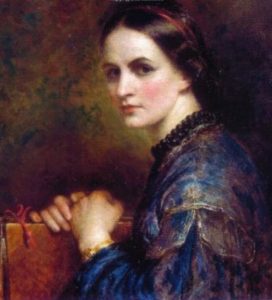 Anne Brontë (1820―1849) was the youngest of the famous Brontë sisters. This poem, written in 1848, was called “The Narrow Way” by Charlotte in her 1850 edition. The final line echoes the King James translation of Ephesians 1:14, where the Holy Spirit is referred to as “…the earnest [that is the pledge] of our inheritance.”
Anne Brontë (1820―1849) was the youngest of the famous Brontë sisters. This poem, written in 1848, was called “The Narrow Way” by Charlotte in her 1850 edition. The final line echoes the King James translation of Ephesians 1:14, where the Holy Spirit is referred to as “…the earnest [that is the pledge] of our inheritance.”Posted: 30 October 2019
-
Gary by William J. Danaher Jr
Gary
holding the lifeless boy
i tell his mother
he is
beautifulhis large hands promised
greatness
the mention of which
is a mystery
but with it
peace
enters the
roomunfulfilled promise is better
remembered
than none
at allhis tiny body deceivingly heavy
wiggling makes
living things
lightercold to the touch
the warmth
has left his
blanketdressed in blue
his body lovingly washed
nurtured
from
day oneloved from the beginning
she loves him
to the endyou will help me let him go
she said
but when I arrive
it is
too lateI cradle his body
dead to the world
he is alive
to Godand in that moment
my own life
leaves
me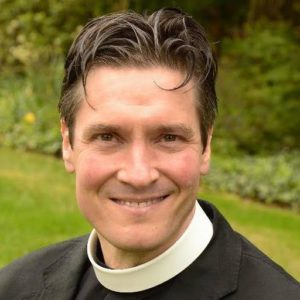 The Rev. Dr. William J. Danaher Jr. is an Episcopal Priest serving as Rector of Christ Church Cranbrook in Metro Detroit. He received his PhD from Yale University. He and his wife, Claire, have two daughters, Phoebe and Rose. This poem connects Ephesians 2:14 to an experience he had as a hospital chaplain in Washington, D.C.
The Rev. Dr. William J. Danaher Jr. is an Episcopal Priest serving as Rector of Christ Church Cranbrook in Metro Detroit. He received his PhD from Yale University. He and his wife, Claire, have two daughters, Phoebe and Rose. This poem connects Ephesians 2:14 to an experience he had as a hospital chaplain in Washington, D.C.Posted: 23 October 2019
-
Looking for Mt. Monadnock by Robert Siegel
Looking for Mt. Monadnock
———-She flowed into a foaming wave;
———-She stood Monadnoc’s head.
———-―Emerson, “The Sphinx”We see the sign, “Monadnock State Park”
as it flashes by, after a mile or twodecide to go back, “We can’t pass by Monadnock
without seeing it,” I say, turning around.We head down the side road―“Monadnock Realty,”
“Monadnock Pottery,” “Monadnock Designs,”but no Monadnock. Then the signs fall away―
nothing but trees and the darkening afternoon.We don’t speak, pass a clearing, and you say,
“I think I saw it, or part of it―a bald rock?”Miles and miles more. Finally, I pull over
and we consult a map. “Monadnock’s right there.”“Or just back a bit there.” “But we should see it―we’re
practically on top of it.” And driving backwe look―trees, a flash of clearing, purple rock―
but we are, it seems, too close to see it:It is here. We are on it. It is under us.
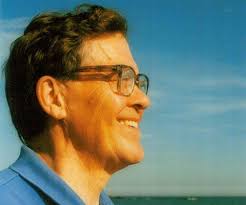 Robert Siegel (1939―2012) shared this poem with Eugene Peterson, when it was first written. In a chapter on Ephesians 1 in Practice Resurrection, Peterson shares the poem and says, “This practice-resurrection life, this growing-up-in-Christ life…is a Mt. Monadnock kind of life. We read the words, we see the signs…pray the prayers…But we never see what we expect to see.” This poem appears in Robert Siegel’s final collection ― Within This Tree of Bones: New & Selected Poems (2013, Poiema Poetry Series/Cascade Books).
Robert Siegel (1939―2012) shared this poem with Eugene Peterson, when it was first written. In a chapter on Ephesians 1 in Practice Resurrection, Peterson shares the poem and says, “This practice-resurrection life, this growing-up-in-Christ life…is a Mt. Monadnock kind of life. We read the words, we see the signs…pray the prayers…But we never see what we expect to see.” This poem appears in Robert Siegel’s final collection ― Within This Tree of Bones: New & Selected Poems (2013, Poiema Poetry Series/Cascade Books).Posted: 16 October 2019
-
To My Dear and Loving Husband by Anne Bradstreet
To My Dear and Loving Husband
If ever two were one, then surely we.
If ever man were loved by wife, then thee;
If ever wife was happy in a man,
Compare with me ye women if you can.
I prize thy love more than whole mines of gold,
Or all the riches that the East doth hold.
My love is such that rivers cannot quench,
Nor ought but love from thee give recompense.
Thy love is such I can no way repay;
The heavens reward thee manifold, I pray.
Then while we live, in love let’s so persever,
That when we live no more we may live ever.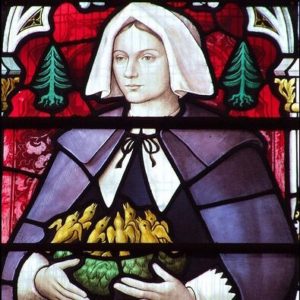 Anne Bradstreet (1612—1672) was a Puritan who emigrated to America in 1630, along with her parents and her husband — whom she had married when she was just sixteen. She was the first American woman to have a book published, and is considered by many to be America’s first poet. The opening sentence in this poem references Ephesians 5:31.
Anne Bradstreet (1612—1672) was a Puritan who emigrated to America in 1630, along with her parents and her husband — whom she had married when she was just sixteen. She was the first American woman to have a book published, and is considered by many to be America’s first poet. The opening sentence in this poem references Ephesians 5:31.Posted: 09 October 2019
-
Drawn by Laura Reece Hogan
Drawn
———-Ephesians 2:4-5
Even when we were dead you reached
us with your fiery fingers even deep in the darknether landscape, the flame at last catching, etching.
Not an easy thing to awaken to this burning, yet we turninto the blistering luster of it, eager for the mistakes
to erase in smoke. Twice I have seen the walls of my homeglow orange. The first, an inferno of wildfire reflected
its destructive image there, an unnatural midnight sun flickeringover a drawing of you (a penciled desire of a drawing of you),
your eyes closed in prayer. The second, persimmons alightin the dying autumn rays tinted the whole interior, a seeming
pastoral until I considered the still life of a body letting goin bright-dappled yield. Both blazes revealed your consuming
mercy. Our wings home to it, our antennae prickto the warm swelling updraft of it, the scoring and scorching
of the terrible approach, the blood-red falling awayof our transgressions. The likeness inside leaps to greet,
rushes to be brought to life, moths trembling into yourmagnetic heat as you render us in love.
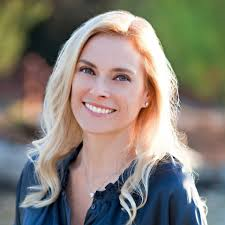 Laura Reece Hogan is the award-winning author of the poetry chapbook O, Garden Dweller (2017, Finishing Line) and the nonfiction book I Live, No Longer I: Paul’s Spirituality of Suffering, Transformation, and Joy (2017, Wipf & Stock). She is one of the poets featured in the new collection In A Strange Land: Introducing Ten Kingdom Poets (2019, Cascade). Her poems have appeared in such publications as America, Christian Century and Anglican Theological Review. She lives with her family in Southern California.
Laura Reece Hogan is the award-winning author of the poetry chapbook O, Garden Dweller (2017, Finishing Line) and the nonfiction book I Live, No Longer I: Paul’s Spirituality of Suffering, Transformation, and Joy (2017, Wipf & Stock). She is one of the poets featured in the new collection In A Strange Land: Introducing Ten Kingdom Poets (2019, Cascade). Her poems have appeared in such publications as America, Christian Century and Anglican Theological Review. She lives with her family in Southern California.Posted: 02 October 2019
-
Width, Length, Height, Depth by Tania Runyan
Width, Length, Height, Depth
———-—Jenny’s Canyon, Snow Canyon State Park, Utah
———-—Eph. 3:18There is something small
about the love of God.I clamber up a few rocks,
walk a hundred yardsthrough pink sand,
then feel the canyon wallsconverge on my shoulders.
Just skin, hawk song,my blood pounding
against fossils in the dark,my only movements my hands
channeling the marrowof sandstone. I can look nowhere
but up the sheer red wallspocked and hallowed
by chronicles of rain,forever closing
but never touching,in the gap
the whole sky caught. Poems For Ephesians has now accumulated a year’s worth of weekly poems. Like the inaugural Ephesians poem of one year ago, this poem is by Tania Runyan and is from her poetry collection Second Sky (2013, Poiema Poetry Series). This poem first appeared in The Other Journal. She and her family live in northern Illinois.
Poems For Ephesians has now accumulated a year’s worth of weekly poems. Like the inaugural Ephesians poem of one year ago, this poem is by Tania Runyan and is from her poetry collection Second Sky (2013, Poiema Poetry Series). This poem first appeared in The Other Journal. She and her family live in northern Illinois.Posted: 25 September 2019
-
The Faerie Queene by Edmund Spenser
from The Faerie Queene — Book I, Canto I
i
A Gentle Knight was pricking on the plaine,
Y cladd in mightie armes and silver shielde,
Wherein old dints of deepe wounds did remaine,
The cruell markes of many a bloudy fielde;
Yet armes till that time did he never wield:
His angry steede did chide his foming bitt,
As much disdayning to the curbe to yield:
Full jolly knight he seemd, and faire did sitt,
As one for knightly giusts and fierce encounters fitt.ii
But on his brest a bloudie Crosse he bore,
The deare remembrance of his dying Lord,
For whose sweete sake that glorious badge he wore,
And dead as living ever him ador’d:
Upon his shield the like was also scor’d,
For soveraine hope, which in his helpe he had:
Right faithfull true he was in deede and word,
But of his cheere did seeme too solemne sad;
Yet nothing did he dread, but ever was ydrad.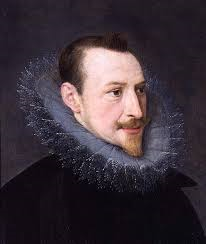 The Faerie Queene by Edmund Spenser (c.1552—1599) is one of the longest poems in the English language. Here Spenser writes of knights, as a way of speaking allegorically of different virtues. Paul’s description of “the armour of God” is clearly an influence for the poem.
The Faerie Queene by Edmund Spenser (c.1552—1599) is one of the longest poems in the English language. Here Spenser writes of knights, as a way of speaking allegorically of different virtues. Paul’s description of “the armour of God” is clearly an influence for the poem.Posted: 18 September 2019
-
Feet Shod by Mark D. Bennion
Feet Shod
———-Ephesians 6:15
Shoes laced up as if it’s the first time you’ve done so,
leather and synthetics suffering your soles.Toes wiggle around to see what room is available
and then a quick securing of knots—twins yawn in their blankets, ancestral phrases whispered
in morning light, shades of quiet anticipate breeze or storm.Just a moment of balance, then ballast settles in
against the barbs that may or may not cometo knock you sidelong or push you off such a narrow,
level path, even when you speak armistice,goodwill, peace, the kind that offers a coat
to the soldier accusing you of heresy, the kindthat bids serene elation—silent and jubilant—
causing you to rise amid threatswheeling about your helmet, breastplate, and shield. No fear,
now, even though you know what it means to stand. Mark D. Bennion is professor of English at BYU-Idaho. His poetry collections include Psalm & Selah (2009, Bentley Enterprises) and Forsythia (2013, Aldrich Press). His poems have appeared in The Cresset, Dappled Things, The Penwood Review, Spiritus, Windhover, and other literary journals. He lives with his wife and their five children in the Upper Snake River Valley.
Mark D. Bennion is professor of English at BYU-Idaho. His poetry collections include Psalm & Selah (2009, Bentley Enterprises) and Forsythia (2013, Aldrich Press). His poems have appeared in The Cresset, Dappled Things, The Penwood Review, Spiritus, Windhover, and other literary journals. He lives with his wife and their five children in the Upper Snake River Valley.Posted: 10 September 2019
-
Conductor by Mike Bonikowsky
Conductor
When it comes down, it comes down
Out of the dark heart of the nimbus
I can never see it coming,
Until I can see nothing else.It finds my outstretched fingers
Travels down my reaching arms
To turn my bones to filaments
And makes my heart to burn.I should be obliterated
Made so mortal a conductor
Of so furious a light
But he grounded me before he struckAnd being struck, I glow.
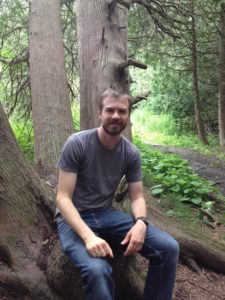 Mike Bonikowsky is a professional caregiver and unprofessional stay-at-home dad. His poems have appeared in Love Is Moving, Ekstasis, Nations Magazine, and the Journal of Disability and Religion. In 2017 he released his chapbook Cormorant Lord and Other Poems. He lives in Melancthon Township, Ontario, with his wife and two small children. “Conductor” comes from Ephesians 3:17-19.
Mike Bonikowsky is a professional caregiver and unprofessional stay-at-home dad. His poems have appeared in Love Is Moving, Ekstasis, Nations Magazine, and the Journal of Disability and Religion. In 2017 he released his chapbook Cormorant Lord and Other Poems. He lives in Melancthon Township, Ontario, with his wife and two small children. “Conductor” comes from Ephesians 3:17-19.Posted: 04 September 2019
-
At Table by Brad Davis
At Table
Infinitesimal and of no consequence
but for the daft valuation of divine love —by whom a body is made no larger,
no more visible from the ridge opposite,yet through whom a body is seated
in the heavenlies, where — this, a mystery —it offers no service at that high table.
And so a body is free of need to set for itselfa place at any earthly table, free indeed
to stand aside and, in the grace ofsuch a love, wait on all reclined around it.
Which is, of course, absurd — the veryidea of transcending value — even desperate.
To the praise of God: a body, nonsensical. Brad Davis is the author of eight collections, including Still Working It Out (Poiema Poetry Series) and is the Poetry Editor for The Mockingbird. He and his wife now live in Putnam, Connecticut. His poems have appeared in such journals as Poetry, Image, Paris Review, Ruminate, Connecticut Review, and Spiritus, and online at VerseDaily and Kingdom Poets. This poem was inspired by Ephesians 2:6.
Brad Davis is the author of eight collections, including Still Working It Out (Poiema Poetry Series) and is the Poetry Editor for The Mockingbird. He and his wife now live in Putnam, Connecticut. His poems have appeared in such journals as Poetry, Image, Paris Review, Ruminate, Connecticut Review, and Spiritus, and online at VerseDaily and Kingdom Poets. This poem was inspired by Ephesians 2:6.Posted: 28 August 2019
-
Longsuffering by John Poch
Longsuffering
The prisoner wants the only window’s
horizontal iron bars to rust, the raindrops
strung before the gray day after rain,
these unspendable coins purchasing
light and air, these upside-down opals
lined up like the pure eyes of guards
who have never witnessed battle.
The sun comes through, and his mind drifts
to some painter studying, tracing shadows
of outdoor plants on a piece of paper.Outside, little piles of dirt or ash
may seem the only audience, but leaves
break forth from them in time, little proverbs
with their green and silver sides.
For example—The fear of the Lord
is the beginning of wisdom.
On a bench near the wall listening
for the beauty in slow truth, a book
open to a beautiful sentence
almost sings of freedom
the same way the prisoner used to gentle
his horse, repeating her name, stroking
her silky ears because, after all,
he made her who she is, didn’t he?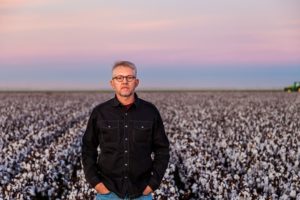 John Poch is the author six collections of poetry, two which were published this year: Texases (WordFarm) and Between Two Rivers (TTU Press—with photographer Jerod Foster). His work has been published in Poetry, Paris Review, the Nation, Yale Review, and other journals. He teaches at Texas Tech University in Lubbock. This poem first appeared in Image.
John Poch is the author six collections of poetry, two which were published this year: Texases (WordFarm) and Between Two Rivers (TTU Press—with photographer Jerod Foster). His work has been published in Poetry, Paris Review, the Nation, Yale Review, and other journals. He teaches at Texas Tech University in Lubbock. This poem first appeared in Image.Posted: 21 August 2019
-
The Ephesians Declaration by Emmanuel Chukwuebuka Akaolisa
The Ephesians Declaration
To the divine family
Bonded by love’s gracious eternal power and wisdom
How blessed are you, shall you ask whySee how you are drawn (out) by grace
From darkness and doom
Because you hold it at appearance, at sight
Hold it still
Hold it in meekness and reverence
By the voiceful tide of the precious blood
You will never sinkBy the mystery of the lamb
You are brought into the fold
Look on and live
The kingdom is not for you alone
Love!
Don’t grope and groan in the selfish dark
Let us keep on the light of charityAnd for battles without,
Your king is the greatest
Stay and walk with him
You will not go down forever Emmanuel Chukwuebuka Akaolisa, is an Igbo by tribe who resides in Kaduna state in northern Nigeria. He has a BSc in political science and a Masters in International Affairs and Diplomacy, both from Ahmadu Bello University, Zaria, Kaduna. Although he wants to resume his studies, local violence has been a problem — including having his place of business burned. He self-published Sometimes a Poet and the Peace of Wisdom in 2015.
Emmanuel Chukwuebuka Akaolisa, is an Igbo by tribe who resides in Kaduna state in northern Nigeria. He has a BSc in political science and a Masters in International Affairs and Diplomacy, both from Ahmadu Bello University, Zaria, Kaduna. Although he wants to resume his studies, local violence has been a problem — including having his place of business burned. He self-published Sometimes a Poet and the Peace of Wisdom in 2015.Posted: 14 August 2019
-
Morning Liturgy by Dan Baker
Morning Liturgy
Good morning again,
child of God.
Beloved of the Father,
as in the Son.
Wholly lived in holy hope,
weariness undone.
Unfinished, re-created,
crushed, crashed-crimson,
affliction abated.
Sustained assuagement,
inspirited allayment,
trust-sown: persuaded.
Worship-rested,
wreck-ready yet washed
in dawn’s drawn animation.Good morning, good morning.
Let light lay large upon your face.
May failure focus the works
of your hands-feet-heart-mind.
Little children, dear friends,
the last hour is here.
Escape the choke-hold of night.
Hold fast terminal healing,
cling to love incomprehensible, unyielding.
Lowly transcendence,
sordid modesty,
redeemed incitement
of radiant coronation.Consecrated illumination!
Sanctified sunrise in
abject approbation!
Daybreak fulfills
twilight’s renunciation.
Night recedent.
Silent lands baptised in gold.
Awaken, forebear sleep, rise up.
Good morning, again.
 Dan Baker’s poetry has appeared in Altarwork, Portage Magazine, and Tipton Poetry Journal. He is a regular contributor to the film criticism site CinemaFaith.com. He grew up among the cornfields of rural Wisconsin, but now lives with his family in Milwaukee’s Walker’s Point neighbourhood. This poem was inspired by Ephesians 5:8-14.
Dan Baker’s poetry has appeared in Altarwork, Portage Magazine, and Tipton Poetry Journal. He is a regular contributor to the film criticism site CinemaFaith.com. He grew up among the cornfields of rural Wisconsin, but now lives with his family in Milwaukee’s Walker’s Point neighbourhood. This poem was inspired by Ephesians 5:8-14.Posted: 07 August 2019
-
The Showing by Margo Swiss
The Showing
———-Ephesians 5:14
From a dead sleep—-I turned
at three o’clock—-whenYou showed me—-your manly heart
how bold—-how brave—-it beatamorous as any other
lover’s—-its rise and fallthat swelling surge of—-Love-
blood pumped—-burning clean througharteries and veins—-till
every cell sang—-breathlesslyexposed—-I asked You—-then aloud
come Lordand you came—-so sharply
I cried out—-in praiseto You
in me. Margo Swiss teaches English and Creative Writing at York University. Her books include: The Hatching of the Heart (2015, Poiema Poetry Series) and the anthology, Poetry As Liturgy (2007, The St, Thomas Poetry Series). She and her husband, David Kent, live in Toronto.
Margo Swiss teaches English and Creative Writing at York University. Her books include: The Hatching of the Heart (2015, Poiema Poetry Series) and the anthology, Poetry As Liturgy (2007, The St, Thomas Poetry Series). She and her husband, David Kent, live in Toronto.Posted: 31 July 2019
-
As Kingfishers Catch Fire by Gerard Manley Hopkins
As Kingfishers Catch Fire
As kingfishers catch fire, dragonflies draw flame;
As tumbled over rim in roundy wells
Stones ring; like each tucked string tells, each hung bell’s
Bow swung finds tongue to fling out broad its name;
Each mortal thing does one thing and the same:
Deals out that being indoors each one dwells;
Selves — goes itself; myself it speaks and spells,
Crying Whát I dó is me: for that I came.I say móre: the just man justices;
Keeps grace: thát keeps all his goings graces;
Acts in God’s eye what in God’s eye he is —
Chríst — for Christ plays in ten thousand places,
Lovely in limbs, and lovely in eyes not his
To the Father through the features of men’s faces.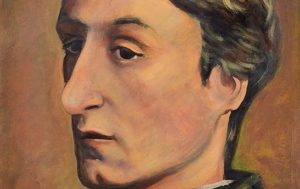 Gerard Manley Hopkins (1844—1889) is one of the 19th century’s most influential poets. In this sonnet, Hopkins reflects on how creation lives according to God’s desire, but that God works out his justice and grace in redeemed people as their wills merge with God’s will. Two of the passages Hopkins had been reflecting on in this are Ephesians 3:16-19, and Ephesians 2:10.
Gerard Manley Hopkins (1844—1889) is one of the 19th century’s most influential poets. In this sonnet, Hopkins reflects on how creation lives according to God’s desire, but that God works out his justice and grace in redeemed people as their wills merge with God’s will. Two of the passages Hopkins had been reflecting on in this are Ephesians 3:16-19, and Ephesians 2:10.Posted: 24 July 2019
-
By Grace Are Ye Saved by Paul J. Willis
By Grace Are Ye Saved
It’s a Saturday. I am practicing scales on the piano
when the doorbell rings—and I’m glad
to have a reason to stop. A huddle of strangers,
all in black, looms through the panel of wavy glass.“Mom?” I call. She limps from the kitchen,
opens the door, stands firm. “Good morning,”
they say, chorus-like, men and women—skirts, ties.
“Are you sure of your salvation when the end cometh?”says one of the men. He holds out what looks to me
like a comic book. The Watchtower. My mother recoils.
“May we come inside?” says one of the women.
My mother keeps hold of the door. “I’m sorry,” she says.And then, like the girl she was in Sunday School,
rattling off her memory verse: “For by grace are ye saved
through faith: and that not of yourselves: it is the gift of God:
Not of works, lest any man should boast.” Her face has gonea little red. “Ephesians 2:8-9,” she adds apologetically.
And she quietly shuts the door in their faces. She turns
to me then—me, watching from the piano bench. She is
trembling. And I know that, somehow, I have been saved.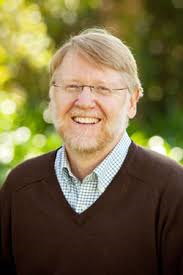 Paul J. Willis is the author of six poetry collections, including Say This Prayer Into The Past (2013, Poiema Poetry Series) and Little Rhymes For Lowly Plants (2019, White Violet Press). He has been a professor at Westmont College for thirty years, and is the former Poet Laureate of Santa Barbara, California.
Paul J. Willis is the author of six poetry collections, including Say This Prayer Into The Past (2013, Poiema Poetry Series) and Little Rhymes For Lowly Plants (2019, White Violet Press). He has been a professor at Westmont College for thirty years, and is the former Poet Laureate of Santa Barbara, California.Posted: 17 July 2019
-
Where Is Ephesus? Where, the Ephesians? by Maryanne Hannan
Where Is Ephesus? Where, the Ephesians?
(To ‘αγιοις, sanctis, the Holy Ones at Ephesus)
Keep in mind always the riches of glory
———-his inheritance among the holy onesThings to know before you go
How hot it is—–How little shade—–Challenging
For the differently abled—–Watch uneven stone surfacesFor he is our peace making all peoples one
———-breaking down the walls of enmityA must-see for history and archaeology buffs
UNESCO wonder—–World Heritage site
Rise and demise of cultures—–Diorama in real timeWhen the plan of mystery is brought to light
———-that which has been hidden from ages pastHere, one of the Seven Wonders of the Ancient World
Temple of Artemis—–Even pillaging Xerxes had mercy
Look for the single column which remains—–RubbleWith the armor of God, hold your ground, stand fast
———-your feet shod in readiness for peaceA city century-challenged to save its silt-filled harbor
Dredging—–Building—–Moving
A non-city now—–Eight kilometers to the sea Maryanne Hannan has published poems in many journals and anthologies, including Windhover, Cresset, Christianity and Literature, and The World Is Charged: Poetic Engagements with Gerard Manley Hopkins. A former Latin teacher, she lives in upstate New York. “Where Is Ephesus? Where, the Ephesians?” emerged from a tourist visit to Ephesus many years ago. Her book Rocking like It’s All Intermezzo: 21st Century Psalms Responsorials will soon appear from Resource Publications.
Maryanne Hannan has published poems in many journals and anthologies, including Windhover, Cresset, Christianity and Literature, and The World Is Charged: Poetic Engagements with Gerard Manley Hopkins. A former Latin teacher, she lives in upstate New York. “Where Is Ephesus? Where, the Ephesians?” emerged from a tourist visit to Ephesus many years ago. Her book Rocking like It’s All Intermezzo: 21st Century Psalms Responsorials will soon appear from Resource Publications.Posted: 10 July 2019
-
The Word by Bill McCloud
The Word
My father was one of just a
few white ministers in northern
Oklahoma in the sixties willing
to preach in Black churches to
even go inside Black churchesIt gave him joy on top of joy
The Word he said The Word
is what we need wherever we
are and whoever we’re with
The Word is all we needHis funeral in the mid-eighties
was one of the largest in our town’s
history and it was a diverse group of
people who merged into a line of
mourners and The Word was there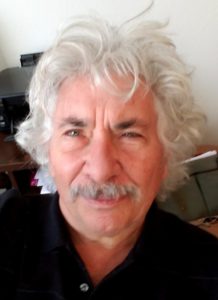 Bill McCloud finds many connections between his poem and Ephesians (1:10; 2:14; 4:5; 4:25; and 6:24). In 2017 The Smell of the Light, his poetry collection dealing with his own first-hand experience of the Vietnam War, appeared from Balkan Press. He teaches U.S. History at Rogers State University and lives in Pryor, Oklahoma.
Bill McCloud finds many connections between his poem and Ephesians (1:10; 2:14; 4:5; 4:25; and 6:24). In 2017 The Smell of the Light, his poetry collection dealing with his own first-hand experience of the Vietnam War, appeared from Balkan Press. He teaches U.S. History at Rogers State University and lives in Pryor, Oklahoma.Posted: 03 July 2019
-
Ephesians with Coffee by Emma Kemp
Ephesians with Coffee
The unsearchable riches of Christ… Ephesians 3:8
This letter; this truth packed fine and tight
like a new brick of coffee in the morning.
A pause on the edge. A deep, pacifying breath.A decision. To move in
an incision, an awkward tear,
grit showered in every direction.Such truth, such depth, such wild,
uncountable grains; such unruly
shower of sparks to set us reeling.This is truth unsearchable. Though
we are swimming in it, we cannot grasp it;
it eludes us and slips through our fingers.Yet. Everything that is illuminated
becomes a light. Pause again,
regather scattered grains to a heap,pack down. Let crystal clear water
filter through, cup the perfumed stream.
It is enough to know there is glory, and breathe.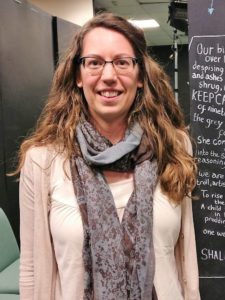 Emma Kemp lives and writes in Coventry, England, where she is active in the local poetry scene. She won the 2018 Theatre Absolute Pillar Poetry competition with her poem Phoenix, a call to action about the choice between the collapse and redemption of a city. Her work tends to focus on the natural world and finding hope in dark places.
Emma Kemp lives and writes in Coventry, England, where she is active in the local poetry scene. She won the 2018 Theatre Absolute Pillar Poetry competition with her poem Phoenix, a call to action about the choice between the collapse and redemption of a city. Her work tends to focus on the natural world and finding hope in dark places.Posted: 26 June 2019
-
Jesus, The Very Thought Of Thee by Bernard of Clairvaux
Jesus, The Very Thought of Thee
Jesus, the very thought of thee
with sweetness fills the breast;
but sweeter far thy face to see,
and in thy presence rest.O hope of every contrite heart,
O joy of all the meek,
to those who fall, how kind thou art!
How good to those who seek!But what to those who find? Ah, this
nor tongue nor pen can show;
the love of Jesus, what it is,
none but his loved ones know.Jesus, our only joy be thou,
as thou our prize wilt be;
Jesus, be thou our glory now,
and through eternity.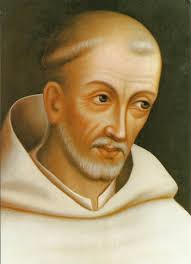 This hymn is believed to have been written by Bernard of Clairvaux (1090—1153), and relates to Ephesians 3:19 — “and to know this love that surpasses knowledge — that you may be filled to the measure of all the fullness of God.” The hymn was translated by Edward Caswall. For more information, and a fifteen stanza version of this poem, visit http://kingdompoets.blogspot.com/2015/11/bernard-of-clairvaux.html
This hymn is believed to have been written by Bernard of Clairvaux (1090—1153), and relates to Ephesians 3:19 — “and to know this love that surpasses knowledge — that you may be filled to the measure of all the fullness of God.” The hymn was translated by Edward Caswall. For more information, and a fifteen stanza version of this poem, visit http://kingdompoets.blogspot.com/2015/11/bernard-of-clairvaux.htmlPosted: 19 June 2019
-
Husbands by Michael Stalcup
Husbands
What if, instead of focusing our thoughts
upon the speck that’s in our sister’s eye,
teaching “submit,” we do what Jesus taught?
Submit ourselves to Scripture—dare to climb
that Everest: “Husbands, love your wives as Christ
has loved the church.” Men, stop and linger there
before his love, before his sacrifice,
his dreams laid down, his agonizing prayer.
He, worthy of all worship, washed our feet.
He, never wrong, yet chose the way of loss.
He, King of Kings, embraced humility,
gave up his rights—submitted to the cross.
He modeled how we men should lead: he died.
The greatest is a servant to his bride. Michael Stalcup is a campus missionary in Bangkok, Thailand, who serves with Thai Christian Students. His poems have appeared in Ekstasis Magazine, Faithfully Magazine, Inheritance Magazine, Poets Reading the News, and Visible Poetry Project. You can find more of his poetry at www.michaelstalcup.com. He and his wife have three young children.
Michael Stalcup is a campus missionary in Bangkok, Thailand, who serves with Thai Christian Students. His poems have appeared in Ekstasis Magazine, Faithfully Magazine, Inheritance Magazine, Poets Reading the News, and Visible Poetry Project. You can find more of his poetry at www.michaelstalcup.com. He and his wife have three young children.Posted: 12 June 2019
-
The Shard Lodged Under A Rib by Susan Cowger
The Shard Lodged Under A Rib
Ephesians 2:22 — In whom ye also are builded together for an habitation of God through the Spirit.
———-Dear God
I assume a lodging has been hollowed out
———-For you
Behind breastbone or lung
———-A grotto
———-Where collarbones meet
———-Pointing toward
An ancient and forgotten chamber of the heart
———-A haven for the Ghost himself
———-My God
Could it be
———-A boat
———-In all this blood
Riding the torrent that moves to save
———-Tendon and gristle
———-Gliding guiding the squall
Of doubt and argument
———-Where the two sides of my face leak vowels
———-Curdled and peevish
When I call to you and hear
———-Gibberish
———-It’s so hard to know
How you get around
———-Emptiness that is full
———-Of snot and pride
You of all things
———-Comingling
———-Shame and…The prayer ends here
———-Eyes flicker open
———-Then closeTo what can never be known
———-Small ripples
———-Dance down the spine Susan Cowger of Cheney, Washington, is the author of the poetry chapbook Scarab Hiding from Finishing Line Press. She also received honorable mention in The MacGuffin 2015 National Poet Hunt Contest. She is one of the founding editors of Rock & Sling. Her poetry has been selected for In A Strange Land: Introducing Ten Kingdom Poets (Poiema Poetry Series).
Susan Cowger of Cheney, Washington, is the author of the poetry chapbook Scarab Hiding from Finishing Line Press. She also received honorable mention in The MacGuffin 2015 National Poet Hunt Contest. She is one of the founding editors of Rock & Sling. Her poetry has been selected for In A Strange Land: Introducing Ten Kingdom Poets (Poiema Poetry Series).Posted: 05 June 2019
-
Rich in Mercy by Theresa Monteiro
Rich in Mercy
The gift of the Son of Man is free.
Salvation springs up around our feet,
given without our asking,
growing though we’re not deserving,
sprouting like grain from the earth.
The harvest of every man’s land, this grace,
pushes up through soil like golden braids—
bread of life, for you.But my brethren:
You must pick it up.
You must bend your knees,
fall to the ground, reap what is free,
take redemption into your hands,
thresh it, grind it, bake it, bless it.
This is heavy work, but it is good work. Theresa Monteiro is a student in the M.F.A. program at the University of New Hampshire. She has had poems published in Good Fat Poetry and Silver Needle Press. She lives in New Hampshire with her husband and six children. “Rich in Mercy” reflects on Ephesians 2:4.
Theresa Monteiro is a student in the M.F.A. program at the University of New Hampshire. She has had poems published in Good Fat Poetry and Silver Needle Press. She lives in New Hampshire with her husband and six children. “Rich in Mercy” reflects on Ephesians 2:4.Posted: 29 May 2019
-
Resuscitation by Glen Soderholm
Resuscitation
But God, who is rich in mercy, out of the great love with which he loved us even when
we were dead through our trespasses – made us alive together with Christ (Eph. 2: 4 – 5a)It’s difficult when others don’t know you are dead,
—–for they might treat you differently if they did:
perhaps a slight easing of the expectations
—–around lateness and poor attendance,
———-not to mention personal grooming;
a noticeable toning down of sarcasm over
—–unfinished projects, or misplaced keys.And maybe, the admission
—–your heart has stopped beating,
is not just a poor excuse
—–to avoid scraping egg off the plate,
———-or practicing minor scales,
but has freed you to gasp, slack-jawed, at love
—–surging from the lungs of God.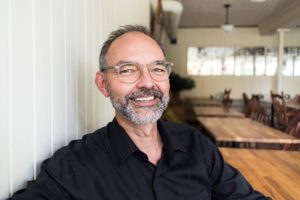 Glen Soderholm is pastor of Two Rivers Church a church plant in downtown Guelph, Ontario. He is a singer/songwriter/recording artist who also directs Moveable Feast Resources, an organization that offers encouragement to the church in the areas of worship and missional church. He is married to Sharon and has two daughters Danielle and Julia.
Glen Soderholm is pastor of Two Rivers Church a church plant in downtown Guelph, Ontario. He is a singer/songwriter/recording artist who also directs Moveable Feast Resources, an organization that offers encouragement to the church in the areas of worship and missional church. He is married to Sharon and has two daughters Danielle and Julia.Posted: 22 May 2019
-
Full Flower Moon by Julie L. Moore
Full Flower Moon
The moon tonight smells like linen,
clean & pressed, spreading
its blue fabric over not just May’s fieldsbut the willow by the pond,
the hens in the one-window coop,
the Lab on the lawn,poking her nose into the myrtle.
The sky tastes like a mug of tea,
warm & smooth with cream,served at a welcoming table.
Should God suddenly speak,
the phlox would not be flummoxedor the red-tailed fox baffled.
After all, green already
pulses through everything,its rhythm in sync with this full
flower moon & the worm
below, writing a new word in dirt.Would it really be so strange
if the still, small voice broke open
like a bulb beneath the earth,then aired something sensible
as the strong stem lifting high
its lit lantern, signaling usto join in, do what we were made to do?
 Julie L. Moore is Professor of English at Taylor University. “Full Flower Moon” (one of the traditional names for May’s full moon) is from her most recent poetry collection Full Worm Moon (2018, Poiema Poetry Series). It is inspired by Ephesians 2:10 (as is the title of the poetry series!)
Julie L. Moore is Professor of English at Taylor University. “Full Flower Moon” (one of the traditional names for May’s full moon) is from her most recent poetry collection Full Worm Moon (2018, Poiema Poetry Series). It is inspired by Ephesians 2:10 (as is the title of the poetry series!)Posted: 15 May 2019
-
I Sang in Darkness by John C. Mannone
I Sang in Darkness
—–On the occasion of a special birthday
The bathroom light
flickers out. I bathe
in darkness, hot water
spraying all over my body,
my unclean skin. Steam
engulfs me, my thoughts
on the inside search
for holy water. Baptized
in darkness for so long
before I felt the slant
of light lavishly pour
into my soul—
but today I remember.~~~
I’m alone
in a restaurant booth,
but you are here
so my heart
is not troubled.I order a Pinot noir
to toast to you,
and the basket
of bread on the table
makes me remember
your holy words.I lift my voice
as I break
bread, bless wine,
thank you
for your sacrifice.
I sing in the light of praise,
in shadows of the cross.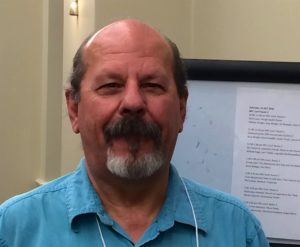 John C. Mannone is the author of three poetry collections, including the forthcoming Flux Lines (Linnet’s Wings Press), and is the president of the Chattanooga Writers’ Guild. He is a retired physics professor, living in Tennessee. This poem relates to Paul’s words in Ephesians 5:8.
John C. Mannone is the author of three poetry collections, including the forthcoming Flux Lines (Linnet’s Wings Press), and is the president of the Chattanooga Writers’ Guild. He is a retired physics professor, living in Tennessee. This poem relates to Paul’s words in Ephesians 5:8.Posted: 08 May 2019
-
Astrophysics by Patricia L. Hamilton
Astrophysics
Eph. 4:10
When Jesus ascended to heaven —
his scruffy band staring skyward,
slack-mouthed, crick-necked —did he corkscrew into a wormhole
and Bigbang out the other end,
Light in whom we see light,Morning Star,
exploding into Godglory
to fuse again with the Fatherforcewith the propulsive power
of a billion flaring supernovae
flinging stardustacross a million galaxies?
Who says Love cannot be
both particle and wave?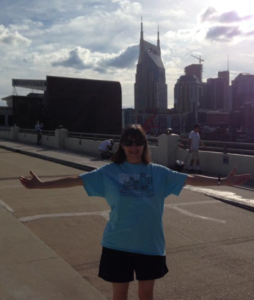 Patricia L. Hamilton is a professor of English at Union University in Jackson, Tennessee. She won the Rash Award in Poetry in both 2015 and 2017, and has received 3 Pushcart nominations. Her first collection, The Distance to Nightfall, was published by Main Street Rag (2014).
Patricia L. Hamilton is a professor of English at Union University in Jackson, Tennessee. She won the Rash Award in Poetry in both 2015 and 2017, and has received 3 Pushcart nominations. Her first collection, The Distance to Nightfall, was published by Main Street Rag (2014).Posted: 01 May 2019
-
God Moves In A Mysterious Way by William Cowper
God Moves In A Mysterious Way
God moves in a mysterious way
His wonders to perform;
He plants His footsteps in the sea
And rides upon the storm.Deep in unfathomable mines
Of never-failing skill
He treasures up His bright designs
And works His sovereign will.Ye fearful saints, fresh courage take;
The clouds ye so much dread
Are big with mercy and shall break
In blessings on your head.Judge not the Lord by feeble sense,
But trust Him for His grace;
Behind a frowning providence
He hides a smiling face.His purposes will ripen fast,
Unfolding every hour;
The bud may have a bitter taste,
But sweet will be the flower.Blind unbelief is sure to err
And scan His work in vain;
God is His own interpreter,
And He will make it plain.William Cowper (1731—1800) is best known for the hymns he wrote, such as “There is a Fountain Filled with Blood.” His first poetry collection — Poems by William Cowper, of the Inner Temple — was published in 1782. This poem intertwines well with Ephesians 1:9 “Having made known unto us the mystery of his will, according to his good pleasure which he hath purposed in himself…”
Posted: 24 April 2019
-
The Plan by Amy L. George
The Plan
Ephesians 2:10
In the beginning,
his blueprint unfurled across the stars.
He dreamed, then spoke life into the silence,
and called it Good.His workshop full of fingerprints,
he scripts names and dates with light,
dictates plans for minutes and lifetimes.His breath calls cells to assemble.
Each molecule pulsates with possibility.
He measures the length of our days across his palm.He fashions our gifts as his tools,
in the room of his thoughts of us
that has no walls and no ceiling.As we live, he still crafts.
He turns the clay within his fingers
thoughtfully, deliberately,until the shape is just so.
Until our eyes notice others.
Until the heart can measure choice
in the scale of the mind.Until we realize his work has been placed
in our palms.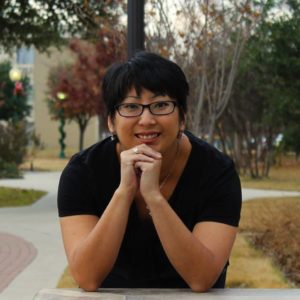 Amy L. George is an English professor at Southwestern Assemblies of God University in Waxahachie, Texas. Her poetry collections include The Stopping Places (2018), and Desideratum (2013) both from Finishing Line Press, and The Fragrance of Memory (2009, Amsterdam Press).
Amy L. George is an English professor at Southwestern Assemblies of God University in Waxahachie, Texas. Her poetry collections include The Stopping Places (2018), and Desideratum (2013) both from Finishing Line Press, and The Fragrance of Memory (2009, Amsterdam Press).Posted: 17 April 2019
-
Ephesians— To the Glory by Diane Glancy
Ephesians— To the Glory
Someone wrote them for me.
But they are my letters.
If not hand-writ by me— written by another through me.To the praise of the glory of his grace.——————————(Eph. 1:6,12,14)
A letter to believers—
that they would succumb to the grace I tell them of—
that they might know the habitation of God— its breadth,
length, depth, height.——————————————— ——–(Eph. 3:18)Christ descending and ascending————————————(Eph. 4:9)
ordered with reason.A pleading is there— Awake——————————————–(Eph. 5:14)
An admonition—
that in the dispensation of the fullness of times
he might gather together in one
all things in Christ,
both which are in heaven, and which are on earth.———–(Eph. 1:10)Pray the utterance might be given—
that I may open my mouth boldly to make known
the mystery of the gospel———————————————–(Eph. 6:19)
to the praise of the glory of his grace.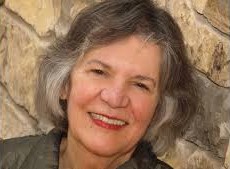 Diane Glancy has written extensively as a poet, novelist, playwright, and nonfiction writer. Her most recent book is the poetry collection The Book of Bearings — the most-recent title in the Poiema Poetry Series from Cascade Books. As a poet she has published twenty titles — including both chapbooks and full-length collections. Glancy has received many awards including a Minnesota Book Award, an American Book Award, the Pablo Neruda Prize for Poetry, and an Oklahoma Book Award.
Diane Glancy has written extensively as a poet, novelist, playwright, and nonfiction writer. Her most recent book is the poetry collection The Book of Bearings — the most-recent title in the Poiema Poetry Series from Cascade Books. As a poet she has published twenty titles — including both chapbooks and full-length collections. Glancy has received many awards including a Minnesota Book Award, an American Book Award, the Pablo Neruda Prize for Poetry, and an Oklahoma Book Award.Posted: 10 April 2019
-
Story of the One Man by Debbie Sawczak
Story of the One Man (Ephesians 2:11-19)
When I was a boy of thirteen
they milled about the gate
on the wall’s other side,
their eyes cast down
by our sidewise gaze
as we set out for home after worship,
Abba and me.One boy my age dared look me in the eye.
His father had the lightened face of forgiven penitence
and his murmured prayer in uncouth Latin syllables
of caesars and soldiers
had the earnest ring of reality
I sometimes heard in my father’s.
But I knew those lawless and uncircumcised,
their longing notwithstanding,
had God’s love less.
You’ve no business here,
I felt like saying;
your unclean idol prayers will not be heard.
But I only scowled and spit.
He scuffed dung-flecked dust in our general direction
with the toe of his sandal.No way that wall could fall,
Abba had said,
let alone be rebuilt in three days.But at thirty, at night on my bed,
I knew.
Not all the blood of bulls and turtledoves
tithes
recited psalms
or prayers
would erase that writ.That all seems like another, long-ago life.
We worship now in a Temple not made by hands
—One without a wall.
Gaius and I are forty.
In pale dawn
on the Day of Remembering the Rising,
we sit down side by side,
sip wine,
hand round hunks of holy bread
and sing.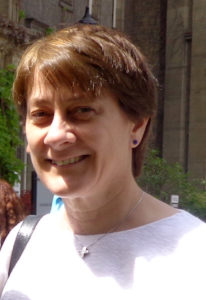 Debbie Sawczak’s poems have appeared in Crux, Writual, the U.C. Review, McMaster Journal of Theology and Ministry, and in the anthology Adam, Eve, & the Riders of the Apocalypse. Debbie’s work as a bookseller and professional editor gives her additional pathways into the beloved and stimulating world of text. She and her husband live in Georgetown, Ontario; they have three adult sons. Her poetry has been selected for In A Strange Land: Introducing Ten Kingdom Poets (Poiema Poetry Series).
Debbie Sawczak’s poems have appeared in Crux, Writual, the U.C. Review, McMaster Journal of Theology and Ministry, and in the anthology Adam, Eve, & the Riders of the Apocalypse. Debbie’s work as a bookseller and professional editor gives her additional pathways into the beloved and stimulating world of text. She and her husband live in Georgetown, Ontario; they have three adult sons. Her poetry has been selected for In A Strange Land: Introducing Ten Kingdom Poets (Poiema Poetry Series).Posted: 03 April 2019
-
Walking in Love by Martin Willits Jr
Walking in Love
(And) walk in love, as Christ loved us and gave himself up for us… — Ephesians 5:1–2
What would you do to walk in Christ’s steps?
So many confront us on the way.
Knock on doors until someone lets you in.What would you give up?
Shed anger like a snake sheds its skin.
Whatever remains will be a new song.How far would you travel?
No one will toss palm leaves
where you walk to cushion your feet.Who would you not love?
Be a fisherman casting a net
to find new friends.Are you ready to prostrate yourself?
It is hard to walk in love.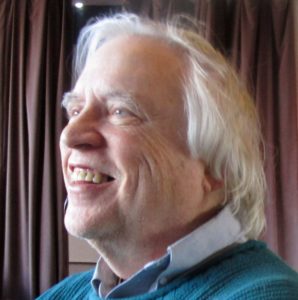 Martin Willitts Jr is the author of 24 chapbooks and 14 full-length collections including The Uncertain Lover (Dos Madres Press, 2018), and Home Coming Celebration (FutureCycle Press, 2019). He has won such awards as the 2014 Dylan Thomas International Poetry Award, and the Stephen A. DiBiase Poetry Prize, 2018. He is a poetry editor for Comstock Review.
Martin Willitts Jr is the author of 24 chapbooks and 14 full-length collections including The Uncertain Lover (Dos Madres Press, 2018), and Home Coming Celebration (FutureCycle Press, 2019). He has won such awards as the 2014 Dylan Thomas International Poetry Award, and the Stephen A. DiBiase Poetry Prize, 2018. He is a poetry editor for Comstock Review.Posted: 27 March 2019
-
Detail of a Peacock by Jen Stewart Fueston
Detail of a Peacock
Nestling in the niche between the chapel’s crumbling
arches, his long blue neck plucks nibbles of tessera.He wanders through mosaic parables like something risen
out of time, wearing fashion all wrong for Byzantium—a jaunty tri-plume hat in an age of halos. You presume
at first this must have been a gold-leaf sermon contravanity, or like those tapestry-arrested unicorns, an
attempt to tame our lusts of flesh. His sumptuous bluefeathers with their knowing eyes seem destined
for a harem girl’s accessory, so what are they doing here?What Augustine wrote at Carthage, though, unveils
the peacock’s changing reputation, that beforeits current turn as vain pretender, or the empty suit,
the Church discovered peacock flesh does not decay.So poke at any early Christian tomb and there
they preen, depictions of life that does not die, theincorruption of brief bodies made eternal. How every
year a feather’s molt returns brighter and more beautiful.This long-necked fellow settles into tessellation,
his plumage not quite all unfurledso not to draw too much attention, but whispers that
he’s hiding here for now, a creature caughtin colored bits of glass, waiting till these ruins
are restored to make his move. Jen Stewart Fueston has taught writing at the University of Colorado, Boulder, and in Hungary, Turkey, and Lithuania. “Detail of a Peacock,” which first appeared in The Cresset, draws on early church imagery, and echoes Ephesians 1:18, and 2:6 & 7. Her two chapbooks are: Visitations (2015) and Latch (2019, River Glass Books). Her poetry has been selected for In A Strange Land: Introducing Ten Kingdom Poets (Poiema Poetry Series).
Jen Stewart Fueston has taught writing at the University of Colorado, Boulder, and in Hungary, Turkey, and Lithuania. “Detail of a Peacock,” which first appeared in The Cresset, draws on early church imagery, and echoes Ephesians 1:18, and 2:6 & 7. Her two chapbooks are: Visitations (2015) and Latch (2019, River Glass Books). Her poetry has been selected for In A Strange Land: Introducing Ten Kingdom Poets (Poiema Poetry Series).Posted: 20 March 2019
-
Prison by David C. Brown
Prison
They put Paul in a prison
———-And they clapped him in a chain;
The devil thought, “I’ve got him,
———-And he’ll never serve again”.
Did Paul become despondent
———-Or did he make a fuss?
He just sat and wrote the epistle
———-To the saints in Ephesus.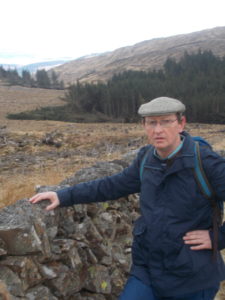 David C. Brown was born in Edinburgh, Scotland, and has lived there or in its neighbourhood most of his life. He has published privately through www.lulu.com, and on his blog, https://dcbverse.blogspot.com/ . He has been writing verse in varying styles for about fifty years now, while working as a minor civil servant, trusting it is to the glory of God. He is fond of stravaiging in the Scottish hills.
David C. Brown was born in Edinburgh, Scotland, and has lived there or in its neighbourhood most of his life. He has published privately through www.lulu.com, and on his blog, https://dcbverse.blogspot.com/ . He has been writing verse in varying styles for about fifty years now, while working as a minor civil servant, trusting it is to the glory of God. He is fond of stravaiging in the Scottish hills.Posted: 13 March 2019
-
Sonnet XVI by John Donne
Sonnet XVI
Father, part of his double interest
Unto thy kingdom, thy Son gives to me,
His jointure in the knotty Trinity
He keeps, and gives to me his death’s conquest.
This Lamb, whose death, with life the world hath blessed,
Was from the world’s beginning slain, and he
Hath made two wills, which with the legacy
Of his and thy kingdom, do thy sons invest.
Yet such are thy laws, that men argue yet
Whether a man those statutes can fulfill;
None doth, but thy all-healing grace and Spirit
Revive again what law and letter kill.
Thy law’s abridgement, and thy last command
Is all but love; oh let that last will stand!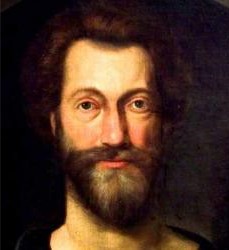 John Donne (1572—1631) is perhaps the most influential Christian poet of the 17 century. He was dean of St. Paul’s Cathedral in London for the last decade of his life. This poem — one of his Holy Sonnets — rejoices in the central Biblical truth, that God gives us all things; every spiritual blessing in Christ (Romans 8:32; Ephesians 1:3).
John Donne (1572—1631) is perhaps the most influential Christian poet of the 17 century. He was dean of St. Paul’s Cathedral in London for the last decade of his life. This poem — one of his Holy Sonnets — rejoices in the central Biblical truth, that God gives us all things; every spiritual blessing in Christ (Romans 8:32; Ephesians 1:3).Posted: 06 March 2019
-
Dawning by Peter Kazmaier
Dawning
He came into my home
Not as a storm
Beating open doors and shutters
But as gentle light
Filtering around door frames
———-Piercing cracks
———-Lighting thinning curtains
Illuminating my deep darkness
Somber shadows stabbed
With gentle light.Where light touched
———-Boards became boughs
———-Lintels leaves
———-Cellar posts rooted the earth
New limbs reached for the sun
———-Upward, upward, upward.The Tree of Life.
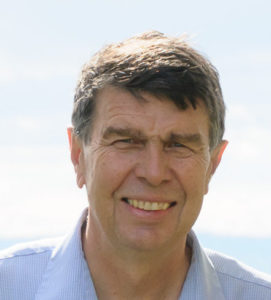 Peter Kazmaier of Mississauga, Ontario is primarily known as a novelist of Speculative Fiction – particularly as the author of The Halcyon Dislocation (2012) and its sequels. The third instalment in the cycle, Descent into Abaddon, is soon to appear in 2019. “Dawning” arose from his reading of Ephesians 3:14-19.
Peter Kazmaier of Mississauga, Ontario is primarily known as a novelist of Speculative Fiction – particularly as the author of The Halcyon Dislocation (2012) and its sequels. The third instalment in the cycle, Descent into Abaddon, is soon to appear in 2019. “Dawning” arose from his reading of Ephesians 3:14-19.Posted: 27 February 2019
-
A Poem About the Body of Christ by Zach Czaia
A Poem About the Body of Christ
My steps up the carpeted aisle
feel like another man’s steps.
The soft amen
when the gentle old lady holds up the host
feels like another man’s amen.
The tongue is mine, though.
I lay the host atop it.
What I mean is that didn’t have to be me.
It didn’t have to be me held and loved by my mother and father as a baby.
It didn’t have to be me held and loved by Cristina next to me in the pew.
But it was. It is.
I thank you, God. I don’t understand.Cristina’s dark brown hair is tinged with red.
When I watch it shot through with sunlight
I can see the auburn glow.
As she sleeps I touch her beautiful, broad nose.
I lay the thoughts in my mind
on the bed beside us. They sing softly
for the breaking of the day. Zach Czaia is a poet, editor, and playwright living and working in Chicago. His first collection of poetry, Saint Paul Lives Here (In Minnesota) was published in 2015 with Wipf & Stock. His poems have appeared in such places as The Other Journal and Sojourners. This poem is drawn from reflections upon Ephesians 4:1-16.
Zach Czaia is a poet, editor, and playwright living and working in Chicago. His first collection of poetry, Saint Paul Lives Here (In Minnesota) was published in 2015 with Wipf & Stock. His poems have appeared in such places as The Other Journal and Sojourners. This poem is drawn from reflections upon Ephesians 4:1-16.Posted: 20 February 2019
-
Voices Raised by Marjorie Maddox
Voices Raised
—–Ephesians 2:19
No longer strangers and foreigners,
we’re fellow citizens with the saints—native and naturalized jointly
inhabitants of the ethereal,mercy in perpetuity—
a claim so strange it rewritesall requirements of residency,
every psyche’s by-laws.No longer partitioned off
by sin, by regret, by self-righteousness;on reservations, on street corners;
behind walls; behind barbed wire;behind preconceived Hallelujahs & Amens;
flat blessings and fat cursesof who, what, where, when, why
we are; behind and for all, yeswe sing acapella & instrumental,
harmony & melody;we sing citizenship & pledge;
throughout the holy household,with our off-key, shrill, and wobbly
human notes, by God we sing! Marjorie Maddox is a professor of English at Loch Haven University in Pennsylvania, and director of the Creative Writing Program there. She is the author of several poetry collections — including most-recently True, False, None of the Above (Poiema Poetry Series) which is an Illumination Book Award Medalist.
Marjorie Maddox is a professor of English at Loch Haven University in Pennsylvania, and director of the Creative Writing Program there. She is the author of several poetry collections — including most-recently True, False, None of the Above (Poiema Poetry Series) which is an Illumination Book Award Medalist.Posted: 13 February 2019
-
Tychicus by Jean Schreur
Tychicus
“Tychicus, dear brother, will tell you everything. I am sending him.” Ephesians 6:21
I am the messenger
He remembers the disciples
The misty walk down Harbor Street
The baptisms by the river
“Grasp the width of the love”Paul the Apostle
He knows by heart
The columns of the lecture hall
The miracle of handkerchief healing
“Grasp the length of the love”To the saints
His closed eyes and chained arms
Still know the form of Artemis
The shouts from the theater
“Grasp the height of the love”Grace and peace
He keeps in his heart
The farewell by the ship
The elders weeping and praying
“Grasp the depth of the love”I am the messenger
Paul the apostle
To the saints
Grace and peace
“Grasp and know the love to be filled to fullness”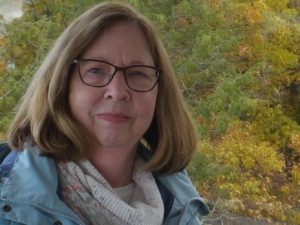 Jean Schreur of Hudsonville, Michigan, enjoys writing about Biblical characters and places. Several poems were published in the recent anthology Adam, Eve, and the Riders of the Apocalypse (Poiema Poetry Series). She is a retired nurse and lives with her husband on the family celery farm.
Jean Schreur of Hudsonville, Michigan, enjoys writing about Biblical characters and places. Several poems were published in the recent anthology Adam, Eve, and the Riders of the Apocalypse (Poiema Poetry Series). She is a retired nurse and lives with her husband on the family celery farm.Posted: 06 February 2019
-
Dirty Jeans on a Kid in Ephesus by Bugg Davis
Dirty Jeans on a Kid in Ephesus
As a college student, did you learn to do laundry
before you left home?As a college student did you realize you’d need
a roll of quarters to get the job done?But quarters are hard to come by, so
jeans are worn two, three, or a pressing four times.And by the fifth, going home is a better option
than walking around smelling like ramenSpilled, stirred with sweat from your pick up
basketball game, where you ripped a holeIn the knee and bled a little. As a college student
did you forget that there are people whoReally do want to help you succeed; who
want to help sew those holes in yourArmor; bandage you;
Feed you some meat and potatoes; andHelp you wash that laundry?
Just show up on Sunday and find out. Bugg Davis is originally from Mississippi where she completed a degree in English with a concentration in Philosophy. She has been published in a number of literary journals in the Southern United States. Recently, she moved to Hamilton, Ontario, to pursue a degree in Business and Marketing and is working as a Barista.
Bugg Davis is originally from Mississippi where she completed a degree in English with a concentration in Philosophy. She has been published in a number of literary journals in the Southern United States. Recently, she moved to Hamilton, Ontario, to pursue a degree in Business and Marketing and is working as a Barista.Posted: 30 January 2019
-
Ephesians 4:30. Grieve Not the Holy Spirit, Etc. by George Herbert
Ephesians 4:30. Grieve Not the Holy Spirit, Etc.
And art thou grieved, sweet and sacred Dove,
—————When I am sour,
—————And cross thy love?
Grieved for me? the God of strength and power
—————Grieved for a worm, which when I tread,
—————I pass away and leave it dead?Then weep mine eyes, the God of love doth grieve:
—————Weep foolish heart,
—————And weeping live:
For death is dry as dust. Yet if ye part,
—————End as the night, whose sable hue
—————Your sins express; melt into dew.When saucy mirth shall knock or call at door,
—————Cry out, Get hence,
—————Or cry no more.
Almighty God doth grieve, he puts on sense:
—————I sin not to my grief alone,
—————But to my God’s too; he doth groan.O take thy lute, and tune it to a strain,
—————Which may with thee
—————All day complain.
There can no discord but in ceasing be.
—————Marbles can weep; and surely strings
—————More bowels have, than such hard things.Lord, I adjudge myself to tears and grief,
—————Ev’n endless tears
—————Without relief.
If a clear spring for me no time forbears,
—————But runs, although I be not dry;
—————I am no Crystal, what shall I?Yet if I wail not still, since still to wail
—————Nature denies;
—————And flesh would fail,
If my deserts were masters of mine eyes:
—————Lord, pardon, for thy son makes good
—————My want of tears with store of blood. George Herbert (1593—1633) is famous for his devotional poetry which was posthumously published in his book The Temple. He served as an Anglican Priest, rector of the small parish of St Andrews Church, Lower Bemerton, Salisbury. In 1632 he also wrote A Priest to the Temple, which expresses his ideals of what a pastor should be.
George Herbert (1593—1633) is famous for his devotional poetry which was posthumously published in his book The Temple. He served as an Anglican Priest, rector of the small parish of St Andrews Church, Lower Bemerton, Salisbury. In 1632 he also wrote A Priest to the Temple, which expresses his ideals of what a pastor should be.Posted: 23 January 2019
-
The Unvoiceable Ever by Laurie Klein
The Unvoiceable Ever
Ephesians 2: 3-7
Mercy, please note
—every ragged corona
——our prayers generate: the lone
—blue eye of a pilot light,
the bonfire crowning a hill.Help us welcome the kindly
—eclipse and crumble of ego,
——knowing the planet of self
—winks out, only
to rally. On again. Off . . .a pulse like the tide,
—prone to turn, the stoic
——glacier, called to calve—
—each tipping point seen, loved,
unvoiceably nudged.Amid the long seam of night
—our desires are rogue stars,
——riddled with black holes,
—laden with dark matter,
still unexplained.O Mercy with colored dust,
—re-belt us, all our hopes
——fixed anew, within your realm
—where nothing is lost,
but all is covered.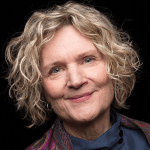 Laurie Klein of Deer Park, Washington, is the author of the poetry collection Where The Sky Opens (2015, Poiema Poetry Series). She calls herself, “a contemplative writer, musician and artist, who helps distracted, heart-weary people refocus on God in creative ways that spark hope and wholeness.”
Laurie Klein of Deer Park, Washington, is the author of the poetry collection Where The Sky Opens (2015, Poiema Poetry Series). She calls herself, “a contemplative writer, musician and artist, who helps distracted, heart-weary people refocus on God in creative ways that spark hope and wholeness.”Posted: 16 January 2019
-
To Do More Than Hide by David Busuttil
To Do More Than Hide
Ephesians 4:24
They
Made coverings of leaves
To sheath the bloody weapons they made of their bodies
The garments hardly holding
To soft skin
Scraped ‘til red
Ashamed of the defiled image they now carried in their carcasses
Unable to cover it
They hide
Their father comes and finds
And covers their skin in skin
And they begin
To be able to do more than hide
Seed of EveSecond Adam
Comes to me while I cower
While naked
Pathetically making insufficient coverings
And he hands me my new self
Made of himself
And I put him on like wedding white
And I am made able
To do more than hide David J. Busuttil lives with his loving wife Katie in Hornby, Ontario. He won the 2017 In The Beginning Award from The Word Guild. His poetry regularly appears in the magazines Love Is Moving and Ekstasis. David is active in poetry performances in the Greater Toronto Area. His original play Within a Play launched at Georgetown Little Theatre in June of 2018.
David J. Busuttil lives with his loving wife Katie in Hornby, Ontario. He won the 2017 In The Beginning Award from The Word Guild. His poetry regularly appears in the magazines Love Is Moving and Ekstasis. David is active in poetry performances in the Greater Toronto Area. His original play Within a Play launched at Georgetown Little Theatre in June of 2018.Posted: 09 January 2019
-
Epistle to the Ostensible Church by Scott Cairns
Epistle to the Ostensible Church
Isaak, latecomer to the way, sometime
schmoozer among the diverse and sundry
heretics, and admittedly a little judge-y,
a little cranky concerning the ubiquitous,
blithe, and widespread ignorance unduly
tolerated among slacker Xians whose glib
disinterest in the actual fullness of their
own inheritance leaves me blinking, open
mouthed—and increasingly cranky—as each
week seems to bring yet another earnest
attempt to reinvent the wheel. I write
to all y’all who labor in your separate
enclaves to puzzle out why your long-pared
faith so seldom satisfies the enormity
of your God-obsessive hunger. Peace.That we are all of us adopted and appallingly
co-opted into the holiness of Jesus is a simple
given, and a certainty. So relax. His good
pleasure will surely accommodate at some
future end of time our patent sloth and habitual
dim wittedness. Meantime, have a stretch.
The faith you hold is not so much a grip
of propositions—nor even, nor especially
that queer array of anxious propositions you
have preferred to what the fathers taught; such
a paring keeps the body blind, and deaf, more
than a little dumb. A far more efficacious grip
would be the one that gathers at the supper
of the Body and the Blood. The cup is not
so much a good idea, but is your living portion
poured into your hungry gut, the animating
spirit joined unto an elemental, and a bright
reconstitution, joining your sad persons
to the joy investing all and everything
with theanthropic agency. Remember
to love one another, and please forgive
your cranky Isaak, whose love for you
may yet prove—please God—incorruptible.Scott Cairns is the author of eight poetry collections, including: Slow Pilgrim: The Collected Poems (2015, Paraclete Press). He is Professor of Poetry and Director of the MFA in Creative Writing at Seattle Pacific University. His poems have appeared in The Atlantic, Poetry, and The McMaster Review of Theology and Ministry.
Posted: 02 January 2019
-
God’s Lavishness by Sandra Duguid
God’s Lavishness
the unexpected snow
clusters weighting
the small evergreen branches
like multiple hands extended, pressed
organ keyboards, Bach Cantatas—
with orchestra, choir, rich-voiced
soloists—a triplesauce on an entrée in a French
restaurant on play-full
Broadway, local bookstores,
cafes, all manner
of things—like melons;
the return of health,
a friend’s assisting
lepers in Uganda, the churches’ gathered
shoe boxes of gifts delivered
to children around the world,
children themselves, parents’ love, the iconic
snow-covered car in the driveway—
and she, of all days, minus a brush—
mysteriously cleaned off,
a day’s dawn,
a birth in dark Bethlehem,
sheep afoot on a hillside, their tangled
wool, Angel voice upon voice,
the soft arrival
of gold, myrrh, and frankincense,
the Christ Child in a makeshift cradle
asleep in his own Bright Nursery—
Grace. Sandra Duguid is the author of Pails Scrubbed Silver (2013, North Star Press). Her poems have also appeared in the recent anthology Adam, Eve, & the Riders of the Apocalypse (Poiema Poetry Series). She and her husband live in New Jersey. This poem is drawn from several passages, including Ephesians 1:7-10.
Sandra Duguid is the author of Pails Scrubbed Silver (2013, North Star Press). Her poems have also appeared in the recent anthology Adam, Eve, & the Riders of the Apocalypse (Poiema Poetry Series). She and her husband live in New Jersey. This poem is drawn from several passages, including Ephesians 1:7-10.Posted: 26 December 2018
-
Daily Grace by Bonnie Beldan-Thomson
Daily Grace
Theologically and philosophically
I rejoice in my salvation. But,
practically speaking,
I am carried
by little salvations
that buffer my bumps
and colour my days…
offer of a lift in driving rain,
patch of shade in smothering sun,
a ticket for Handel’s Messiah, reminder
of a bountiful gift that gives anew,
groceries on sale when I need them,
sunset display, exuberant from my window
is subdued the next street over, my private showing,
the extra dimension of a thin place after
a long time of walking by faith alone,
flat back tire in my driveway, not on the highway,
words of a Celtic prayer make
translucent and malleable
the granite wall of my cave,
comfort of flame
on a bitter winter night.Ears to hear,
eyes to see,
a heart to receive
and give
love. Bonnie Beldan-Thomson of Pickering, Ontario, wrote this poem in response to the opening verses of Ephesians. She is part of Adonai Creative Arts, through Forest Brook Community Church, where she helps facilitate The Writing Room — a place of spiritual care and creativity. She received the E.J. Pratt Medal in Poetry from the University of Toronto.
Bonnie Beldan-Thomson of Pickering, Ontario, wrote this poem in response to the opening verses of Ephesians. She is part of Adonai Creative Arts, through Forest Brook Community Church, where she helps facilitate The Writing Room — a place of spiritual care and creativity. She received the E.J. Pratt Medal in Poetry from the University of Toronto.Posted: 19 December 2018
-
My Father's Place by Vilma Blenman
My Father’s Place
Forgive me if I behave as if I’ve lived
somewhere else, was someone else.
I was
an orphan at the gate, waiting, wondering
until he came and chose this unlikely child
gave me a new name, gave me gifts in profusion:
hope to hold, peace to pass on, grace to grow
See this signature?
It’s his insignia, inheritance guaranteed.So now I live here, where largesse is norm
where rooms open into other rooms,
where colours celebrate shame’s downfall
and hues of blue blanket grey:
indigo, cobalt, azure
reassure,
a palette of reds speaks bold words:
scarlet, crimson, carmine,
all call, “No fear!”Yet, l do confess,
love like this frightens me.
How difficult to fathom its dimensions:
the length, the breath, the depth, the height,
it takes a lifetime to fill a fatherless heart
full,
to displace doubts, to replace the broken seal.
How fortunate that we have forever… Vilma Blenman has published a poetry chapbook First Flight, plus stories and poems in the Canadian Hot Apple Cider anthology series. She lives with her family in Pickering, Ontario. “My Father’s Place” is influenced by Ephesians 3:18, but also Ephesians 1:13 and 14.
Vilma Blenman has published a poetry chapbook First Flight, plus stories and poems in the Canadian Hot Apple Cider anthology series. She lives with her family in Pickering, Ontario. “My Father’s Place” is influenced by Ephesians 3:18, but also Ephesians 1:13 and 14.Posted: 12 December 2018
-
Sundown by Ryan Apple
Sundown
Ephesians 4:26
In pre-marriage counseling they told us to never
let the sun go down on our anger.
Whimsy notwithstanding,the warning seemed quaint
since electricity has deemed our clocks
the arbiters of time,and sailors now watch weather.com,
having jettisoned their nursery rhymes
about red skies.But in the wake of our disagreement,
with the sky so overcast
(I circled the same point;turning, you drifted off),
I just stared into the clouded night, wondering
how we might navigate to common ground. Ryan Apple is a Music Professor at Great Lakes Christian College in Lansing, Michigan — where he and his wife live with their six children. His guitar music is available at: https://itunes.apple.com/us/album/go/606553867. His poetry has appeared in the anthology Adam, Eve, & the Riders of the Apocalypse (2017, Cascade Books).
Ryan Apple is a Music Professor at Great Lakes Christian College in Lansing, Michigan — where he and his wife live with their six children. His guitar music is available at: https://itunes.apple.com/us/album/go/606553867. His poetry has appeared in the anthology Adam, Eve, & the Riders of the Apocalypse (2017, Cascade Books).Posted: 05 December 2018
-
The Architecture of Prayer by Mary Willis
The Architecture of Prayer
I hardly recall now the place, the view:
stars burning light years off
like tongues of fire snapping softly
in a vacant house,
winter branches with their hieroglyphs,
birds clenched on twigs like frozen buds—
all that language of the dispossessed.I know I’d picked up fuzzy suns
of peaches, late glowing apples
and shelved them in my darkest closet—
seasoned proofs, potential food for afterthought?
And long before of course
I hunted out the spring,
stored earliest recorded light,
his words, which I drew on
interceding for family or friends,
but not too often, pulling back
from draining the source
with appeals for anything specific or routine . . .until I stumbled on a promise
hidden there boldly in plain sight:
exceeding abundantly above all that we ask or think.
Extravagantly upsized, straining
our reasonable dimensions of space and time?Not according to the blueprint of the mystery.
Translated by the working hand,
it clearly says our house is,
its foundation laid,
saving us from lostness.
Windows, though yet to be set,
are framed and open for intimate speech,
silent music between ear and Ear. Mary Willis lives in London, Ontario. Her poems have appeared in Canadian Literature and other journals and anthologies. She has also published three chapbooks through Fiddlehead Poetry Books, including: Earth’s Only Light. “The Architecture of Prayer” is built on Ephesians 3:20.
Mary Willis lives in London, Ontario. Her poems have appeared in Canadian Literature and other journals and anthologies. She has also published three chapbooks through Fiddlehead Poetry Books, including: Earth’s Only Light. “The Architecture of Prayer” is built on Ephesians 3:20.Posted: 28 November 2018
-
Sonnet From The Ephesians by Barbara Crooker
Sonnet From The Ephesians
——-Ephesians 1:16
I do not cease to give thanks, especially in November
even as we lose an hour of light, drawing
the curtains at 4:30 to keep out the cold. To remember
you are dust seems appropriate now. Crows are cawingblack elegies in the bare trees. Just past the Day of the Dead,
and I’m thankful for every friend who has blessed
my life, gold coins in a wooden chest. Who said
no man is an island? We’re all peninsulas, I guess,joined to the mainland, part of the shore. We’re the sticks
in the bundle that can’t be broken. Even if
it doesn’t seem that way, the bickering of politics,
the blather on the nightly news. Maybe we speak in hieroglyphs,
unclear, always missing the mark? So let me be plain.
I’m grateful for the days of sun. I’m grateful for the rain. Barbara Crooker is the author of seven poetry collections. Her eighth, The Book of Kells, will appear from the Poiema Poetry Series early in 2019. She and her husband live in Fogelsville, Pennsylvania. Her poems have been featured many times on The Writer’s Almanac as read by Garrison Keillor.
Barbara Crooker is the author of seven poetry collections. Her eighth, The Book of Kells, will appear from the Poiema Poetry Series early in 2019. She and her husband live in Fogelsville, Pennsylvania. Her poems have been featured many times on The Writer’s Almanac as read by Garrison Keillor.Posted: 21 November 2018
-
Adoption by James Tughan
Adoption
Not very many know what it’s like
to be weightless, cut off from a home,
any home of familiar welcoming,
like Cheers, like the court of the Sanhedrin,
like a synagogue in any Roman outpost,
and perhaps even with the brothers of the Way
who cannot let go of the finality
of the dying cries of Stephen.Not many know what it’s like
to be weightless, grasping for a foothold
of decency and grace, in a mosh pit of gods
and goddesses nastily scrambling about
round and round on the circumference
of perhaps a Greek vase, or a sad Roman copy
which can’t really hide the humanness
of engineered bullying from Rome.Not many know what it’s like
to be weightless, hung out in space
hung between heaven and earth, sold out
by friends and foes, orphaned by everything
that fathered you into this world
save perhaps for wounds and a thorn
now woven into certificates of adoption
for children of immeasurable belonging.For Mark
 James Tughan has been called “one of the world’s foremost pastel artists.” He has served on the faculty of Tyndale University, Redeemer University, and Sheridan College. Even so, Tughan has immersed himself in course work at McMaster Divinity College. One of the many influences on his poem “Adoption” is Ephesians 1:5.
James Tughan has been called “one of the world’s foremost pastel artists.” He has served on the faculty of Tyndale University, Redeemer University, and Sheridan College. Even so, Tughan has immersed himself in course work at McMaster Divinity College. One of the many influences on his poem “Adoption” is Ephesians 1:5.Posted: 14 November 2018
-
The Misuse of Scripture by Daniel Klawitter
The Misuse of Scripture
——-So then, putting away falsehood, let all of us speak the
——-truth to our neighbors,
——-for we are members of one another.
——-–Ephesians 4:25The truth is, neighbor, your lawn is looking rather shabby.
(I tell you this in a spirit of Christian kindness.)
And yesterday you seemed a little crabby:
(Love may be blind, but that’s different than blindness.)So, let us shun falsehood and speak the truth:
I see your sins and…Joshua judges Ruth.
I stand firm in faith and shall not be budged.
And if you judge me…ye shall be judged. Daniel Klawitter of Denver, Colorado has published three full-length poetry collections – most recently Quiet Insurrections (2018, White Violet Press). His children’s poetry chapbook Put On Your Silly Pants received an honourable mention in the 2017 Dragonfly Book Awards for Children’s Poetry.
Daniel Klawitter of Denver, Colorado has published three full-length poetry collections – most recently Quiet Insurrections (2018, White Violet Press). His children’s poetry chapbook Put On Your Silly Pants received an honourable mention in the 2017 Dragonfly Book Awards for Children’s Poetry.Posted: 07 November 2018
-
Ephesus by Sarah Klassen
Ephesus
——-To everyone who conquers
——-I will give permission to eat from the tree of life
——-that is in the paradise of God. Rev.2:7.Now as then we are dismayed when business falters,
baffled when rains fail,
alarmed when another riot erupts in our city.Now as then we have among us the hungry. Also
the scrupulous. We have those
who regularly bow and bend and those who don’t.We know a house must have a sure foundation,
a solid cornerstone. We know, though we keep building them,
dividing walls must fall. How elsecan the stranger and the alien enter? We do not know
why the lovely bird of peace nests over there
while here at home the vultures flap their hostile wings.Now as then noise streams from the market place,
applause from the crowded theatre.
The hungry lions roar. On quiet eveningsyou can hear, above the drone of time,
the whisper of leaves
on the tree of life. Sarah Klassen is a Winnipeg-based writer who’s won numerous awards, including The Canadian Authors Association Award for Poetry for her collection A Curious Beatitude. Her eighth and most-recent collection is Monstrance (2012, Turnstone Press). Her poems have appeared in many journals, including The McMaster Journal of Theology & Ministry.
Sarah Klassen is a Winnipeg-based writer who’s won numerous awards, including The Canadian Authors Association Award for Poetry for her collection A Curious Beatitude. Her eighth and most-recent collection is Monstrance (2012, Turnstone Press). Her poems have appeared in many journals, including The McMaster Journal of Theology & Ministry.Posted: 31 October 2018
-
The Ordering of Time by Nicholas Samaras
The Ordering of Time
The road to Ephesus was flat and open-aired,
a lined mixture of blue and earth, mounded cairns
rising from the open fields, like bee-hives a mancould walk into and disappear. And why travel there
but for a heritage of history? Native people still
tilling the biblical earth, airing their laundry on lines,the empty forms of their bodies waving in air.
Land by itself always appears primitive
until we encounter on the threaded paths therea rise of buildings, an ordering of the times
when they are complete. We pilgrimage to Ephesus
to witness the past and measure the present.For a place to sense the saints of perseverance,
we leave our too-civilised countries to experience
a land, a field, a time in its journey. We leave our livesand go to read the earth, to remember any small heritage
of who came before us and who long brought us here.
The dusty road to Ephesus was a boat, a bus,and walking, was blue hours of water and earth,
was winding and tiring, but worth the beautiful ruins,
a true word, a lasting witness, travel the first-fruitof our heritage. In the ancient shell of Ephesus,
beyond the resting amphitheater, the cell of Saint Paul,
the best building standing remains the whitened library. Nicholas Samaras is the author of two poetry collections – Hands of the Saddlemaker, which won the Yale Series of Younger Poets Award, and the extensive American Psalm, World Psalm (2014, Ashland Poetry Press) which contains 150 poems to emulate the Biblical psalms. His poetry also appears in The Turning Aside: The Kingdom Poets Book of Contemporary Christian Poetry. He lives with his family in West Nyack, New York.
Nicholas Samaras is the author of two poetry collections – Hands of the Saddlemaker, which won the Yale Series of Younger Poets Award, and the extensive American Psalm, World Psalm (2014, Ashland Poetry Press) which contains 150 poems to emulate the Biblical psalms. His poetry also appears in The Turning Aside: The Kingdom Poets Book of Contemporary Christian Poetry. He lives with his family in West Nyack, New York.Posted: 24 October 2018
-
He Also Descended by Laurel Eshelman
He Also Descended
On Albrecht Dürer’s woodcut, Christ Descending into Hell, from Ephesians 4
Dürer’s gouge flings gates from hinges,
stretches a lean arm to snap prisoners’ chains.
He tastes pearwood dust,
cuts a body, blood trickled out
and stilled on Skull Hill,
a living man whose standard rides
the blaze from demon horns.We shuffle past the woodcut,
hear a flapping overhead
and smell smoke
but miss the gates
wide open
the throng rushing out. Laurel Eshelman of Elizabeth, Illinois (population 700) works a few blocks from home with her husband at Eshelman Pottery. Her chapbook, The Red Mercy, was a semifinalist in the 2014 Palettes and Quills Chapbook Contest. She was one of the participants in D.S. Martin’s festival circle group at the Festival of Faith & Writing 2018, in Grand Rapids.
Laurel Eshelman of Elizabeth, Illinois (population 700) works a few blocks from home with her husband at Eshelman Pottery. Her chapbook, The Red Mercy, was a semifinalist in the 2014 Palettes and Quills Chapbook Contest. She was one of the participants in D.S. Martin’s festival circle group at the Festival of Faith & Writing 2018, in Grand Rapids.Posted: 17 October 2018
-
Seating Plan by Neil Paul
Seating Plan
first day of school…
———–the bell rings,
thirty children
———–rummage
to find their seats,
determined by the teacher’s
———–seating planthe twinkling of an eye.
the trumpet sounds!and there,
engraved by lightning laser
on a clear white stone,
I find my name
and gladly take my seat
among the galaxies. Neil Paul – of Caledonia, Ontario – is a retired English teacher who has been taking courses at McMaster Divinity College. I met him last year in Gus Konkel’s insightful class on the Psalms. He has self-published two books of verse. This poem was inspired by Ephesians 2:6.
Neil Paul – of Caledonia, Ontario – is a retired English teacher who has been taking courses at McMaster Divinity College. I met him last year in Gus Konkel’s insightful class on the Psalms. He has self-published two books of verse. This poem was inspired by Ephesians 2:6.Posted: 10 October 2018
-
A Prisoner of Christ by Philip C. Kolin
A Prisoner of Christ
for Father Donald Francis Derivaux
A Gethsemane monk, psalming
an honorarium of prayer, work, plainsong,
he interceded for those who fed
on empty words from the kingdom of air.He shared raven’s bread with Merton
and letters brined with tears over
black souls shorn of dignity.
But the sounds of Trappist silence
contained too many echoes for him.He longed for the life away
anchored in the most quiet dwelling–himself—
moment by moment seeking eternity;
he lived alone with the Aloneuntil he was called to be a prisoner of Christ
in a different kind of hermitage
salving souls in cells at Parchman Penitentiary
teaching unschooled monks in striped habits
to sigh the name of Jesus. Philip C. Kolin is the Distinguished Professor of English (Emeritus) at the University of Southern Mississippi. The title of this poem alludes to Paul’s reference to himself as the prisoner of (or for) Christ (Eph. 3:1 and 4:1). This poem will be included in Kolin’s forthcoming poetry collection Reaching Forever (Poiema Poetry Series) which is edited by D.S. Martin.
Philip C. Kolin is the Distinguished Professor of English (Emeritus) at the University of Southern Mississippi. The title of this poem alludes to Paul’s reference to himself as the prisoner of (or for) Christ (Eph. 3:1 and 4:1). This poem will be included in Kolin’s forthcoming poetry collection Reaching Forever (Poiema Poetry Series) which is edited by D.S. Martin.Posted: 03 October 2018
-
Approach With Boldness by Tania Runyan
Approach With Boldness
—Yellowstone National Park
—Eph. 3:12We creak on boardwalks above geothermal pools—
Black Opal, Morning Glory, Emerald Spring.
Clear and bright as cups of Easter dye,
they sputter and hiss to remind us that we stand
atop a caldera heaving molten rock.Each path begins with the illustrated warning:
a boy in a baseball cap breaks through the surface,
parboiling his feet. I hear the story about the 9-year-old
who lost himself in the steam and plunged into Crested Pool.
They recovered just eight pounds of his body.Or the man who swan-dived into Celestine Pool
after a yelping dog, emerging with blanched irises.
That was dumb, he mumbled for his last words,
skin peeling in sheets. Thousands of years ago
the first hunter to wander into this basinmust have thought he discovered a second sky
breaking through the ground, a miracle of sorts,
if he knew about those, radiating in the snow.
He laughed, bent his face over the rising steam,
and thought nothing of reaching in. This poem by Tania Runyan is from her poetry collection Second Sky (2013, Poiema Poetry Series), which is a book of poems inspired by the life and writings of the apostle Paul. Her new collection What Will Soon Take Place (2017, Paraclete Press) is inspired by the Book of Revelation. Her poems are also included in the anthology The Turning Aside: The Kingdom Poets Book of Contemporary Christian Poetry. She and her family live in northern Illinois.
This poem by Tania Runyan is from her poetry collection Second Sky (2013, Poiema Poetry Series), which is a book of poems inspired by the life and writings of the apostle Paul. Her new collection What Will Soon Take Place (2017, Paraclete Press) is inspired by the Book of Revelation. Her poems are also included in the anthology The Turning Aside: The Kingdom Poets Book of Contemporary Christian Poetry. She and her family live in northern Illinois.Posted: 26 September 2018
If you like what you see, and would like to submit a poem of your own to Poems for Ephesians, please contact D.S. Martin, MDC’s Poet-in-Residence: (martid17@mcmaster.ca).


